- Travel Planning Guide

Beyond Safaris: Affordable Travel in Africa
- Travel Budgets
- Country Travel Cost Rankings
- Cheapest Cities
- Country Budget Comparisons
Below you'll find average travel costs by country. You can dig in to each country for specific details about cities in each country, too. We also have costs for hotels, hostels, and tours for Africa.
Average Travel Costs by Country
Choosing an itinerary, planning your travel expenses, activities and highlights, cheap african destinations, buses, trains, or taxis.

Subscribe to our Newsletter
Coupons and discounts! Travel tips!
- Privacy / Terms of Use
- Activities, Day Trips, Things To Do, and Excursions
Africa Trip Cost: Pricing for Flights, Food & Accommodation
Plan your Africa trip with ease! Learn the real costs for flights, accommodation, and food, plus tips to save money. Ideal for savvy travelers aiming for Africa.

From the tropical beaches of Zanzibar to the medieval cities of Marrakesh, Africa has over 3000 tribes with different languages, traditions, and cultures. Many people who journey to Africa are often surprised to see more than just wildlife and Safaris. One question people often ask before packing their bags for Africa is, "what does a trip to Africa cost?"
The average cost of a 2-week trip to Africa per person is between $5000-$7500, including your round trip airfares. $560-$2035 will cover accommodation, $350-$1000 for both local and intercity transportation, and $560 for food. It also includes $2407 for Safaris and tours, $60-$100 for visa fees, $500 for vaccinations, and $590 for excursions and add-ons.
Africa is large and expensive, but the beauty is well worth it. The rest of the article will detail each cost and provide tips to save money on your journey.
How Much Money Should You Take for A 2-Week Trip To Africa?

When traveling to Africa, you will be visiting more than one country. The right amount of money to take with you on a 2-week journey to Africa is between $5000-$7500. This budget includes $1337 for flight tickets into Africa and $1000 for flight fares between African cities .
Before going to Africa, you would have to spend $400-$500 on vaccinations and medicines. African countries require visas before entry, costing about $60-$80 per country. There are fewer flights to Africa, and airfares have an average fee of $1337
The lack of sufficient infrastructure in many places increases accommodation and transportation costs. It would be best if you had an average of $560-$2035 to cover accommodation and $250-$350 for transportation for two weeks.
Meal fees, especially if you only eat western food, are also on the high side at $560 for two weeks. The tours and attractions that make Africa a tourist delight are costly. The average safari tour and parks cost $2407 per day; however, this fee also covers food and accommodation. Independent excursions and add-ons cost an average of $571.
Traveling To Africa On A Tight Budget

The majority of people living on the continent survive on a few dollars per day. Hence it will not be challenging to travel to Africa on a tight budget, provided you make some adjustments. This budget is especially useful for those that will be traveling independently.
Some months are cheaper than others when it comes to flight fares. The cheapest month to fly when traveling to Africa is February, with Flight fares averaging $800. Some people have also found flights to Africa for as low as $590 .
The average safari cost on a tight budget is $800, with some adjustments. Start by negotiating the price with your guides, choosing a cheaper safari site, and going with a group.
Visa fees are non-negotiable at $50-$100 for one visa. Remember to check the exact costs prior to arrival to avoid scams from the border officials.
Accommodation is expensive in Africa, but you can get hotels for $12 per night outside the city center. Many hotels or parks will allow you to camp and take advantage of their facilities for $10-$15. You can survive on a food budget of $80-$100 per month if you eat local food and cook for yourself.
Popular dishes include rice, beans, potatoes, eggs, chicken, stews, and seafood. Vaccines and medications are non-negotiable and cost between $400-$500, but can last many years.
Related Read: Best Time to Visit Tanzania
Basic Expenses On A Vacation To Africa
Before embarking on your journey to Africa, you need a detailed breakdown of the cost considerations. This breakdown will help you make an accurate budget plan for any surprises . Some of the factors contributing to your total budget include:
1. Flight Tickets

KOAirfares to Africa are notoriously expensive and will take a considerable chunk of your budget. Flight Tickets depend on factors such as the number of countries you plan to visit and the time of year. The airfares to Africa are expensive because there are fewer travelers; hence airlines charge more.
The average airfare for a round trip to Africa costs between $1200-$2000. This fee can rise significantly or reduce, depending on your location. Even flight fares between African cities can be expensive, costing between $200-$300 .
Most flights to Africa are cheaper from Europe and the Middle East, with an average fare between $500-$1000. However, flights originating outside the EME regions will likely have layovers and cost more.
2. Visa Fees

Most African countries require a visa, and the cost depends on your nationality. The average visa fees cost between $60-$100 per country . And since you will probably be visiting a few countries on the continent, these visa fees would compound.
The visas are usually available at the border and typically last for 30-90 days for a single entry into one country. However, do your research to know which visas are available at the border and which are not. Most border officials require you to pay in dollars and only accept large currency bills such as 20 or 50-dollar bills.
Related Read: Best Time To Visit Ghana
3. Accommodation

Accommodation in Africa is expensive, and it is not easy to find good quality rooms. Africa has a range of accommodation that caters to different styles, such as backpacker hostels, safari lodges, and hotels.
The prices for each accommodation style depend on the city, length of stay, and the time of visit. Basic hotels in small villages and rural areas cost between $2-$10 per night .
These hotels usually have a small room with a bed, table, and chair. You often have to share a bathroom with other hotel guests without running water.
Standard budget hotels across Africa cost an average of $20-$40 per night. They typically include a private room with a bathroom, bed, hot and cold water, and sometimes a TV. The high-end hotels in larger cities and tourist locations have an average price of $150.
Safari lodges typically offer suitable quality accommodation, but this comes at a higher price. The average cost of Safari lodges across Africa is between $600-$2000 per person per night, and it involves sharing.
Camping in Africa can be expensive, even when traveling with your gear. Some hotels will allow you to camp in their compound and access their facilities from $10-$40. Most campgrounds charge $10-$25, and a Safari lodge will charge you a whooping $100 just to camp.
4. Transportation

Even though the transportation cost varies depending on the African country, it is still relatively expensive. Both local and intercity transportation will eat deep into your pockets. Africa is a large continent, and traveling from one destination takes days.
Public transportation in Africa involves rundown buses that are slow, inconsistent, and crowded. The average cost for a bus ride within a city is $1-$2 and $20-$40 between cities. Buses only move from one designated point to another and will not go to tourist spots or hotel doorsteps.
Shared taxis are also how locals move around, but it is significantly better than public transportation. An average of $0.5-$1.50 for a one-hour taxi ride. Taxis have a fixed route, and you will usually have to move from one cab to another if traveling long distances.
Coaches are the preferred means of transportation for longer journeys because the prices are set, and it's safer and more comfortable. It costs an average of $1.50-$2 per hour to move around .
Car rental services are available at an average cost of $40-$50 per day, depending on the type of car. You will also have to factor in the average fuel cost of $0.5-$1 per liter.
Others involve $1-$2 trains which travel through limited routes, are unpredictable, and often have maintenance breakdowns. Ubers are popular in cities and have an average cost of $3-$5.
Related Read: Best Time to Visit Cape Town

African meals mostly rely on maize for breakfast, lunch, and dinner, and it is expensive to get western food. However, many dishes have meat and chicken, and a wide variety involves seafood.
The average breakfast cost is $5-$8 and $7-$12 for lunch and dinner, respectively. However, western meals are more expensive, with an average cost of $15 for spaghetti, pizza, burgers, and fries .
Africa is hot, and you will need to drink a lot of water; however, public water is unsafe. You will need to budget an average of $0.5-$1 for one liter of drinking water. Beer is a popular alcoholic drink and costs $1-$1.50 per bottle.
6. Activities

Africa has many attractions, including safaris, parks, mountain climbing, and beach resorts. However, the price is steep, and you will have to budget fees paid for day tours, museums, and sightseeing.
Safaris are a spotting adventure that captures the African experience. The average cost of a Safari is between $400-$1500 per day, and this includes lodging, feeding, and tours. Most travel agencies offer a complete package that covers flight fares.
Parks also offer an affordable wildlife experience compared to Safari. The average park fee is $75-$100, and it can get as low as $8-$25. Or you could visit Africa's beautiful lakes and falls, such as Victoria's falls, for $20 .
Africa has majestic mountains and dunes for adventure thrill seekers. You can climb some of the largest dunes on earth in Namibia for $300-$400. Or climb Mount Kilimanjaro , Africa's highest peak, at an average cost of $1400 to $2500.
Related Read: Best Time to Visit South Africa
7. Vaccinations & Medications

When traveling through Africa, some vaccines are required, and some are recommended. Regular clinics do not stock some of these vaccines, instead visit a travel clinic, preferably the government-owned clinics.
The CDC recommends yellow fever, typhoid, hepatitis A&B, Rabies, measles, mumps, rubella, influenza, and malaria medications or vaccines. The average cost ranges from $70 to $350 each vaccine per person .
8. Travel Insurance And Other Miscellaneous Items

There are unpredictable travel risks you have to consider when traveling to Africa. Your bus can break down, resulting in a missed flight, or you may fall ill with malaria resulting in hospitalization.
Compare different insurance offers and pick the one that covers all options. Other Miscellaneous items you have to budget include tips, mosquito nets, water purifiers, and camping gea r.
Tips To Save Money While Traveling To Africa
Africa is a beautiful destination with its wildlife, nature parks, mountains, and lakes . Your journey to Africa can become a money pit if a considerable effort is not involved. Here are some tips to help you save money while getting the best African experience.
1. Don't Book in Advance

It may seem counterintuitive compared to other locations, but booking tours or accommodation in advance is not advisable. You can usually get a cheaper deal in person compared to booking online. Do your research and remember that Africans are willing to negotiate prices with you .
Tour guides will approach you at different rates; some will be cheaper than online. Some accommodations do not check online reservations and are rarely filled up; you will get a more affordable deal.
2. Travel in A Group

The best vacations are those you can share the same experiences with friends and family. Traveling with a group will always lower your cost significantly, considering you will be splitting the bills.
Accommodation in Africa is costly, and a group journey will lower the cost significantly. Negotiate lower tour prices as a group or create your tour by hiring cheaper guides and a car .
3. Save Money On Activities & Attractions

You will probably be going to different African countries requiring visas. Getting an East Africa visa allows you into Kenya, Uganda, and Rwanda instead of individual permits for each country .
It is okay to prioritize some activities over others. Plan your trip so you don't have to enter a country twice and pay visa fees for each entry. You can save some money by checking out tribal dances for entertainment.
4. Save Money On Flight Tickets

Flights to Africa are expensive because of the limited number of airlines. You can save money by flying to a European or Middle Eastern country and flying to Africa from there.
For example, take a flight from the United States to London, Paris, Istanbul, or Dubai. You can get a cheaper flight into a major African city such as Johannesburg, Cairo, Dakar, or Addis Ababa to start your journey .
5. Consider Getting Your Vaccines in Africa

Because Africans usually fall sick from these illnesses, the medications and vaccines are often cheaper. Consider getting your Yellow fever vaccine at a more affordable rate in Africa instead of $150 in the United States.
Remember to research which countries provide vaccinations at the border before traveling . You don't want to end up putting yourself in a awkward situation when you arrive.
73 Basic Dutch Phrases for Your Next Trip to Netherlands 🇳🇱
Learn essential Dutch phrases for a smooth trip to the Netherlands. Perfect for travelers looking to connect with locals and enrich their experience.
Win a $500 Flight!
Embark on the adventure of a lifetime! Enter our Dream Journey Sweepstakes for a chance to win a $500 travel voucher, redeemable with any major US airline. Whether it's sandy beaches, bustling cities, or tranquil mountains, your dream destination is just an email away!*

Is South African Airways Safe? Discover the Truth Behind Their Safety Record
When you're planning a trip, safety is always at the forefront of your mind, especially when it comes to choosing an airline. You might be wondering, "Is South African Airways safe?" It's a valid question, given the mixed bag of news we often hear about airline safety globally.

Uncover Hidden Gems: Best Places to Visit in September for a Perfect Escape
September's the sweet spot for travel. It's when the summer crowds thin out, but the weather's still nice. You get the best of both worlds: fewer people and great days to explore. Imagine walking through a city or hiking a trail without bumping into tons of tourists. Sounds awesome, right?

June Jewels: Top Unexpected Destinations & Tips for Your Summer Escape
June's the perfect time to pack your bags and hit the road. Why? Well, schools are out, the weather's great, and there are tons of cool spots begging for a visit. Whether you're into sunny beaches, quiet mountains, or bustling cities, there's something out there for you.

December Delights: Top African Destinations for Festive Vibes & Sunshine
December's here, and you're probably thinking, "Where should I go?" Well, Africa's got some cool spots that are perfect this time of year. It's warm, welcoming, and packed with places you've gotta see.

November Gems: Top African Spots for Unique Festivals & Adventures
November is a magical time to explore Africa. The weather's great, not too hot or too rainy, just perfect for adventure. It's like the continent rolls out the red carpet for visitors, showing off its stunning landscapes, wildlife, and beaches.

Explore Sahara in September: Africa's Best Secret Destination
September's the perfect time to explore Africa. It's when the weather's just right—not too hot, not too cold. Imagine seeing wild animals up close or walking on beautiful beaches without worrying about getting too sweaty or rained on.

August Adventures: Top African Destinations to Explore Before the Rush
August is a magical time to explore Africa. You've probably heard how huge and diverse it is, right? Well, that means there's a ton of cool places to check out, especially when the weather's just right in August. From wildlife safaris to beautiful beaches, Africa's got it all.

June Gems: Uncover Africa's Best Places to Visit in June
June's the perfect time to explore Africa, with its clear skies and cool vibes. It's when you'll find the best mix of adventure and chill spots, making it hard to choose where to go first.

May Marvels: Essaouira & Africa's Best Spots to Visit
May's the perfect time to explore Africa's stunning spots, where the weather's just right—not too hot, not too cold. Imagine waking up to the sound of waves or wild animals, far from your everyday life. Sounds cool, right?

April in Africa: Why Marrakech is a Must-Visit Gem
April's the perfect time to explore Africa. It's when the weather's just right - not too hot, not too cold. You're probably wondering where to go, right? Well, you're in luck because Africa's packed with cool spots to check out during this month.

March Marvels: Top Spots to Explore in Africa - Table Mountain Awaits
Imagine stepping into a world where every corner holds a new adventure. That's what you'll find in March in Africa. It's the perfect time to explore, with the weather just right for both beach days and mountain hikes.

Marrakech Magic: The Top African Getaway in January
January's the perfect time to explore Africa. It's when the weather's just right - not too hot, not too cold. You're probably thinking, "But where should I go?" Well, you're in luck! Africa's got some amazing spots that are perfect for a January getaway.

October Gems: Discover Africa's Best Visits, from Maasai Mara & Beyond
October's the perfect time to explore Africa. It's when the weather's just right – not too hot, not too cold. And guess what? It's also when you can see some of the coolest places without bumping into too many tourists.

July Gems: Top African Spots for Serengeti Safaris & Cape Town Chills
Thinking about a trip in July? Africa's got some cool spots that are perfect for this time of year. It's not just about the wildlife, though that's a big plus. There's also amazing beaches, mountains, and cities to explore.

Find February's Hidden Gem in Africa: Discover Zanzibar's Magic
February is a cool month to explore Africa. It's when the weather is just right, not too hot and not too cold, making it perfect for adventures. Imagine yourself walking through vibrant markets, seeing wild animals up close, or relaxing on sunny beaches.

Ultimate Guide: Top Places to Live in Africa for Every Demographic - Discover Your Perfect Spot
Thinking about making a big move to Africa? You're in for a treat! Africa's got some of the most vibrant, culturally rich, and scenic places you could call home. From bustling cities to tranquil seaside towns, there's a spot for every taste and lifestyle.

Ultimate Guide to Africa's Best Living Spots: Perfect for Retirees, Families & Young Adults
Thinking about packing your bags for a life-changing move? Africa might just be the place you're looking for! With its breathtaking landscapes, rich cultures, and rapidly growing cities, it's no wonder more and more people are calling it home.

Cape Town Safety: Am I Safe to Travel to Cape Town, South Africa in 2024?
Planning a trip to Cape Town? While it's known for beautiful landscapes and culture, safety is key due to its urban safety concerns.

Am I Safe to Travel to Johannesburg, South Africa in 2024?
Jozi, known for its vibrant culture and history, offers dynamic urban life. Yet, safety concerns due to its complex reputation are valid for visitors and potential residents.

Best Time to Visit South Africa (for Great Climate & Wildlife)
Find the optimal time for climate & wildlife in South Africa. Learn when to enjoy surfing, wildlife, wine season & avoid crowds for a perfect trip.
You may also like...

Best Time to Visit Lithuania for Seasonal Adventures & Local Festivals
Planning a trip to Lithuania and wondering when's the best time to go? You're in the right place. Lithuania, with its stunning landscapes and rich history, offers a unique experience no matter the season. But, if you're looking to make the most of your visit, timing is key.

Best Time to Visit Hungary: Seasonal Secrets for an Authentic Experience
Deciding when to visit Hungary can be tricky, but don't worry, we've got you covered. This beautiful country shines in every season, but knowing the best time to go can make your trip even more special.

Best Time to Visit Estonia: Discover a Winter Wonderland Like a Local
Deciding when to visit Estonia? You're in for a treat, no matter the season. But if you're looking for the best experience, timing is key. This Baltic gem offers something unique with each season, from white winters to sunny summers.

Best Time to Visit Armenia: Winter Wonderland & Cultural Fests Unveiled
Deciding when to visit Armenia? You're in for a treat! This hidden gem has got it all - from cool, snowy winters to warm, sunny summers. But to get the best out of your trip, timing is key. Let's dive into when's the perfect moment to pack your bags for Armenia.

Best Time to Visit Havana: Seasonal Guide for Cultural Festivities
Planning your dream trip to Havana? You're probably wondering when's the best time to pack your bags and go. Well, you're in luck because we've got the inside scoop to help you make the perfect choice.

Best Time to Visit Oaxaca: Uncover Seasonal Secrets & Local Celebrations
Deciding when to visit Oaxaca? It's all about finding the perfect balance. You want great weather, fewer crowds, and lots to do, right? Well, you're in luck because Oaxaca has got it all, but timing is key.
The travel site inspired by travelers and locals alike. Find amazing destinations, unique trip ideas, the best hotels, and most comfortable resorts.
Africa Travel Guide – Tourism, News and More
How much does it cost to travel around africa an expert’s guide to affordable and sustainable experiences.
Africa is a continent known for its diverse landscapes, rich cultural heritage, and incredible wildlife. For many travelers, exploring Africa is a dream come true. However, one common concern that arises when planning such a trip is the cost. In this expert’s guide, we will provide you with valuable insights on how much it really costs to travel around Africa and offer tips on how to make your experiences affordable and sustainable.
Understanding the Cost Factors
Before diving into specific cost breakdowns, it is important to understand the factors that can influence your overall expenses while traveling around Africa.
1. Duration of Travel
The length of your trip plays a significant role in determining your expenses. Keep in mind that the longer you stay, the more you are likely to spend on accommodation, transportation, and other travel-related costs.
2. Destinations and Activities
Africa is a vast continent with numerous countries and an array of activities to choose from. Some countries may be more expensive to visit than others, and certain activities like safaris or gorilla trekking might come with additional costs. Research and prioritize your preferred destinations and activities to estimate their impact on your budget.
3. Accommodation
Accommodation options in Africa range from budget-friendly hostels to luxury lodges. Camping is also a popular and affordable choice in many areas. Consider your comfort preferences and allocate a suitable budget for accommodations accordingly.
4. Transportation
Transportation costs can vary significantly depending on your mode of travel, distance, and region. Flights between countries or remote areas tend to be more expensive, while local buses and trains offer more budget-friendly options. Plan your itinerary wisely to minimize transportation expenses.
5. Food and Drinks
The cost of food and drinks can vary greatly across Africa. Eating at local restaurants and street stalls is generally more affordable than dining at upscale establishments. Embrace the local cuisine and savor traditional dishes to make the most of your budget.
6. Visa and Entry Fees
Each African country has its own visa requirements and entry fees. Some countries offer visa-free or visa-on-arrival options, while others may require pre-arranged visas. Research the visa policies of your desired destinations and include these costs in your budget calculations.
Cost Breakdown by Region
To give you a better understanding of the cost variations across Africa, let’s explore the estimated expenses for different regions.
1. Southern Africa
Southern Africa, including countries like South Africa, Namibia, Botswana, and Zimbabwe, offers a diverse range of natural wonders and wildlife experiences. On average, a daily budget of $50-100 can cover accommodation, food, transportation, and activities in this region.
2. East Africa
Home to iconic destinations such as Kenya, Tanzania, Uganda, and Rwanda, East Africa is renowned for its wildlife safaris and breathtaking landscapes. A daily budget of $80-150 is recommended to cover accommodation, food, transportation, and park fees in this region.
3. West Africa
West Africa, comprising countries like Ghana, Senegal, Nigeria, and Ivory Coast, offers a unique blend of vibrant cultures, historical sites, and beautiful beaches. A daily budget of $40-80 is typically sufficient to cover accommodation, food, transportation, and local attractions in this region.
4. North Africa
North Africa, encompassing countries like Morocco, Egypt, Tunisia, and Algeria, showcases a fascinating mix of ancient civilizations and modern cities. With a daily budget of $50-100, you can comfortably cover accommodation, food, transportation, and entrance fees to attractions in this region.
Tips for Affordable and Sustainable Experiences
Now that we have discussed the cost breakdown by region, let’s explore some tips to make your African adventures more affordable and sustainable.
Travel during the shoulder seasons : Consider traveling during the shoulder seasons, which are the periods just before and after peak tourist seasons. Accommodation and flight prices tend to be lower during these times, allowing you to save money while still enjoying favorable weather conditions.
Opt for budget accommodations : Instead of splurging on luxury hotels, consider staying in budget-friendly accommodations such as guesthouses, hostels, or campsites. This not only saves you money but also supports local businesses.
Use public transportation : Whenever possible, utilize public transportation like buses or trains. They are often more cost-effective than taxis or private transfers and offer a chance to interact with locals and experience the culture firsthand.
Eat local : Explore local markets and street food stalls to sample authentic African cuisine at affordable prices. Not only will you save money, but you’ll also support local vendors and experience the diverse flavors of the continent.
Engage in sustainable tourism practices : Respect the environment and local communities by choosing eco-friendly activities and accommodations. Take part in responsible wildlife encounters and support conservation efforts to ensure the preservation of Africa’s natural wonders for future generations.
In conclusion, traveling around Africa can be an affordable and sustainable adventure if planned carefully. By understanding the cost factors, allocating budgets for different regions, and implementing cost-saving measures, you can embark on a memorable journey while respecting the local culture and environment. Bon voyage!
Note: This article is provided in markdown format as requested.
1. What factors determine the cost of traveling around Africa?
The cost of traveling around Africa is influenced by various factors, including the duration of your trip, the destinations and activities you choose, the type of accommodation you prefer, transportation options, food and drink expenses, and visa and entry fees.
2. How does the duration of travel affect expenses?
The longer you stay in Africa, the more you are likely to spend on accommodation, transportation, and other travel-related costs. Therefore, the duration of your trip plays a significant role in determining your overall expenses.
3. Are certain destinations and activities more expensive than others?
Yes, some countries in Africa may be more expensive to visit than others. Additionally, certain activities like safaris or gorilla trekking might come with additional costs. It is recommended to research and prioritize your preferred destinations and activities to estimate their impact on your budget.
4. What are the accommodation options in Africa?
Africa offers a range of accommodation options, from budget-friendly hostels to luxury lodges. Camping is also a popular and affordable choice in many areas. It is important to consider your comfort preferences and allocate a suitable budget for accommodations accordingly.
Leave a Reply Cancel reply
Your email address will not be published. Required fields are marked *
Save my name, email, and website in this browser for the next time I comment.

The complete guide to travel in Africa: Africa in a (kola) nut shell
Last updated July 6th, 2023.
This complete guide to travel in Africa may contain affiliate links. At no cost to you, they allow me to provide these free and, even if I do say so myself, expert guides based on almost two years of travel in Africa.

What you’ll find in this complete guide to travel in Africa
This guide is intended to become your complete Africa travel guide. Specifics aside it will work equally well for other parts of the world. I’ve divided it into the following easily digestable chunks, but if you think I’ve missed anything, please do let me know !
Is Africa safe to visit? · Why travel in Africa? · The best way to support conservation · Travelling to Africa post-Coronavirus · What to Expect from Travel in Africa During and After Covid-19 · What is Africa like to visit? · Best places to visit in Africa · Africa travel highlights · When is the best time to travel to Africa? · Planning a trip to Africa · How to plan a trip to Africa · How long to spend travelling in Africa? · Suggested Africa itineraries by region · Where to travel in North Africa · Where to travel in East Africa · Where to travel in southern Africa · Where to travel in West Africa · Cost of travelling in Africa · Daily budget for travelling in Africa · Do you tip in Africa? · Getting visas for travel in Africa · Getting visas while travelling in Africa · Africa travel packing list · Must-have items for African travel · Africa travel immunisation requirements · How to avoid malaria in Africa · Preventing mosquito bites in Africa · Medical and travel insurance for Africa · On the ground in Africa · How to travel to Africa by air · How to get to Africa by land and sea · How to take money to Africa · Taking cash to Africa · Can you use credit cards in Africa? · Making the most of your time while travelling in Africa · Accommodation in Africa · How to travel in Africa · Is public transport safe in Africa? · How to stay safe in Africa · Staying healthy in Africa · How to avoid food poisoning in Africa · How to travel sustainably in Africa · Why tourism matters · Travelling responsibly in Africa · What languages are spoken in Africa? · How to stay connected in Africa · How to deal with corruption and requests for bribes in Africa · General photography rules for Africa · Africa’s top foods and drinks to look out for · Gay rights in Africa · Is Africa safe for gay travellers? · Interacting with locals in Africa · Travelling in Africa with disabilities · Women travellers in Africa · Travelling with children · Solo travel in Africa · Staying up to date · Travel Africa your way ·

Is Africa safe to visit?
If you’re new to the continent, you might be asking why travel to Africa at all? Isn’t it dangerous to travel to Africa? Isn’t the whole place just war, famine and poverty? If this is you, you really need to check out some Africa travel websites (especially this one). You’ll soon see what you’re missing, from elephant encounters to epic beach escapes.
Dispelling such myths is one of the joys of my job as a travel writer specialising in African destinations. Africa does have – generally easy to avoid – trouble spots. As does every continent on Earth. And it does have issues with corruption and government overreach, like many other parts of the world too.
However, these factors are rarely an issue for tourists to Africa, and things are getting better every day. Most nations are peaceful fledgling democracies with rapidly growing economies and fast-improving infrastructures.
It’s the continent’s difficulties that fill the headlines. Delve a little deeper, and in Africa you’ll find some of the world’s top travel experiences.
Why travel in Africa?
As well as 145 (and counting) UNESCO World Heritage Sites in Africa, you’ll find the only remaining Wonder of the Ancient World – the Great Pyramid of Giza. To its west lies the ruins of Leptis Magna and Carthage, and the imperial cities of Morocco.
Turn south across the Atlas Mountains and legendary cities such as Timbuctoo await. Important trading posts since time immemorial, camel caravans wind through the sands of the Sahara Desert to the Atlantic Ocean. Here, west African ports act as reminders to the horror of the transatlantic slave trade.
Further south still, and the rainforests of central Africa provide vital habitats to the world’s last remaining populations of mandrill, chimpanzee, bonobo, gorilla , and forest elephant, before halting at the Great Rift Valley.
Then the vast plains of east Africa take over. Big Five encounters can be enjoye in some of the globe’s most famous national parks – Tsavo, Selous and the Serengeti among them. The latter is the place to witness the Great Wildebeest Migration alongside Kenya’s Maasai Mara.
Overlooking them are Africa’s highest peaks, Mounts Kilimanjaro and Kenya. Then come the exquisite beaches of the Indian Ocean, studded with islands and incredible diving opportunities .
They stretch all the way to southern Africa. Its wonders are as varied as Victoria Falls, Kruger National Park and Cape Town’s Table Mountain .
Why travel to Africa, indeed!
The best way to support conservation
Wonders aside, travelling to Africa is a great way to actively support conservation.
It costs not-for-profit organisation Africa Parks around £730 ($1000) to protect each square kilometre of land they are responsible for. It can cost double that for each square kilometre of unfenced land inhabited by lions .
Without visitors, the main source of this revenue would disappear. Governments already struggling with basic facilities would be unable to cover the shortfall.
Travelling to Africa post-Coronavirus
In February 2022 Botswana was the first country in Africa to remove all coronavirus restrictions. Almost all other countries followed in the next 12 months. This covid-19 regulations map has a country-by-country guide to what restrictions remain.
Anyone travelling to Africa during coronavirus would have understood the necessity of having excellent travel insurance .
Now we’ve returned to near-normal, travel insurance is just as important. It should cover you for medical treatment including evacuation home, as well as loss of baggage through theft.
What to Expect from Travel in Africa During and After Covid-19
Based on my 2022 travels, it’s mostly good news. Museums, attractions, tours and safaris are almost all back up and running.
Times and dates may have changed, and some outfits may have disappeared, but you’ll still get to do what you want to. A little more pre-planning that pre-covid is advised while tourist numbers remain relatively low. In other words, don’t turn up and expect a safari to be operating the next day.
Lodges and hotels are back welcoming guests as if nothing has ever happened. However, places aimed at the backpacker market seem to have faired badly, and many have been forced to close permanently due to economic circumstances. Guidebooks are therefore out of date, and are likely to remain so for some time.
Many places to stay (at least in southern Africa) don’t have a reception that’s manned constantly. They expect you to call them up either with an arrival time or to let them know you’re waiting outside.
If, like me, you don’t travel with a local SIM, the local tourist office can help you out.
Even small towns in southern Africa have tourist offices. Some are excellent, others are not. One told me there was no transport where I wanted to go when there was. They then sent me to a guesthouse that had shut down three years before – the only one in town.
Opening times vary, but a good gauge would be 8.30 am until mid-afternoon Monday to Friday. Many open in the morning on Saturdays, Sundays and public holidays too.
Road transport in particular is back up and running as normal. Train services seem to have been seriously cut back, and airlines are still rebuilding their schedules.
Some domestic and international flights may therefore no longer operate. Some specific (usually lesser-used) border posts may also remain closed for the time being – most are open.
What is Africa like to visit?
If you’ve never travelled to Africa, it can be difficult to know what to expect. For one thing, Africa travel magazines and wildlife documentaries tend to focus on the continent’s wild spaces.
But Africa forms a complex web of landscapes which include some of the world’s largest cities (Cairo, Kinshasa, and Lagos). The continent is, after all, home to around 1.1 billion people.
There are tower blocks, and surfaced roads, and hospitals, and traffic jams, and electricity. And everything else – good and bad – which will remind you of home.
If you want a Mars Bar, you’ll find one. Lions don’t wander the streets of Nairobi (unless they’ve made a break from the city’s national park).
Perhaps the first thing to note though, as mentioned in my idiot’s guide to Africa , is that the continent is massive. It’s truly immense.
For the most part, Africa’s iconic animal species live in the continent’s interior, south of the Sahara Desert.
Few major national parks lie on the coast. This type of landscape is what you’ll see if you travel to Africa on safari.
By contrast, the majority of Africa’s people live on its coasts. This is where you’ll also find much of the continent’s colonial history. This includes the forts of Ghana on the Atlantic and a navigation pillar erected by Vasco da Gama on Kenya’s Indian Ocean coastline, by way of the ancient Roman colonies of North Africa.
Best places to visit in Africa
Africa is too large to tackle in one go, short of tackling the Cape to Cairo route when travelling to Africa on a gap year. You’ve hopefully got some Africa travel ideas from what I’ve already written in this guide.
One of my top Africa travel tips is to confine yourself to a single country, region, or theme. The decision on what part of Africa to visit will largely depend on what you want to see and do.
As just some examples, you could sail down the Nile exploring Egypt’s rich past, dedicate yourself to wildlife viewing in east Africa’s national parks, or discover the desert towns of the Sahara.
To help, there are plenty of guides out there. Try to use expert travel guides whether online or in print, with authors (like me) who have a clear knowledge of the continent.
There’s also plenty of inspiration from long form Africa travel books, not least my own words in completing the first solo and unassisted circumnavigation of the continent or returning to north Africa in the footsteps of my great uncle.
Africa travel highlights
The Nile valley is unmatched when it comes to the treasures of the ancient Egyptians.
Those wanting a traditional safari experience have the choice between east and southern Africa. Both also provide extraordinary beach getaways.
West Africa is ideal for anyone interested in cultural traditions and tribal bonds. It also harbours relics from the dark past of the transatlantic slave trade.
Linking them all is central Africa, a region of rainforest and isolated communities, lakes, rivers and endless birdwatching opportunities, and gorilla trekking expeditions.
What part of Africa is best to visit is therefore an impossible question to answer!
When is the best time to travel to Africa?
There are two ways to think about the best time to travel to Africa. The first is to find the best time to visit the region you’re interested in travelling to.
The best time usually corresponds with the best weather conditions for holidaying. But it may also include major regional events, such as the timings of the coolest festivals in Africa .
The downside is these are generally also the most popular periods of year, with peak hotel and flight costs.
The second is to ask the equivalent of ‘is October a good time to visit South Africa’. (You can find the answer to this question in my guide to the best time to visit South Africa .)
This is a good way of looking at possible destinations if you’re limited in the months you can travel by work or study. There’s really no point getting excited about December or January Africa travel destinations if you can only head off in August.
At the same time, watch out for movable cultural feasts, in particular the Muslim fasting month of Ramadan. Ramadan provides a fascinating insight into Africa’s Muslim communities.
But it often affects the opening times of museums and restaurants, and the availability of guides and transport too.
My thoughts on whether it’s okay to travel during Ramadan covers this in more detail.
Planning a trip to Africa

How to plan a trip to Africa
The easiest way to plan a trip to Africa is by booking one of the multitude of fully organised Africa travel packages available.
Make sure you choose a company with a good reputation. Any extra cost will be well worth it for a smooth-running holiday.
Guidebooks usually have recommendations of companies their writers have used themselves. I’m a big fan of Bradt guides . I think they cover Africa better than anyone else.
Often, they are the only English-language guides dedicated to a country in any case. Keep a special eye out for those written by Philip Briggs and Lizzie Williams . Their knowledge and level of detail are astounding.
The upside of any organised Africa travel itinerary is that it’s sure to include as many Africa travel bucket list destinations as possible. You can therefore be sure you’re not going to accidentally miss a major attraction or event.
The downside is the lack of freedom to explore how you might wish too.
Companies including Dragoman provide guide-led group tours on overland trucks that often take in multiple countries.
They can be a good option for those who might otherwise be fearful of travelling in Africa solo, but don’t have the budget for a private tour.
Travelling independently gives you more opportunity to go off path in Africa. It can often be cheaper too, which is why I first started travelling this way myself.
If you do travel independently in Africa, you’re still sure to gain a huge amount from your trip, wherever it may be and whatever you do.
At the same time, you’ll need to be a little more flexible with your plans then you might be elsewhere in the world.
Trains frequently run late, for instance, while crossing from one country to another can take anywhere from five minutes to six hours…
How long to spend travelling in Africa?
You could spend an entire lifetime travelling across Africa and still not tick off everything there is to experience.
For those of us with slightly less time on our hands, a trip to Africa will usually last between a couple of days (for a long weekend in Morocco) to two or three weeks.
In this sort of time, it’s more than possible to take in a country’s primary attractions. This is the case even if that country has significant sites of interest, including Egypt or South Africa.
If you’re planning a longer trip – perhaps you’re looking for Africa gap year travel ideas – then anywhere from two to three months will provide enough time to explore the regions of north, south, west or east Africa.
Suggested Africa itineraries by region
There are some relatively well-trodden Africa travel routes, taking in the magic of each of its regions. Below I outline Africa travel plans for each region in turn.
Their lengths run from one week to three months, to give you an indication of what’s possible in the timeframe.
Zoom in on the map to track my suggestions.
Where to travel in north Africa
In one week – Explore the hammams and cobblestone souks of Marrakesh in Morocco. Tackle the region’s highest peak in Mount Toubkal. Then enjoy a couple of nights on the Atlantic beaches around Essaouira.
In three weeks – Drift along the Nile in Egypt from Aswan to Cairo taking in Edfu and Luxor along the way. Then swap the father of African rivers for the coral reefs of the Red Sea around Hurghada.
In three months – Join the iron ore train for the 400 mile (650 km) journey from Nouadhibou to Zouérat in Mauritania. Team up with a camel caravan for the trek through the Sahara to Timbuctoo, where you can join a barge on the River Niger. At Mopti, head south to Burkina Faso and on to Niamey, capital of Niger.
Where to travel in east Africa
In one week – Go gorilla trekking in Uganda, Rwanda or eastern Democratic Republic of Congo. Follow this up by relaxing on the shores of Lake Kivu.
In three weeks – Spend a week diving on Zanzibar. Next head to mainland Tanzania for the trek to the summit of Africa’s highest peak. Finish by absorbing one of the finest wildlife spectacles on the planet at Serengeti National Park.
In three months – Travel south along the Indian Ocean coast from Lamu down to Kilwa via Mombasa and Dar es Salamm. Cross to Mafia Island for a touch of R&R. Then zigzag your way through the national parks and game reserves to culture-rich Burundi and Rwanda.
Where to travel in southern Africa
In one week – Explore South Africa’s apartheid-era history in kwaZula-Natal province. Spend a few days in Kruger National Park, then loop south into the national parks of eSwatini (Swaziland) .
In three weeks – Fill your boots with the delights of Cape Town. Hit the Cape to Namibia overland route to Fish River Canyon and the ghost town of Kolmanskop . Divert westward before Windhoek for Swakopmund and the seals of Cape Cross. Finish with a couple of days at Etosha Pan.
In three months – Snorkel among the cichlid fishes of Lake Malawi at Cape Maclear. Travel via Lusaka to Victoria Falls. Head out on safari in Hwange National Park. Edge the Kalahari Desert through Botswana to Johannesburg, then catch a train to Cape Town.
Where to travel in west Africa
In one week – Spend the day in Ghana’s Kakum National Park. Explore the forts and castles of Cape Coast and Elmina. Then relax on the beaches of Half Assini.
In three weeks – Stand on the equator at Ilheu das Rohas, Sao Tome e Principe . Cross to Libreville, Gabon ’s uber-cool capital. Visit the famed hospital at Lambarene. Then board the transgabonais railway line for a couple of days in Lopé National Park.
In three months – Explore the traditions of voodoo on Benin’s Atlantic coast. Paddle to Ganvie, and then to W National Park. Cross into Togo and Ghana to see the mud-built mosques of the Sahel. End your journey in bustling Abidjan.
Cost of travelling in Africa
Budgets for Africa travel can vary wildly. Costs are very different in different regions (and even neighbouring countries). Different travellers on the exact same itinerary can spend very different amounts too.
Your biggest daily costs in Africa are likely to be organised excursions or national park entrance fees. Next up will be accommodation and transportation costs. If you’re careful, food is not expensive in Africa. Steer clear of alcohol (and ice cream), and eat most of your meals in local establishments.
Africa’s top national parks are generally quite expensive to enter. Park fees sit in the tens of pounds even if you have your own vehicle. This is nothing compared to gorilla trekking . It will cost somewhere in the region of £1000 ($1400) for an hour with these sought-after creatures.
My guide to where to go on safari includes some ideas for Africa safari destinations on a budget.
While budgeting, you should remember to include the cost of the flights you need to get there and back. Returns to and from the same airport are almost always the cheapest option.
You’ll also have the expense of vaccinations and visas to cover. Visa costs can soon add up if you’re planning to travel through several African countries on one trip.
Some regions – particularly southern Africa – are better for visa-free travel than others – like west Africa.
Daily budget for travelling in Africa
To be relatively comfortable and not have to skimp on activities, I’d recommend a rough budget of £65 ($100) per day.
While it sounds a lot in black and white, it’s less than half what you’ll need to visit London or Paris. Visit fewer big national parks, and you can take at least a third off this daily budget.
If you’re wondering how to travel to Africa cheaply, the answer is probably to make slight savings on several things, rather than trying to avoid a cost full stop.
Staying in slightly cheaper accommodation each night soon adds up to a substantial saving.
Budget travellers to Africa might also want to avoid the most expensive destinations on the continent, such as Angola and Gabon.
Other ways to travel to Africa on a budget include using public transport, together with tours organised in country. This way of travelling is almost always cheaper than renting a vehicle. It will take longer to get from place to place though.
And while a campervan seems like a great way of combining transport with accommodation, these vehicles are rarely any use on the unsurfaced roads of national parks.
Do you tip in Africa?
Regardless of what locals may do, rightly or wrongly, visitors to Africa are expected to tip. This goes for anywhere you may sit down and eat, as well as for the services of guides and private drivers.
In cafés and restaurants, you should be looking to pay between 10-15% of the bill as a tip. It’s very rare for a gratuity to be already added. A similar amount should be given to drivers and guides on short trips of 2-3 hours. Having help for a full day you should look to give around $10.
These sums can add up, but realistically they are not going to seriously affect the daily accounts of even a budget traveller. Salaries in most of Africa are ridiculously low, and most staff rely on the additional income of tips to try and make ends meet.
If that means you only have one beer instead of two, so be it. If you can’t afford to cost tips into your budget, you can’t afford to travel to Africa at all.
On the plus side, service is generally excellent and far exceeds what I experience in the UK and still tip the similar amount as standard.
Getting visas for travel in Africa
When it comes to visas, Africa’s countries can be put into three camps. There are those nations that don’t require visitors to have a visa. Those where you can get a visa on arrival. And those where you must organise your visas before arriving into the country.
Exactly where you can travel without a visa in Africa will largely depend on the passport you hold. So-called ‘western’ nationals tend to have the easiest time of it.
Rules are normally fairly straightforward for nationals of neighbouring African countries too.
In short, you’re going to need to check for your exact circumstances during the planning stage of your trip to Africa.
Then check again three or four months before departure. If you can, go straight to the website of the embassy, high commission or consulate for your destination country. Don’t rely on second hand information.
Visa processing agencies also ensure their information is up to date, since requirements can change without warning. You can normally check out the requirements on their websites without having to actually use their services.
Getting visas while travelling in Africa
Obtaining a tourist visa is a relatively simple and painless procedure if heading to just a single territory. But it can soon become a headache if planning a multi-nation trip.
In these circumstances, I usually get my visas on the road. It will mean you hanging around a capital city (usually) for a few days while it’s processed. The longest I’ve ever waited while travelling was 72 hours.
The upside is that embassies in neighbouring countries rarely require a proof of funds or flight booking to grant a visa like they can in your home country. However, there is no guarantee they will issue tourist visas, though most will.
Most pre-arranged visas are valid for entry up to three months after they’ve been issued. They will give you anywhere between one and three months to travel around the country. Under no circumstances should you risk outstaying your visa.
Wikipedia has pages showing the countries around the world that fall into the three categories of visa issuing for British , EU , US , Canadian , Australian and New Zealand passport holders.
These pages seem to be roughly correctly. Again, it’s vital to check your own circumstances directly with embassies before making payments for holiday bookings.
Africa travel packing list
My top tip for any Africa travel list would be to pack light.
This is not necessarily easy given the range of Africa travel essentials. But aside from the mountains, most of Africa has a warm climate. You can leave bulky cold weather clothing at home.
Having started out lugging 20 kilos of stuff around the continent, I’ve now got it down to about ten kilos, in a single 30 litre backpack. My laptop, and at least half a dozen books, are included in this weight.
If you’re travelling for more than a week, your best option is to take three or four days’ worth of clothing and wash them regularly rather than taking clothing for each day of the trip.
I always choose a backpack over other forms of luggage, such as wheely suitcases, for travel in Africa. Pavements and roads can be rough, making wheels pointless.
You’ll find it much easier in the long run if you can carry your bags instead. This is also another reason to minimise their weight.
When it comes to a safari kit list, check out my guide to what to wear on safari .
It also includes general information on the sorts of items you should pack in your medical kit for Africa travel. Perhaps equally important is information on what not to take to Africa .
Must-have items for African travel
At least one pair of good, comfortable shoes is a must. They won’t take up any space in your bags if you’re wearing them.
A simple pair of flip flops is also useful to avoid the perils of communal shower room floors. These perils range from the risk of a verruca to inadvertently picking up a leach.
Microfibre-style travel towels are worth more than their weight in gold, since they weigh so little, but save so much space. Don’t rely on booked accommodation providing any towels.
I also travel with a descent padlock, which can be used for my backpack or to lock rooms. They often come with small, cheap and easily broken versions. Buying one with a combination saves you having to carry a key.
Make the code a memorable number, such as the last three digits of your passport number.
Battery-powered torches are also useful. Mains power can be disrupted, hotels have limited generator power, and streets can be unlit.
Africa travel immunisation requirements
Read any book about travellers’ health, and you’ll likely never want to leave the house again, let alone your home country.
When it comes to staying healthy in Africa, preparation is all important. You should speak to a doctor or other medical practitioner at least three months before your departure date.
This will give them enough time to make sure your vaccination record is up to date, and give you any shots required for Africa travel specifically.
You’ll want to be up to date with vaccines you’ll be given as a matter of course in your home country (whether you’re travelling or not). These include protection against typhoid, tetanus, diphtheria, polio, tuberculosis (TB), meningitis, and hepatitis A.
To travel to Africa, you’ll probably also be recommended the hepatitis B vaccination. Many doctors also suggest immunisation against Japanese encephalitis (present in Africa despite the name) and rabies.
The only vaccination you may need as Africa travel requirements to enter a country in Africa is for yellow fever. Many countries require you to carry proof of vaccination in the form of a (usually) yellow book.
You’ll need this if coming from a country where yellow fever is permanently present.
Of course, even if it isn’t an entry requirement, it’s best to get the vaccination if recommended by a medical professional.
Roughly speaking, yellow fever Africa travel vaccinations are recommended for any mainland destination within Africa’s tropical zone, excluding Eritrea, Somalia, Tanzania, Rwanda, Zambia and Malawi.
How to avoid malaria in Africa
In addition to the immunisations listed above, most of tropical and sub-tropical Africa (including some areas of South Africa) will require you to take protection against malaria.
There’s no immunisation against the disease, but plenty of prophylactic (preventative) drugs.
The most common prescribed for tourists to Africa is Malarone (Malanil), a combination of atovaquone and proguanil.
Taken as a daily oral pill, it is the gold standard medication at present, since it is active against chloroquine-resistant forms of the disease. (Chloroquine being a drug that was used for decades as a preventative).
Lariam (Mefloquine) is now rarely prescribed because of its potential side effects. In an emergency, it is the easiest to find in pharmacies in Africa itself.
Doxycycline (Vibramycin-D) is also unlikely to be prescribed. It can lead to the skin becoming extra sensitive to light and easily burning. It is not recommended for children, as it can permanently discolour teeth.
The best-known symptom of malaria is fever. However, other symptoms to look out for include muscle aches, headaches, vomiting, and diarrhoea. It can take anywhere between seven days and one year for symptoms to appear.
Do not assume that it cannot be malaria because you have been taking preventative treatments. If you get any of these symptoms you should visit a pharmacy or doctor. A simple blood test will confirm whether or not it’s malaria.
If you have returned home, inform a medical professional that you have been to a country where malaria is present.
Preventing mosquito bites in Africa
It’s vital you do everything you can to prevent mosquito bites. This means covering up bare skin between dusk and dawn when mosquitos are most active.
You can do this with clothes, or with a mosquito net. Also use a tropical-strength insect repellent containing at least 50% DEET.
Always take your own net, which are cheap to get (at around £20 or $30) in camping and travel stores. Rooms don’t always contain them, and if they do, they can be in poor condition.
Mosquitoes not only transmit malaria, a fatal disease endemic in most of Africa, but also other diseases such as dengue fever.
They are bad fliers, so tend to hang around at ankle level. Take particular care of your feet when seated. Try and sit in a breeze, whether natural or artificial.
From my experience, badly maintained air conditioning units are an excellent source of mosquitoes. I therefore avoid using them at all costs. Instead, plump for a room with a fan, which will also reduce the price of a night’s stay.
Medical and travel insurance for Africa
Travel insurance for Africa is a must have, and needs to include medical cover. For most journeys, a standard policy should be fine.
But you should ensure it includes medical protection of at last one million pounds ($1.5m) and covers medical evacuation.
Those on gap year trips in Africa will need a specialist policy. Most standard single trip or annual cover policies have a maximum time abroad on any one trip of 30-49 days.
Also be aware that visiting any nation that your home government strictly advices against or blacklists is likely to invalid your policy. This is the case even if you require assistance elsewhere on your trip.
For Africa, this means travel to Somalia (including Somaliland) is off limits to most.
Make sure you note down the emergency contact number of your insurance company, and the nearest embassy for your home country.
On the ground in Africa

How to travel to Africa by air
Most international visitors get to Africa by plane. Connections are generally good with Europe and North America, as well with the rest of the world via hub airports in the Middle East.
Incredibly, after 60 years of independence (for most African nations), flight routes continue to follow colonial paths. Former British colonies are therefore normally easier to reach from the UK, French-speaking nations from Paris, and so on.
Airlines including Royal Air Maroc and Ethiopian Airlines (the oldest and one of the safest on the continent) are slowly breaking this chain with their hubs at Casablanca and Addis Ababa, respectively.
Johannesburg also has great air connectivity, and is southern Africa’s main hub airport. Air Egypt is trying (not very successfully) to compete with Royal Air Maroc, but out of Cairo.
It’s common to check out flight prices before actually booking. Websites use cookies to track whether you come back to the same flight again. If you do, the price will probably have jumped.
You can avoid this by using the private or incognito window function either when planning or when making the booking.
I helped a friend save £100 ($150) by telling her this information when she was looking for a flight from London to New Delhi.
How to get to Africa by land and sea
Alternatives to air travel include crossing overland from the Middle East via Egypt’s Sinai Peninsula. There are also ferries linking France and Spain with north Africa.
The shortest journey connects Algeciras on the opposite side of Gibraltar Bay with Tangier. Vessels also depart for the Spanish enclave of Ceuta on Morocco’s north coast.
Another Spanish enclave, Melilla, and Nador in Morocco (forming two sides of the same port) have links with Almeria, Malaga, Motril (all in Spain) and Sete in France.
Ferries cross the Mediterranean for Oran and Algiers (Algeria), and Tunis (Tunisia) from various ports in France.
Should you not like the idea of the ferry, you can also check out the cruise routes that either sail to Africa from the UK, Europe or the US , and do it in style!
How to take money to Africa
What do you do about money in Africa? It’s probably the question I get asked the most. I’ll start with what you shouldn’t use – travellers’ cheques.
Once an essential for any trip to Africa, travellers’ cheques have become very difficult to exchange. The number of banks doing so are falling year on year.
It’s also a slow process which requires you to have the payment receipt from when you bought the cheques, as well as your passport.
If not travellers’ cheques, what? Money transfer services – of which Western Union is the most famous – have similar difficulties. They also take a chunk of money as a payment (typically 1%).
Plus, you’ll need someone at home to have access to your bank accounts. In theory, you could wire yourself the money via their websites. Money transfer is best used as a useful fallback option.
Taking cash to Africa
Cash is the easiest way to take money to Africa, although there are obvious dangers in taking large amounts.
It’s often not possible to get currencies for African countries before leaving home. Most currency exchanges will be limited to Moroccan dinar, Egyptian pounds, and South African rand.
The rand is also legal tender in Namibia, eSwatini and Lesotho, making it useful for trips in southern Africa.
Elsewhere, the best currencies to take are the US dollar, followed by the euro. Recognised by everyone, as hard currencies they will give you the best bank rates.
In countries such as Zimbabwe there can be shortages of cash, so it’s always best to check before travelling. When I visited in 2022 there was no issue withdrawing US dollars in big cities, but it’s not always so easy.
Better rates can normally be had on the black market, although it’s very much buyer beware. Those exchanging money in this way tend to linger around the main banks in a town.
Go prepared – have a print out or a snap on your phone detailing the latest exchange rates. Count the money carefully before handing over your hard-earned currency.
Avoid using exchange counters at airports, which have terrible rates. If you must use them, exchange just enough money to get you to your first port of call.
In many parts of Africa, US dollars can be used to pay for larger purchases such as hotel stays. Don’t expect anyone to have the correct change if you go down this route.
Never leave cash in your hold luggage, as it can be seen on airport security machines.
Can you use credit cards in Africa?
A safer way to travel with significant funds is with a pre-paid travel money card, debit or credit card. You can then withdraw money from ATMs. ATMs now exist in towns and cities of significant size.
Look out for banks you recognise (such as Barclays). Other banks I’ve used without trouble include Standard Chartered, Zenith, First National Bank (FNB) and Attijariwafa Bank.
Most accept international cards, but you should check for the presence of ATMs before departure. Sudan, for instance, has no international banking facilities at all, although this is likely to change soon because of the change in government.
Historically, Visa has been the best card type to take. Using Mastercard is not the problem it once was, especially in southern Africa. American Express cards are NOT widely accepted.
Beyond major transport offices and top-end hotels, you’re not likely to be able to pay for things by either debit or credit card.
There are usually fees attached, although some banks offer fee-free cards for foreign purchases. Make sure you pay in the local currency to avoid the fees.
For a charge (usually a fixed fee and an exchange rate fee) you can withdraw cash using a debit card as you would at home. It’s safest to use ATMs (guichet automatique in French) inside bank branches.
Many are in small cupboard-like spaces. Most are protected by an armed guard.
It’s best practice to inform your bank of where you are travelling, so they can look out for suspicious activity.
Making the most of your time while travelling in Africa
There are a few tricks to maximise your time in Africa at no (or little) extra cost. Opting to depart on an evening flight home, instead of a morning one, gives you an extra few hours’ holiday time.
Opting for a layover when flying via a hub airport is a way of maximising your experiences by tagging on an extra destination while breaking up a long flight.
Take a layover in Johannesburg or Casablanca and it’s possible to discover the cities. Both countries permit most tourists entry without need for a visa. Layovers to explore the Pyramids of Giza on the outskirts of Cairo are more complex for this reason.
Bear in mind that at least one study has shown that direct non-stop flights are better for the environment . They emit significantly less carbon dioxide, a greenhouse gas contributing to climate change. That’s because most emissions are burnt on take off and landing.
Night trains are a great way to travel, and save on accommodation costs at the same time. The downside is that it’s almost impossible to get a full uninterrupted night’s sleep. They are also few and far between in Africa.
This very handy website (which I have no affiliation to at all, I just like it) shows the routes of all Africa’s night trains .
Accommodation in Africa
Africa is perhaps the easiest place on Earth to find accommodation. If you’re not picky, even the smallest town or village will have an option for those passing through.
On the other hand, the range of accommodation options available can be quite limited. Hotel and motel stays are easiest to find. Those in the most popular tourist destinations have a premium when it comes to prices.
Airbnb and similar sites are making steady in-roads in Africa’s most popular tourist sites too. However, many locally run places don’t have a presence on the internet.
A failed search doesn’t mean there’s nowhere to stay. This is where a good guidebook, tourist office, or a helpful local can come in handy.
Catholic missions offer clean, basic rooms in secure surroundings. You don’t have to be catholic or religious to stay in them.
Self-catering places with a kitchenette and living room are a budget-friendly choice in much of southern Africa. They cost as little as £20 ($28) per night.
There are few organised campsites. You’ll find most in southern Africa. It’s not recommended to wild camp for safety reasons (and not because of the risk of animal attacks).
In remote villages, it’s best to seek out the chief’s permission, even if camping on apparently free ground. Often a small sum of money will be expected in exchange for permission. Some food and security might be thrown in.
How to travel in Africa
Most transportation in Africa is road-based. Travel within African cities gives you the choice of motorbike taxis, private taxis, shared taxis, trams, buses, minibuses, light rail and hop-on hop-off sightseeing buses.
The more organised forms with set routes, such as trams, are easiest to use. Bus routes, and even bus numbers, can be hard to fathom without help.
Private taxis are the safest mode of transport, and should always be opted for after dark. They do come at a price. Bargaining is de rigueur . Make sure to do this before you set off.
Renting a car will give you the greatest flexibility for travelling Africa overland, but comes with their own issues. Where to park them securely and how to navigate unknown cities are just two.
To rent a vehicle you’ll generally need to be over 25. You may also need an international driving permit (a document that’s simple to obtain from your home country). More on international driving permits can be found here .
Those travelling Africa by car normally opt for a 4×4, largely because that’s what people see on TV. But Africa travel by 4×4 isn’t a must.
Plenty of people have demonstrated that it’s possible to travel through Africa north to south in nothing better than an old Mercedes saloon or even a Citroen 2CV.
Is public transport safe in Africa?
Long distance coaches connect up major cities. They often depart from out of the way bus depots (gare routiere in French) requiring a taxi to reach.
Tickets can usually be purchased immediately before travel. Popular routes often sell out in the days ahead of departure. Most departures are in the early mornings.
Train lines are relatively sparse by European standards, though travelling in Africa by train is getting easier as routes receive investment to bring them up to modern standards.
Lines tend to connect the coast with cities in the interior. Suburban commuter lines in South Africa (except the Gautrain) are not considered safe for visitors to use.
Seat61 has excellent guidelines and timetable information for travelling in Africa by train.
Ferry services in sub-Saharan Africa are risky. Boats are often over capacity, poorly maintained, and lacking emergency equipment such as life jackets.
Cycling in Africa is possible, although most road users will not give adequate space for cyclists. Under no circumstances should you cycle after dark.
Maps.me is an offline mapping phone app I’ve used for years to get around and work out where I am. Just remember to download the maps you’re going to need before leaving home.
I also keep a compass in my pocket, which I find useful for orientating myself on busy city streets.
How to stay safe in Africa
Forget those Africa travel horror stories. The reason they make it into the newspapers is because they are a rare occurrence.
The same stories can be told for anywhere in the world, and aren’t representative of reality for 99.99% of visitors to the continent.
Africa travel safety can be divided into four main areas: safety when travelling in Africa, safety on Africa’s city streets, the threat from wild animals in Africa, and the danger of disease in Africa. I take each in turn in asking is Africa safe to visit ?
Generally speaking, safaris are incredibly safe, from both human and animal threats. The risk is slightly higher in towns and cities, with capitals normally having the highest crime rates.
There are always risks, but that doesn’t mean that Africa is dangerous for tourists. Take the same precautions you would at home, alongside those I outline in the above link, and you’re more than likely to wonder why you ever asked is it safe to travel to Africa.
As always, a little bit of pre-trip research is important in determining if it is dangerous to travel to Africa. There may be circumstances that increase the risk for you, which do not affect others.
The best source of trustworthy information are home governments. The most accurate information tends to come from the government of the former colonial ruler (if there is one).
For instance, the UK will usually have the best information on safety in Kenya. The French Ministry for European and Foreign Affairs will normally have the best travel advice for Francophone countries like Djibouti, albeit in French.
These are the sites to visit for citizens of the UK , Ireland , US , Canada , Australia , and New Zealand . You don’t need to be a citizen or passport holder from any of these nations to read their advice.
Staying healthy in Africa
You certainly don’t want to ruin what’s sure to become the trip of a lifetime by becoming ill in Africa.
Avoid dehydration and the possibility of sunstroke by drinking plenty of non-alcoholic drinks and staying out of the sun in the middle hours of the day.
Use sunscreen with a high SPF figure of 50+, which will protect the skin for 50 minutes. Wear a hat to shade your face and neck, and sunglasses to protect your eyes.
Wash your hands regularly with soap and clean water, for at least 20 seconds. If neither are available you can use a cleansing gel instead which contains at least 60% alcohol by volume (v/v).
Get into the habit of avoiding touching your eyes, nose, mouth and other sensitive parts of your body.
At altitude, either when summiting mountains or in high-altitude capitals like Nairobi, staying hydrated is important. For the first couple of days, you should avoid overexerting yourself.
Altitude sickness is a serious illness which can lead to death. Symptoms include headaches. You should stop climbing and descend quickly.
How to avoid food poisoning in Africa
Food is perhaps the trickiest area for staying healthy in Africa since you may not be preparing it yourself. It’s recommended you stay clear of ice in drinks and homemade ice creams.
You should be suspicious of any food that isn’t piping hot, peelable, or washed. Stay away from buffet tables.
Foods such as salads should be washed in drinking-quality water or not eaten. Prawns are another tasty dish that are sadly best avoided because of the way they feed.
It’s always best to purify water that doesn’t come from a sealed bottle. I’ve never had a problem drinking from the 500 ml sachets or packets of water available on the street.
There are various ways to purify water. Adding iodide drops or chlorine tablets kills parasites. There are also a number of barrier methods that pass the water through a fine filter.
The most famous is probably Water To Go bottles. I find the inability to pour makes tasks like brushing teeth both messy and difficult.
How to travel sustainably in Africa
There’s no hiding the fact that for most of us Africa is several thousand miles away, and that carbon-heavy flights are the only realistic way of getting there.
Green travel in Africa is still in its infancy. But that doesn’t mean you can’t play your part. For instance, you can travel in the most eco-friendly way. This means limiting flights to those absolutely necessary, and flying with the greenest airlines.
New planes emit about a third less carbon dioxide than older models. Budget airlines are normally the most efficient, since they can’t afford to waste expensive aviation fuel.
Never fly anything but economy class – the less space you’re using, the less fuel you’re burning and the better your carbon footprint.
Another way to do this is spend as long as possible at your destination. One two week trip can halve your transport emissions compared to two one week trips.
Trains are the most ecologically friendly way of getting around Africa. Aging ferries can be worse than modern aircraft.
Why tourism matters
The jury’s out on whether carbon offsetting schemes do anything more than make us feel better. But stopping all tourist flights to Africa would have unintended consequences of their own. It’s tourist money that funds national parks and helps prevent poaching.
Visiting the continent’s national parks is therefore inherently ecotourism in Africa in action. Most camps are carefully positioned and aware of their responsibility to the natural world. Put simply, if they damage it, tourists will stop coming.
The tourist industry also creates a large number of well-paying jobs, stimulating local economies and contributing significant amounts to national budgets through taxation.
Tourism provides 14.5% of Namibia’s GDP for instance. This is more than its mining and manufacturing sectors. Roughly 20% of all jobs in the country are currently dependent on tourism.
Travelling responsibly in Africa
Ultimately, travel in Africa needs to be sustainable not just for the planet, but for the people and animals who live there, as well as the environments they inhabit. Respecting this while travelling is what responsible travel is all about.
Responsible travel in Africa seeks to mitigate against a tourist’s impact on the communities they travel through. Buying, eating, and staying local will mean your money stays within the community.
Don’t waste water when washing. Try and limit your use of plastics. They are unlikely to be recycled, while glass bottles will be returned to the manufacturers and refilled.
One of the main ways you can do this is to use a refillable water bottle, rather than continually purchasing water in plastic bottles.
What languages are spoken in Africa?
Even if you’re a linguist par excellence , you’ll never be able to pick up each of Africa’s estimated 2,000 different languages. That’s almost a third of the world total.
Among them, English, French, Portuguese and Arabic are widely spoken. Which one of these international languages is spoken will largely depend on a nation’s colonial history.
A handful of Ethiopians and Eritreans still speak Italian, though German speakers are very thin on the ground anywhere but Namibia. Arabic is mostly spoken in north Africa.
I’ve found phrasebooks for these languages useful. But far more helpful are locals, who will go out of their way to ensure you’re able to communicate successfully with them.
If all else fails, pointing can work well. It’s now possible to buy pointing dictionaries filled with useful images to point at.
How to stay connected in Africa
Mobile phones had changed the face of Africa even before the advent of the smartphone. Kenya’s M-pesa led the way in transferring money by phone. The creation of the mobile network also helped avoid the expense of building up landline networks.
Swapping your home SIM card for a local one is almost always worth the effort to avoid expensive phone bills if you intend to use your phone for calls or data. Credit is available everywhere from street hawkers. It’s normally called ‘airtime’.
Alternatively, several companies provide travel SIMs which link with local phone networks, including some in African countries.
I have an MTX SIM, although their coverage in Africa is somewhat slim . There may be better companies out there I’m yet to discover.
Almost everyone in Africa has access to a mobile phone, although relatively few have smartphones.
This means if you’re trying to contact someone, phoning them is almost always the best way. Apps like Facebook, FaceTime and WhatsApp are very popular for those with internet connectivity.
This does mean internet cafes are becoming harder to find. Don’t expect smaller hotels to offer WiFi.
My personal experience suggests emailing is not a lot of use. You’re much more likely to get a response by calling.
Don’t be surprised if anyone asks for your number. Most won’t ever call you – they just want it to show off to friends. Some will remain in contact, and long-term friendships can be made.
You should never feel pressured into sending money to anyone.
How to deal with corruption and requests for bribes in Africa
Transparency International’s Corruption Perception Index has five of the top ten spots on its most corrupt list filled by African nations. Only the Seychelles is in the top 30 least corrupt countries on the list.
Corruption remains very much a part of the fabric of life for many Africans. On the whole, travellers to Africa are not affected and not asked for ‘gifts’, ‘presents’ or unofficial ‘fees’.
You should resist the temptation to give in to such demands, as it only continues the cycle. Ignoring them, or laughing them off is the best form of action.
Those asking for them know what they are doing is illegal, and run a fine line between getting into difficulty themselves.
I’ve also found locals shielding me from the need to pay bribes that they have to pay (generally for a failure to have an ID card, having a cracked windscreen on their vehicle, or other minor crime).
If someone insists you have to ‘pay something’, you should ask for an official receipt, or to pay it instead at the nearest police station. Politeness and patience should almost always see you succeed. Do not threaten to report officers.
Road blocks are usually cursory, and generally nothing to worry about.
Those who have carried out a service for you, such as carrying a bag, will usually expect a tip. Something equivalent to the price of a cup of tea or a snack at a roadside stall is appropriate.
General photography rules for Africa
People love to have their photograph taken, but that doesn’t mean you should ever take their image without obtaining permission. Don’t think that just because you are using a long-range lens and they can’t see you that it’s not a problem.
If anyone refuses, you should simply find another subject for your images. If they agree, try and create a rapport with them rather than immediately lifting the camera to your eye.
See if they have a WhatsApp account, so you can send them a copy of the image. Most people on the continent don’t have many images of themselves.
At the same time, you should avoid photographing anything that looks official, including telephone masts, bridges, or police stations. Doing so can get you in serious trouble, even if there is no signage to indicate the danger.
Light is best for photography during the golden hour. It’s defined as the hour immediately after dawn (around 6 am) and before dusk (at around 6 pm).
These are also the hours when animals are most active on safari. Cities don’t really become alive until 8 or 9 am.
Africa’s top foods and drinks to look out for
I prefer eating in local establishments, or on the street, then in a stuffy overpriced restaurant with no atmosphere.
You’ll generally be offered some sort of cutlery. If not, avoid using your left hand, which is seen as unclean.
Most dishes include meat or fish, and true vegetarian dishes in Africa are difficult to come by. However, eggs are in plentiful supply, and provide a useful alternative. If you’re vegan, I’m afraid you’re going to struggle.
Likewise, speciality diets such as gluten- or lactose-free foods won’t be available outside of big international hotel chains in capital cities.
I’ll be honest; half the time, I have no idea what I’m eating until after the event.
Ingredients are as varied as Africa’s nations themselves, but here are a few popular dishes to look out for when on the road, whether you opt for street food or something a little more formal.

Jollof Rice
Originating from west Africa, jollof is particularly common in Ghana and Nigeria. Ingredient lists are fiercely fought over online, although no two plates of jollof rice seem to be the same.
Made with rice cooked in a blend of tomatoes, onions, and spices such as curry powder and chilli, it has a vague resemblance to paella. Pieces of meat can be cooked with the rice, or cooked separately and served alongside it.
A South African delicacy, bobotie blends curried minced beef or lamb with a topping of bread soaked in milk. It’s baked in the oven until set into a cake. It is usually served with yellow rice (boiled with turmeric), and topped with desiccated coconut.
A further sweet tang comes from the addition of a couple of tablespoons of apricot jam while preparing the mince.
Pepper Soup
Spice fans step forward, pepper soup is the dish for you. Broth-like in consistency, pepper soup is served right across west Africa.
Just about the only guaranteed ingredient is seriously hot peppers. Sure to get you sweating, onion, ginger, and garlic are all frequently added. You might also find chunks of fish, chicken, beef or goat.
Fuul, ful, or ful medames can be found in the countries of the Sahara northward.
A staple food for poorer communities, it consists of a dish of fava beans or broad beans stewed until soft with spices including cumin. It’s often served drizzled in olive oil with half a raw onion.
For richness, mafé takes some beating. One of Senegal’s best offerings, this is a stew with a thick sauce that smacks you around the face with a peanut flavour bomb. Simple as that.
Spelt in a variety of different ways, crin crin is one of few confirmed vegetarian dishes that can be found in west Africa.
It’s most common in Sierra Leone and Liberia. While plating often leaves a lot to be desired, I urge you to forget its looks and give this stew of chopped leafy greens (anything from cassava to potato leaves) a taste.
Rich with egg, sweet with tomato and peppers, and spicy with harissa paste, shakshuka is one to look out for across the nations of north Africa.
While a traditional breakfast dish, there are plenty of restaurants serving it throughout the day. The very best will give you ample bread to mop up the remnants.
Side dishes
For me, there’s no competition. It’s deep-fried slices of plantain all the way. But it’s rice that is probably the most common side to dishes in most of Africa, alongside a side dish that many travellers love to hate.
It’s produced in a variety of different ways, with alternative ingredients, and called any number of names, from fufu and ugali to gari. All come down to the roughly the same thing.
And that’s a boiled paste often called a savoury porridge yet with the slightly stretchy consistency of uncooked bread dough. It’s eaten by tearing a piece off the main ball, and dipping this into an accompanying sauce with your fingers.
All the usual big names in soft drinks are present in Africa, with Coca-Cola favoured over Pepsi.
Tea is much more common than coffee (look out for roosibos, or redbush, in South Africa). Pretty much every country produces its own lagers, of varying quality.
One of the few homegrown soft drinks I’ve discovered is bissap. It’s made from infusing hibiscus flowers in water. This produces a pinky and rather sour concoction that reminds me of pomegranate. It can be served both hot and cold.
Gay rights in Africa
There’s little good news for LGBT+ travellers or locals identifying as LGBT+ in Africa. Only South Africa and Cabo Verde have legal protections against any form of discrimination based on sexual orientation.
Even then, communities tend to be both religious and conservative in outlook, and may consider homosexuality to be unnatural. There is still a perception that individual choose to be gay.
For the most part, this refers to male same sex relationships. Lesbianism is widely thought not to exist.
Homosexual relationships are legal in 22 of Africa’s 54 nations, meaning they are illegal in 32 countries.
In a handful, including Namibia, Sierra Leone, Ethiopia and South Sudan, homosexuality remains a crime on the statute books, but one that is unenforced.
There is no definitive geographic spread as to where LGBT+ relationships are permissible. However, there are no direct edicts against homosexual relationships in Portugal’s former colonies, nor in much of French central Africa.
France’s Napoleonic code means it has never been illegal to have a same sex relationship in many of these countries.
However, there are still significant levels of discrimination to be overcome both at home and in the work place. Most gay men and women therefore choose to remain closeted.
Is Africa safe for gay travellers?
As a gay traveller, or as a same sex couple, the best advice is to be low-key. In other words, act as friends rather than lovers. As a visitor, you’re highly unlikely to be formerly challenged, but your foreign status won’t protect you from arrest.
Engaging in homosexual activity is punishable by prison sentences in far too many African countries, including many once ruled from London. In Mauritania, northern Nigeria, and southern Somalia, being gay can lead to execution.
The only destination with any significant gay nightlife is Cape Town. The undisputed gay capital of Africa, travellers can feel relatively free to be themselves here, as some more enlightened South Africa travel guides might suggest.
Interacting with locals in Africa
Social standing is incredibly important in most communities. This stems in part from birth – whether you were born into a noble family – but also relates to age and rank.
The elderly are treated with very high levels of respect. Still very much the heads of the household or community, their word is next to the chief’s. You should never go against what an elder says, or contradict them, even if you disagree.
Elders will normally be served or invited to eat first, and allowed to enter rooms before others. A small nod of the head is a good simple way of showing respect.
You should also look to shake hands with someone of the same sex. If the person if of the opposite sex, you can put your hand to your heart to show respect.
I’d advise you to call everyone you meet sir or madam until you work out where they are in the social standing. You should only ever call someone by their first (given, or Christian) name if given express permission to do so.
Usually this is only the case for those younger than you are. Maintain social boundaries, and don’t be too over familiar.
In big cities, people tend to keep themselves to themselves. But elsewhere people can ask a lot of questions. Some can seem quite personal, such as ‘why aren’t you married?’ or ‘how much do you earn?’.
No one means anything by this, they are simply interested. It’s up to you to think of a sensible answer to the latter question posed here.
Part of respecting the cultures you’re passing through is dressing to avoid offence. You shouldn’t wear items of clothing that reveal areas of skin beyond the lower arms and legs.
Flowing, baggy or oversized items that hide your figure, whether male or female, are best.
Travelling in Africa with disabilities
Travelling in Africa with a disability is never going to be easy. Infrastructure in much of the continent remains weak.
Road and pavement surfaces can be horrendous and are often accompanied by high kerbs edged with open storm drains. Dropped kerbs are a rarity, with Monrovia being a notable exception.
Steps are commonplace, ramps and handrails noticeable by their absence.
The best place to visit in Africa with a disability is undoubtedly South Africa, which has the most developed infrastructure, smooth pavements and ramps.
That said, safari operators across the continent are generally willing to welcome travellers with disabilities.
It’s unlikely they will have any special training or equipment, such as accessible showers, which you’ll need to investigate carefully on booking.
Most safari lodges are single storey constructions, although many have individual chalets, tents or villas connected together by unsurfaced paths. You’ll also need to be able to manoeuvre yourself into jeeps, boats and light aircraft.
It’s likely you’ll be a figure of interest to locals, who do not encounter those with disabilities often. Events like the Paralympic Games are helping to break down barriers.
It means locals probably won’t know how to interact with you. With a little guidance, they will learn what you need support with, and will do all they can to help.
Women travellers in Africa
There are two sides to travelling in Africa as a woman, whether solo, part of an all-female group, or when travelling with men.
The vast majority of Africans will treat you with respect, both as a woman and as a visitor to their country. However, there are some men who see western women from a sexualised viewpoint.
It’s usually best to interact wherever possible with local women first. Not only will they have a greater understanding of local attitudes, but talking as an equal to a man can in some areas been seen as a challenge to authority.
Bars and nightclubs remain the domain of men. Women shouldn’t enter without a male they know accompanying them. It’s rare to see women drinking alcohol.
Period products are available in major towns and cities. They tend to be high in price as they are imported from abroad, and so it’s generally easiest just to bring what you’ll need from home.
Public toilets are all but non-existent, and generally in a bad state of repair when they do, being little more than unsafe holes in the ground. Higher-end restaurants may have facilities for their patrons, but don’t count on it.
Locals tend to be understanding to western needs, and I’ve used plenty of private toilets in emergencies during my time in Africa.
Travelling with children
Africans adore children. Having them remains the purpose of marriages for most on the continent. You certainly won’t have any problem finding an unofficial babysitter!
Museums can be a little stuffy for younger children, and dedicated playgrounds are thin on the ground outside of South Africa, and (oddly) Angola.
Many safari lodges run children’s programmes to keep little ones entertained while adults are on game drives. These include learning how to track animals with Maasai tribesmen in Kenya, and plant identification in Kruger National Park.
Slightly older children will be blown away by the whole safari experience and are sure to love the colour of the continent.
Hotels don’t tend to have an issue with families sharing a room, and in areas with large numbers of family visitors can provide cots or beds for children.
Nappies and formula milk can be hard to find. Breastfeeding is standard practice, although you should still do so in a low-key manner.
Children are particularly prone to Africa’s heat, so be sure to keep them cool, ensure they wear hats and sunglasses, and avoid direct sun during the middle part of the day. Children will need a steady supply of sunscreen too.
If you’re travelling in Africa while pregnant or when trying to get pregnant, you should speak to a medical professional before leaving home. The zika virus remains a concern. It is transmitted by mosquitos and has caused birth defects.
Solo travel in Africa
If you’re wondering how to travel to Africa solo, or whether it’s safe to travel in Africa alone, then the truth of it is there are no firm rules to the first question and no simple yes or no to the second.
Travelling solo is always going to be more dangerous then travelling with others. As someone who has spent almost all their two years in Africa travelling solo, I think solo travellers basically need to follow the same guidelines as any other traveller, anywhere in the world.
Keep your wits about you, and always look as though you know what you’re doing even if you don’t. Don’t do anything or go anywhere you wouldn’t at home, and avoid isolated areas, whether they are a city street or a beach.
To a certain extent, you are dependent on trusting those around you, and there’s nothing wrong in this. My own travels have taught me that the world isn’t full of wicked people like we are sometimes told it is.
Most people in Africa will do everything they can to send you home with a positive view of them and their country, including the police and other officials.
But if something seems a little fishy, it probably is. Remove yourself from the situation – politely – as soon as you can.
Staying up to date
Keep up to date with the latest Africa travel facts by connecting with me on social media, or signing up to get my guides straight to your email inbox.
You can do this at the top of this page. I won’t use your email for any other reason. My social media links can be found at the bottom of this page.
Your complete Africa travel guide: travel Africa your way
Ten thousand words later, this guide to how to travel in Africa is wrapping up. I’ve aimed to cover all the main themes of travelling in Africa using my experience travelling in both Africa’s high risk countries and Africa’s low risk countries.
I’ve also tried to answer all the questions I get asked regularly as one of the world’s self-proclaimed Africa travel experts.
But if you have anything to add, you can drop it in the comments box below or connect with me on social media. And if you found this guide useful, why not share it on your social channels too?
Related guides
About Ian M Packham
Pingback: Is Sierra Leone safe to visit? Updated for 2023 - Encircle Africa
Pingback: 9 top tips for travelling in Africa in 2023 - Encircle Africa
Pingback: What to take on safari - My personal packing list - Encircle Africa
Leave a Reply Cancel reply
Your email address will not be published. Required fields are marked *
Save my name, email, and website in this browser for the next time I comment.

The complete guide to travel in Africa
Recent Posts
- The expert’s guide to South Africa’s national parks and reserves
- How to survive a Nairobi Jomo Kenyatta Airport layover
- Comoros travel guide: Is Comoros good for tourists?
- How many days do I need to visit Benin? My expert itinerary
- 6 best South Africa tours
- Visa free travel to Africa – what travellers need to know
- Best time to visit Zambia
- How to safari on a budget
- 9 best things to do in The Gambia
- Best time to visit Zanzibar
- Coolest hotels in Cape Town
- 9 of the best things to do in Eswatini (Swaziland)
- What are the top national parks in Zimbabwe?
- Nine of the best things to do in Kenya
- Best time to visit Lesotho

Ultimate AFRICA Travel Guide
The African continent is the second-largest in the world, featuring 54 countries and 12 territories. To truly explore all it has to offer would take you a lifetime and man, would that be a wild ride. Our Africa Travel guide is here to serve you advice and insight on the most popular areas of the continent and places we have personally visited.
We have an insatiable love for the African continent and have returned four times since our first trip. You’ll be hard-pressed to find the sheer diversity and wonders that it offers on any other continent in this world.
The continent is generally divided into regions, which you’ll find references to throughout this guide and our other Africa content on this site.
Southern Africa generally refers to the countries of South Africa, Lesotho, Eswatini (Swaziland), Namibia, Botswana, Zimbabwe, Zambia and Madagascar.
Eastern Africa generally refers to the countries of Malawi, Mozambique, Tanzania, Kenya, Uganda, Rwanda, Burundi, Ethiopia, South Sudan, Djibouti, Somalia, Eritrea, Comoros, Seychelles and Mauritius.
Central Africa generally refers to the countries of Angola, Cameroon, Central African Republic, Chad, the Democratic Republic of the Congo, the Republic of the Congo, Equatorial Guinea, Gabon and Sao Tome & Principe.
West Africa generally refers to the countries of Benin, Burkina Faso, Cape Verde, The Gambia, Ghana, Guinea, Guinea-Bissau, Ivory Coast, Liberia, Mali, Mauritania, Niger, Nigeria, Senegal, Sierra Leone and Togo.
North Africa generally refers to the countries of Morocco, Western Sahara, Algeria, Tunisia, Libya, Egypt, and Sudan. Some of these countries are often grouped together with the Middle East region.
TOP Destinations
Africa country guides, africa travel: quick tips, don’t visit africa without:.
UNIVERSAL TRAVEL ADAPTER

GET A GUIDEBOOK

REUSABLE WATER BOTTLE

AFRICA BUCKET LIST
Go on safari & see the big five.
Taking a safari is on the top of every Africa bucket list, for good reason! You’ll spend your mornings and evenings viewing wildlife and searching for the Big Five . Famous places include the Serengeti , Masai Mara, Hwange , Kruger, and Etosha , to name a few.
HELICOPTER OVER VICTORIA FALLS
Spanning 1078 meters, Victoria Falls is one of the world’s largest waterfalls and it’s a sight to behold. One of the best ways to experience its glory is by taking a helicopter flight over Victoria Falls and the surrounding area. We’ve done it twice, it’s that good!
TAKE THE FERRY TO ZANZIBAR
If you’re planning to visit Tanzania, then Zanzibar should be on your list. This island features not only dreamy beaches on the Indian Ocean but rich history. Leave time to soak up the sun, scuba dive, and explore Stone Town during your visit.
MORE THINGS TO TRY IN AFRICA
There is no shortage of great things to do in Africa during your visit and the biggest problem you’ll face is fitting them all into your itinerary.
Each country has its own offering and unique things to check out during a visit, so be sure to look at our city guides once you decide where you’re itinerary will take you.
SEE PENGUINS IN CAPE TOWN: One of the highlights of visiting South Africa is visiting the famed Boulder Beach in Cape Town to view a lively population of Jackass Penguins that live there. The beach, as its name suggests, features massive boulders set on white sands against a bright blue seascape.
GO CAGE DIVING WITH GREAT WHITE SHARKS: One of the best places in the world to view and cage dive with Great White Sharks is off the coast of Gansbaai, South Africa. With the presence of a permanent seal colony, this area is like a giant buffet for hungry sharks. While the sightings are never guaranteed, if you have an encounter here, you’ll likely not forget it anytime soon.
SKYDIVING IN SWAKOPMUND: One of the best ways to see the stretch of the mighty Namib Desert is by heading to the sky. For us, we chose to increase the adrenaline by jumping out of the plane too. Skydiving in Namibia gives you a perspective and appreciation of this part of the world in a way that few other can.
VISIT THE NAMIB DESERT: Behind the mighty Sahara Desert to the North, the Namib Desert is one of the greatest in Africa. Located in Namibia, it features special places like Sossusvlei, Dune 45 and Deadvlei, featuring large salt pans with massive dune backdrops.
VISIT THE GRAND CANYON OF AFRICA: Located just over the border of South Africa, in Namibia, is Fish River Canyon . This massive natural landmark rivals the scenery of the Grand Canyon in the USA and offers not only incredible views but great hiking too.
CANOE SAFARI IN BOTSWANA: If you’re looking for something a little different and more exclusive than a traditional safari, then you’ll want to head to the Okavango Delta in Botswana . Here, you will navigate the vast wetlands by traditional Mokoro (dugout) canoe in search of hippos and the Big Five.
CAMP WITH ELEPHANTS IN BOTSWANA: I know, it sounds crazy but trust us when we say it’s an incredible experience. The Elephant Sands Camp in Botswana is set up near a massive watering hole that provides refreshment for a huge herd of elephants. The camp features traditional campsites and cabins, along with a nice central lodge where you can enjoy the pool and watch the elephants in the water hole. It’s not unheard of for the elephants to walk right through camp, either.
VISIT MATOPOS NP IN ZIMBABWE: Get off the beaten track and visit one of our favorite places in Africa, Matopos National Park in Zimbabwe. Here you can do two very special things, take a walking safari with Rhinos and see cave paintings from the dawn of humanity.
SCUBA DIVE IN LAKE MALAWI: Get some freshwater diving under your belt and head underwater in the 4th largest freshwater lake in the world. Lake Malawi is home to more species of fish than any other lake in the world and offers up more than 700 species of cichlids. This makes scuba diving Lake Malawai a unique experience to add to both your diving resume and Africa bucket list.
CLIMB MOUNT KILIMANJARO: Take on the tallest mountain on the African continent and one of the seven world summits, Mount Kilimanjaro during your visit to Africa. With a 66% success rate, it won’t be an easy climb but it will certainly be an adventure you won’t soon forget.
TOUR AROUND WEST KENYA: If you are seeking a more off the beaten path experience, head to west Kenya. Here you’ll find some incredible national parks such as Nakuru, Hells Gate and Aberdere. You’ll also get an inside look at the major tea plantations of Kenya in Kericho.
RAFT THE NILE RIVER IN UGANDA: Jinja, Uganda is the gateway to adventure on the Nile River. From here, you have the opportunity to white water raft and kayak on the might Nile River. This is a gnarly experience and you should expect big water, meaning you’ll spend more time in the water than you will sitting on the raft. If you’re okay with this, you’ll find few white water experiences to rival this one.
VISIT THE KIGALI GENOCIDE MUSEUM IN RWANDA: Take a haunting look at Rwanda’s past by visiting the Genocide Memorial Museum in Kigali. This is often combined with gorilla safaris in Volcano National Park and shouldn’t be missed. You’ll get an insight into the history of the country and humanity as a whole.
STRADDLE THE EQUATOR IN UGANDA: With the equator splitting the African continent in half, you simply cannot miss the opportunity to stand in both the Northern and Southern hemispheres, at the same time, if you find yourself traveling overland through Uganda.
VISIT TRIBES IN THE OMO VALLEY: The Omo Valley in Ethiopia is one of the last truly wild spaces in Africa. Home to eight Ethiopian Tribes totaling more than 200,000 inhabitants, you’ll have the privilege of witnessing what life is like in the heart of Africa.
HIKE THE SIMIEN MOUNTAINS IN ETHIOPIA: The Simien Mountains in Ethiopia offer some of the most beautiful hiking we have ever done in our world travels. Sitting at the very top of the Rift Valley, this is the last stand of the lush landscape before it drops off into the Nubian Desert and into Sudan. Not only does the park offer spectacular hiking, but you’ll have the change to see the endemic Gelada Baboons, also known as Bleeding Heart Baboons, that inhabit and thrive in the mountain hillsides.
NOTABLE AFRICA EVENTS
GREAT MIGRATION: The Great Wildebeest River Crossing of the Mara River is one of nature’s greatest spectacles. Thousands of wildebeest and other migrating animals follow the lush land across the crocodile-infested waters. To witness the event is both heartbreaking and thrilling as plenty will not survive to cross again next year. The migration begins around late June, hitting its peak in July, although predicting an exact date is not possible.
KWITA IZINA : Taking place at the entrance to Volcanoes National Park in Rwanda, Kwita Izina is an annual event that takes place in September to name all of the gorillas that were born in the previous year. It is attended by more than 30,000 people from around the world, including the President of Rwanda (who we met when we attended in 2015!). It is a proud celebration of conservation.
START PLANNING YOUR ITINERARY!
Popular africa travel destinations, south africa.
South Africa is a classic African safari destination, as the country offers a range of safari parks, landscapes, and importantly, the chance to see all the Big Five animals – the lion, leopard, rhino, buffalo, and elephant. Across South Africa, you can visit a range of different reserves and national parks, while you can find accommodation and tours to suit many different budgets, be it camping out under stars or enjoying a luxury getaway in the wilderness. Kruger National Park, close to the city of Johannesburg, is the country’s most famous safari destination. The Addo Elephant National Park is the place to see elephants, while the nearby Shamwari Game Reserve is a popular place for safari too. South Africa is also one of the best places in the world to observe and dive with Great White Sharks off the coast in Gansbaai.
Although politically, Zimbabwe is never in the news for good reasons, for safari-goers, it’s always been, and always will be a top spot on the continent . The country’s most famous game preserve is the Hwange National Park , which actually borders Botswana’s northern national parks, to form one huge area of cross-border wilderness. Hwange National Park protects hundreds of species of animals, including elephants, leopards, cheetahs, lions, and even the rare wild dog, which survives in few other locations in Africa. Additionally, Zimbabwe is home to the famed Victoria Falls , rich colonial history from its time as Rhodesia, insane Rhino viewing opportunities, accessible early humanity cave paintings, and the ruins of Great Zimbabwe. It’s a beautiful and diverse country that deserves your time spent.
UGANDA & RWANDA
Uganda & Rwanda can be two of the most fascinating Africa travel destinations. If it’s gorillas you’re looking for , then head to Bwindi Impenetrable National Park. In other parts of Uganda, you can visit the Queen Elizabeth National Park for a classic safari. Like neighboring Uganda, Rwanda is a fantastic place to see gorillas in their natural habitat. The best place for gorilla trekking in Rwanda is the remote Volcanoes National Park. In a way, this experience is more iconic than Uganda, as you are able to visit the area that Dian Fossey conducted her research. Additionally, Rwanda has a rich history and a visit to Kigali is worth a stop too.
Found along the southwest coast of the continent, Namibia has a staggering diversity of climates and landscapes, making this a fascinating safari destination. The country is known for its dry and dusty deserts, like the famed Sossusvlei and Deadvlei , and windswept coastline near Swakopmund , and if you want to experience the best safari, head to the excellent Etosha National Park where you can find salt pans, grasslands, and even forests, not to mention elephants, rhinos, springboks, giraffes, and many more African animals. In Namibia, you can also visit the Kgalagadi Transfrontier Park, which borders both Botswana and South Africa.
Tanzania is an excellent African safari destination on the east coast of the continent because as well as being able to enjoy classic game reserves, you can also spend time at the country’s beautiful beaches, like in Zanzibar , – you might even see an elephant strolling along the white sands by the Indian Ocean. It’s possible to take a Tanzania safari across 16 national parks in total, with the most iconic being the Serengeti National Park and the Ngorongoro Crater. These great savannahs are classic safari territory, with sweeping plains and huge herds. You can even see the Great Migration here, as millions of animals move across the region in time with the changing seasons. Other great destinations include Selous Game Reserve, while along the coast, Saadani National Park might be the smallest national park in the country, but it’s here that you can enjoy both the beach and a classic African safari.
While not your typical safari destination in Africa, per se, you do have the chance to trek deep into the Simien Mountains to see the endemic and endangered Gelada Baboons. Ethiopia, on the other hand, is a fascinating country of culture, and uncovering the history in places like Addis Ababa, Bahir Dar, Lalibela, Axum, and Gondar will leave you in wonder. The adventurous should also head into the Omo Valley to interact with a handful of unique Ethiopian tribes .
Botswana has long been one of the premier destinations on the continent for an African Safari because the vast national parks are teeming with wildlife. 17% of the country’s landmass is preserved or protected, offering a haven for animals. Chobe National Park is one of the classic safari destinations, and here you can find enormous herds of elephants all along the Chobe River. In the Okavango Delta , you can take boat safaris in search of crocodiles and hippos living in the dense network of waterways, and forming one of the greenest parts of Africa. For first-time safari-goers, Botswana is easily one of the best destinations, as you’ll be able to spot all of the Big Five in high numbers across the country.
To the north of Tanzania, Kenya is another enduring Africa travel destination. Many safari-goers will visit both Tanzania and Kenya on the same trip, as the vast Serengeti plains stretch across the borders of both countries. Kenya is a great place to observe the Great Migration too, and the country’s most famous reserve is the Masai Mara National Reserve, where you will find all the classic African animals. Other popular safari parks include Tsavo East and Tsavo West, which are both close to the Indian Ocean, as well as the beautiful scenes and vast numbers of flamingoes that you can find around Lake Nakuru. It is also possible to go on safari in the Nairobi National Park where you can see safari animals with the skyline of the city in the distance. Beachgoers will waste no time heading to the white sand coastline of Mombasa where you can relax next to the teal waters of the Indian Ocean.
NORTH AFRICA
Again, not a part of the African continent you would visit for safari, but not mentioning incredible cultural and historical destinations like Morocco and Egypt would be wrong! This region of Africa is defined by the Sahara Desert and is often included as part of the Middle East due to the predominantly Mulsim culture across the countries here. In Egypt, you can admire the Great Pyramids of Giza and tour the Valley of the Kings . In Morocco, you can head into the desert on a Sahara desert camel safari .
AFRICA TRAVEL BUDGET
Setting a budget for Africa travel is highly dependent on your travel style. It is possible to visit just about anywhere across the continent on any budget and still have a great trip. That said, you can make your trip as basic or as luxurious as you desire.
To help you set your budget, we’ve included some base range price estimations. Of course, keep in mind that prices can fluctuate based on seasons, availability and festivals.
Travel costs also vary from country to country, and you can spend as little or as much as you desire on an African safari.
The cheapest safaris will generally cost around USD 150 per day, including your transport, basic accommodation and meals, while luxurious safaris can cost upwards of thousands of USD per day, for glamorous lodges and VIP service.
For a complete breakdown of our first trip to Africa, read Africa Overland Trip Budget (A Complete Breakdown) . We traveled for 17 weeks overland from Cape Town to Cairo through 14 African countries.
ACCOMMODATION: Varies by type and rating. Generally, you can expect campgrounds and hostels to be between 5 to 30 USD per night, mid-range hotels from 50 to 100 USD per night and higher-end hotels to be from 150 USD per night. Luxury safari lodges typically start at 500 USD per night and the sky is the limit on price.
ATTRACTIONS : Costs can vary immensely depending on the country. You’ll find yourself springing for tours, park entrance fees, museums, activities and game drives.
TRANSPORTATION: The most popular method of travel around Africa is by overland safari truck tours, flights between countries or cars. The African continent is huge and even within countries, it can be a challenge to get around. Overland safaris can be booked for as little as 150 USD per day and operate on a point to point basis. Flights will start around 200 USD and go up depending on length and route. Car rental is possible within a country, but if you want to have a grand African adventure and country hop, you’ll find you have to purchase a car and then plan to sell it when you’re done.
FOOD: Food will vary widely depending on your tastes and what restaurants you choose to visit on your trip. Generally, though, you can expect to find fast food for around 5 to 15 USD per meal, take a meal in a mid-range restaurant for 10 to 25 USD per person and pay around 3 USD for a beer . Luxury safari lodges are typically all-inclusive with food costs included in the total package price.
150 USD PER DAY
African safaris are never cheap, but backpackers will find cheap ways to go on safari. South Africa and Botswana tend to be the cheapest destinations, and with better infrastructure, it’s easier to get around on a budget, and you can find cheap accommodation and eats in the cities and main tourist destinations too. Camping, transport and cheap meals will be part of this budget.
350 USD PER DAY
Midrange travelers have many more options than budget travelers, and you can expect to pay anywhere from upwards of USD 150 per day, with a realistic spend for quality accommodation and several game drives a day being in the USD 350 per day region. This will also include smaller lodge packages, some of which may have all-inclusive options for you too.
1000 USD + PER DAY
Africa offers an amazing level of luxury on safari, but the best lodges and glamping sites can be booked out far in advance. Luxury travelers can expect to pay upwards of USD 1000 per day for an exceptionally glamourous lodge in the wilderness, flights into the reserve, an all-inclusive food and beverage package, and multiple private game drives per day.
HOW TO GET AROUND IN AFRICA
There are a few ways to get around Africa during a visit, including overland safaris, flights, buses, cars and cruises. Africa is huge and most of the countries lack serious infrastructure when it comes to transportation. No matter how you choose to move around, expect it to be slow.
OVERLAND SAFARI: One of the most popular and cost-effective ways to see large areas of the African continent is by joining an overland safari. Itineraries vary depending on the length of the trip but generally are found operating the trodden trail of Cape Town to Nairobi , including the ‘gorilla loop’ into Uganda and Rwanda. This popular route will take you through the best of southern Africa and include all the popular stops. A wide variety of companies operate these trips, including Oasis Overland , G Adventures and Acacia Africa, to name a few. Cape Town to Nairobi is around a 56-day trip, with the gorilla loop adding an additional 10 to 14 days. Oasis Overland also offers a 17 week Nile Trans from Cape Town to Cairo ( we did this! ) and a 42 week Trans Africa that starts in the UK and ends in Cairo, navigating the entirety of both the west and east coasts of the continent!
BUS: If you love a good adventure, then taking the local bus within each country you are visiting will give you just that. Expect to have run down, dusty, over-crowded and blistering hot rides if you choose this method of transport. The upside, however, is that the buses are cheap and available in most countries.
FLIGHTS: African capitals are all served by international flights from across the world and depending on your destination of choice, it’s simple to fly in and fly out. Given the vastness of the continent, domestic flights, and flights between African countries are the most popular method of transport for travelers, particularly if you are on a tight schedule but want to see more than one safari destination. In many remote areas, lodges and parks can only be reached by light aircraft.
CRUISES: Plenty of cruise companies operate itineraries that ply the waters of both the West and East coasts of the African continent. Your immersion will be limited, but you’ll be able to explore a variety of destinations with relative ease.
SELF-DRIVE: Driving is a challenge across Africa, as roads can be in dubious states of repair, and public transport can be crowded and outdated. In the rainy season, many places become inaccessible as roads can be washed away or flooded. If you choose to self-drive, you will want a four by four, and it will need to be purchased in Africa when you arrive. Be sure to do your research and make sure your purchased vehicle comes with a clean carnet to make border crossings slightly less of a headache.
TOP AFRICA TOURS
Kenya & tanzania safari.
14 Days Nairobi to Arusha Visits: Samburu, Lake Nakuru NP, Masai Mara NP, Serengeti NP, Ngorongoro & Lake Manyara NP
CAPE TOWN TO VICTORIA FALLS
18 Days Cape Town to Victoria Falls Visits: South Africa, Namibia, Botswana & Zimbabwe
ULTIMATE AFRICA OVERLAND
55 Days Cape Town to Nairobi Visits: South Africa, Namibia, Botswana, Zimbabwe, Zambia, Malawi, Tanzania, Uganda & Kenya
WHEN TO VISIT AFRICA
Timing is everything when it comes to planning an African safari because the continent experiences vast seasonal differences when it comes to the weather. The wildlife moves with the changing seasons, and different times of the year can present better opportunities than others for finding the animals you are looking to see.
Broadly speaking the continent’s seasons are divided between wet and dry periods .
The dry season is usually the best time to actually see the wildlife, particularly rarer animals, as when the water sources begin to dry up, animals congregate around particular watering holes and become easier to find. In the dry season, there’s much less vegetation around too, meaning that there are fewer places for the wildlife to hide.
When it is the rainy season , it rains heavily, and roads can easily become washed away in national parks, while transport can become a logistical nightmare.
The seasons and best times to visit vary from one country to the next. The best time for southern Africa is May to September when it’s the dry season. For areas further north , such as Tanzania and Uganda, the best time to visit is from October through to April , when it’s the dry season here.
BE INSPIRED TO VISIT AFRICA!
Safety in africa.
Africa travel can pose several dangers, not least of all the wild animals. There are very few incidents involving wildlife, and as long as you join a professionally run safari and follow their rules then you’ll encounter few problems within national parks. This includes not venturing off into the wilderness on your own!
More common safety issues are likely to be found in the African cities, as many – such as Johannesburg or Nairobi – have notoriously high crime rates. Be aware of your belongings at all times, and don’t head off into un-reputable parts of cities.
Don’t carry a lot of money with you when you are out exploring and be sure to leave all valuables back in your room or hidden in your vehicle. Opportunistic theft is rife and sadly, violent robbery is not uncommon. Even in places like Cape Town in South Africa.
Be smart, know where you’re going and walk with a purpose. Don’t head out at night, in any city and certainly not alone. Tell the front desk or your traveling companions where you are going and for how long.
We traveled across the African continent for 5 straight months, through 14 countries, and while we experienced plenty of hiccups and questionable moments, we found Africans to be very friendly and curious people. Yes, crime happens across all African countries, but don’t let that scare you from interacting with its wonderful people during your trip.
As with any destination, we recommend learning and adhering to certain safety practices when you travel. Be sure to read our personal travel safety tips , compiled from our travels across 7 continents.
AFRICA TRAVEL: BOOKING RESOURCES
Africa travel guide: related articles.
Looking for more info? Check out all the articles we’ve written on travel to Africa and start planning your dream trip.
Incredible Safaris and Luxury at the Shamwari Private Game Reserve in South Africa
27 unmissable things to do in morocco (on your first visit), how to plan a tanzania safari like a pro, guide to gorilla trekking in rwanda – what to wear and backpacking tips, gorilla safaris in africa: everything you need to know, 11 spectacular things to do in cape town, hwange national park safari guide, 25 epic places to have the best safari in africa, 8 best morocco cities for your itinerary, 11 superb things to do in marrakech, 6 epic things to do in swakopmund namibia (plus planning tips), top things to do in zanzibar: outdoor activities and travel planning guide, etosha national park safari guide, how to plan an epic visit to sossusvlei namibia, fish river canyon: planning & trip guide, chobe national park safari guide, top 8 african safari animals (and where to find them), the only zimbabwe safari you should ever take, 7 reasons to visit tanzania, 9 adventurous things to do in victoria falls, visiting ethiopian tribes in the omo valley (what it’s really like).

- Central America & Mexico
- Middle East
- South America
- Travel Advice
- Travel Gear & Accessories
- Work With Me
How Much Does a Trip to East Africa Cost?
How much does a trip to Africa cost? When people think of traveling to the continent Africa, they don’t really associate the words “budget-friendly travel” with it. part of why it is so expensive, is first off, the cost to fly there, but also, many parts of this continent are not easy to travel on your own like you would (cheaply) in other countries.
Most people who travel to this part of the world opt for a tour or safari that can take them to all the places they want to see. This can come with a hefty price tag, but like with any destination, you can always do it cheaper, or more expensive, depending on your budget, and level of comfort you are looking for.
In Africa, there are so many luxury safari tours or private tours you can book, these, naturally, will be more expensive. I think I traveled to the eastern part of Africa the cheapest way I could do safely and with a reputable company , but note that I did camp every single night in a tent, we pitched in with helping our chef cook our meals, and clean dishes, etc. Although there were options along the way to upgrade to hotel rooms, this was not a luxury safari tour by any means.
A few important things to note: – All costs below are in USD – These costs are for one person – I traveled to Rwanda, Uganda, and Kenya on my trip – My trip duration was about 2.5 weeks
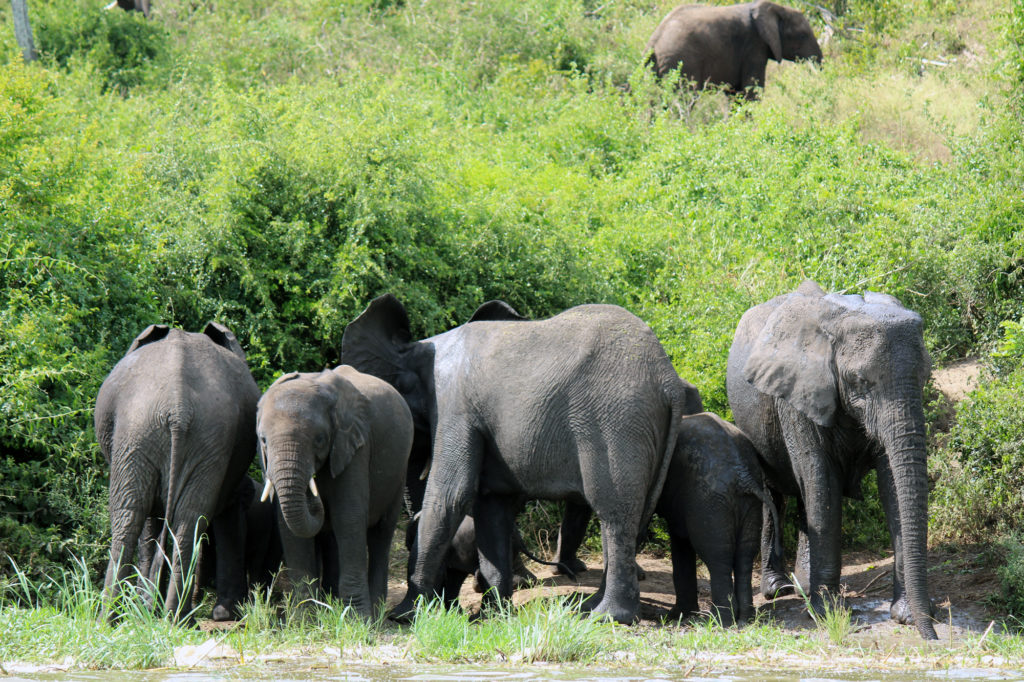

Flights: $1,337 USD
We had layovers in Europe as there are no direct flights that can take you from Toronto straight to Nairobi.
Tour: $2,407 USD
I decided to travel with Intrepid Travel on their Gorillas & Game Parks tour. Going to trek with the gorillas is incredibly expensive on its own (like over $1K USD), so when looking at the most cost efficient tour, this seemed to be it for me. Plus, Intrepid is well known and I trusted it.
Note: The tour I did has gone up slightly in price as they’ve changed this to a Lonely Planet tour since I did it. Learn more on the tour and prices for different dates here .
Vaccinations & Visas: $520 USD
The cost of this probably differs based off your health insurance, and which country you live in. However, this is how much it cost me to get all the vaccinations ($343) I needed to travel to East Africa, my visitor visa ($150), and medication like malaria meds and emergency antibiotics ($25).
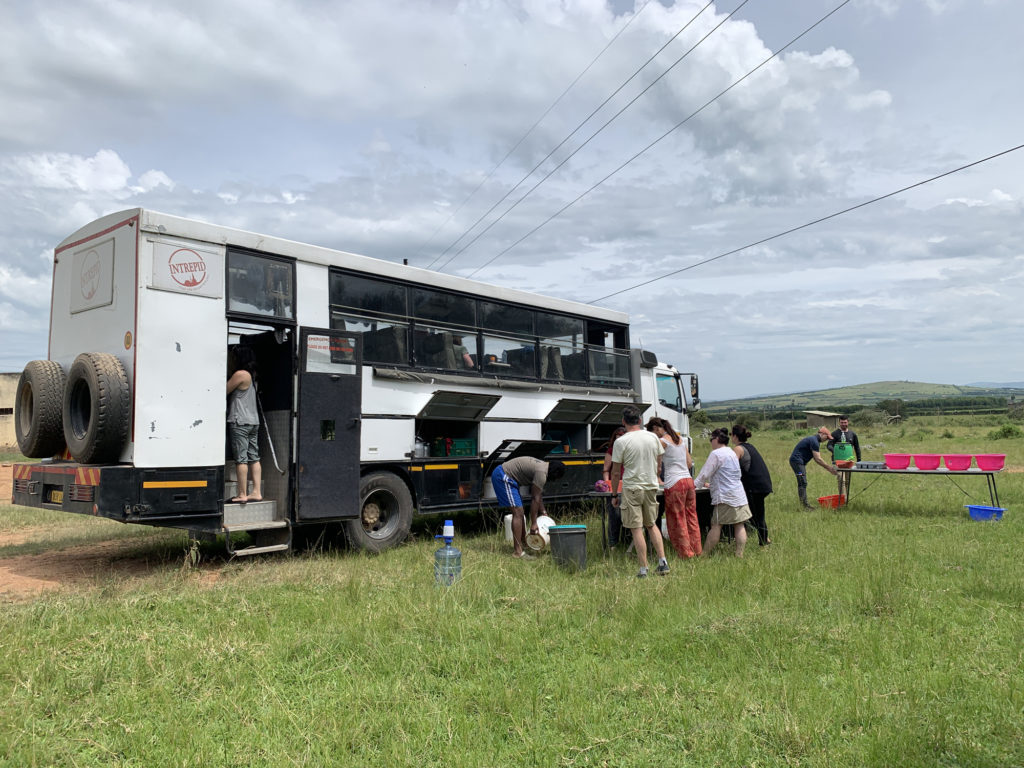
Transportation: $98 USD
This probably seems low for 2.5 weeks in any country, however, since I did do a tour, most of my transportation was done on our bus that was included in the tour. The above cost only includes one additional taxi fee I had to go from Uganda to Rwanda, and the two shuttles I took to and from the airport in Nairobi.
Note: Uber does exist in Nairobi, and can be an less expensive way to travel around the city.
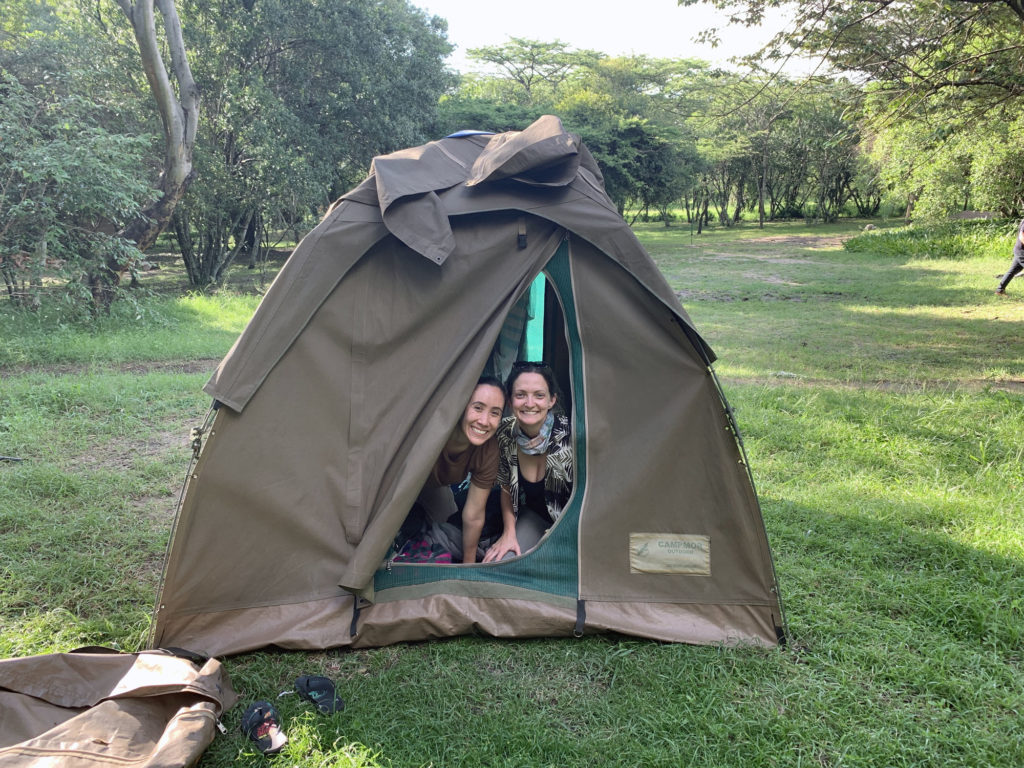
Accommodations: $120 USD
Again, since I was on a tour while in East Africa, all my accommodations were included, and in a tent which they provided. However, at the end of our trip we had one additional day in Nairobi and we had to pay for an extra night at the hotel that our tour ended at. It’s important to keep in mind that accommodations, or really anything in these countries are not as cheap as you think they would be.
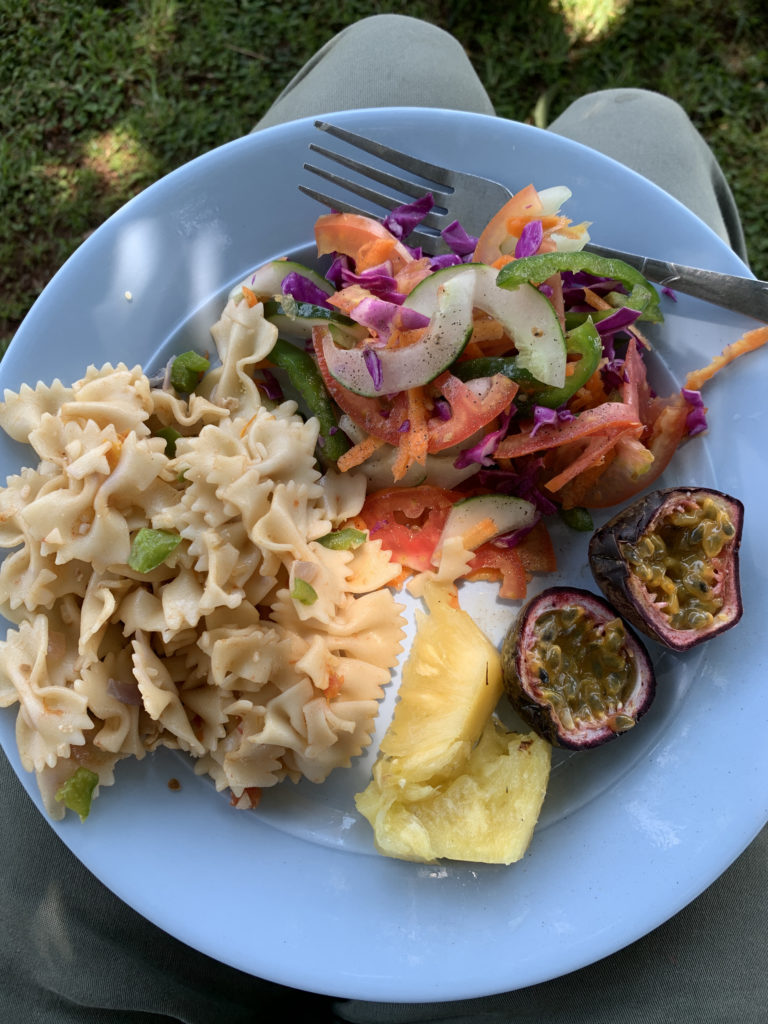
Food: $55 USD
We had a chef with us on our tour that we helped prepare amazing meals with made with local produce. Because of this, we did not have many opportunities to spend money on food. The above cost is only from before/after we joined our tour, and the odd snack, or beer here and there.
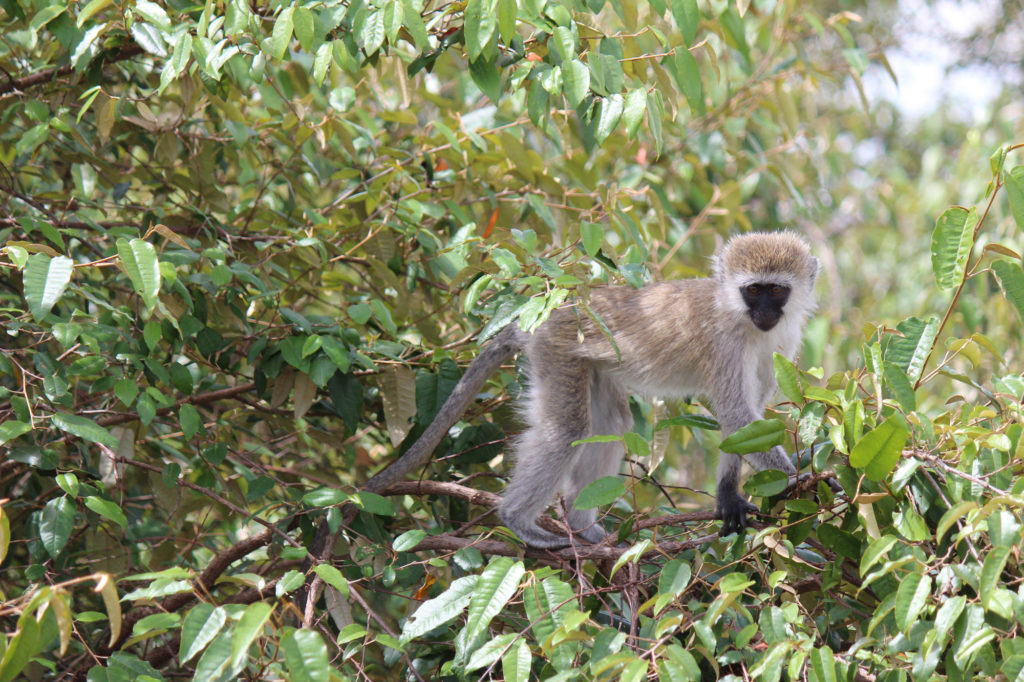
Excursions & Add-Ons: $571 USD
This is definitely where you’ll likely spend the bulk of your budget when on a tour. Most tour companies do not include all the optional activities in the cost of the tour. Naturally, when you are traveling, you’re going to want to do some excursions, etc. so this is always where I budget the most because I never want to have to say “no”. It’s also important to budget tips as well for all your tour guides you’ll have along the way. DO NOT be cheap, and make sure you tip acceptably. Here is a good guide for tipping in Africa.
Note: I did treat myself to a spa day when I returned back in Nairobi which cost $162 of this total , and the most expensive excursion I did was to the giraffe sanctuary and elephant orphanage in Nairobi which can easily be done on your own.
Shopping: $180 USD
I love to bring home souvenirs, and although there weren’t very many opportunities to shop on my trip, I took advantage when there were. East Africa has some amazing art pieces, wood carvings, and more. I think it’s important to note here though that I SUCK at bartering. On top of that, I just felt bad for the people of the shops I visited who make next to nothing in comparison to us, so I didn’t feel bad spending a little more to make someone’s day. You of course could easily spend a lot less in this category.
Total: $5,288 USD
Overall this wasn’t a cheap trip. I really saved up for it to be able to do this. However, I do strongly believe if you really want to make a dream destination and trip happen, you can. I compiled some money saving tricks for travel here for you to help.
*Note this cost is approximate and various factors come into play when choosing and planning a trip through East Africa
Other Content to Read from my Trip to East Africa:
- Traveling with Intrepid in Africa
- What to Pack for an Overland Camping Trip in Africa
- Highlights from East Africa
Pin the below pin to save this resource for future trip planning!
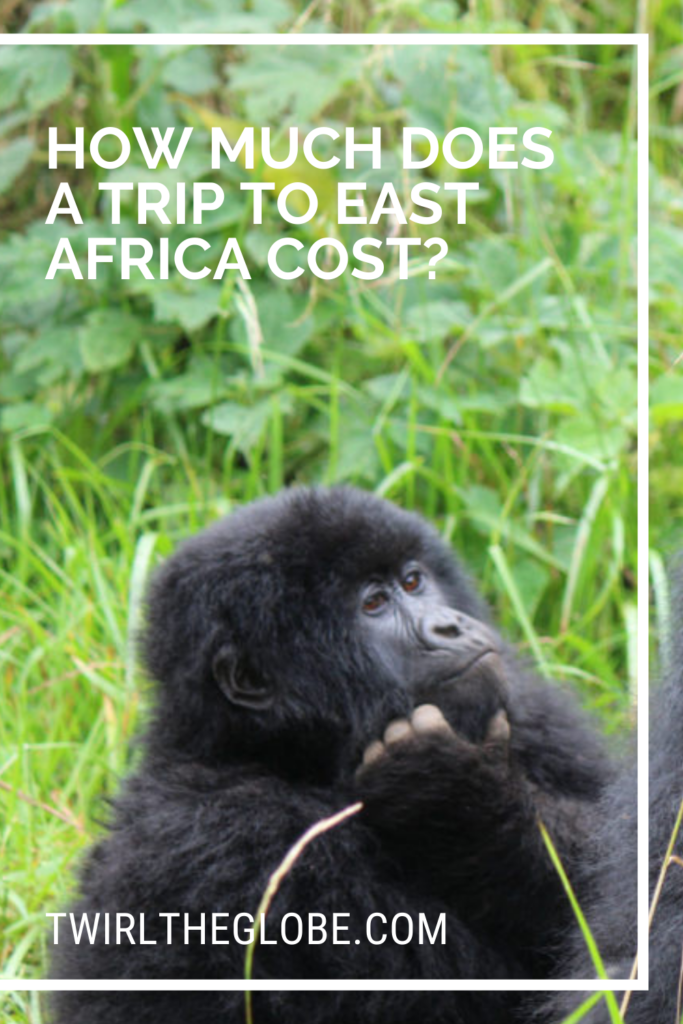
You Might Also Like
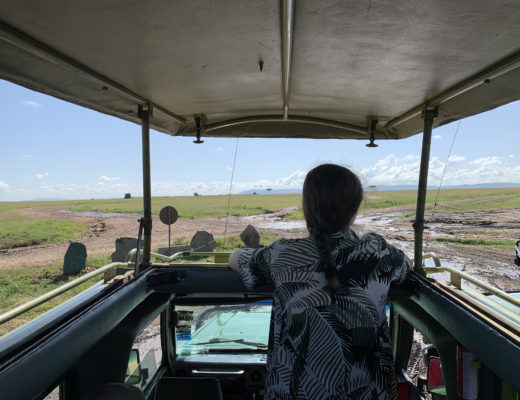
Gorillas & Game Parks with Intrepid [Video]
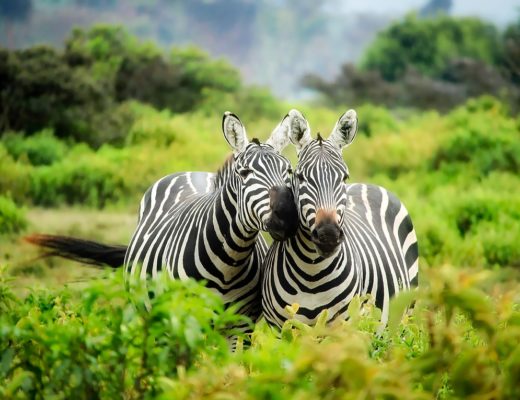
Preparing for a Trip to East Africa
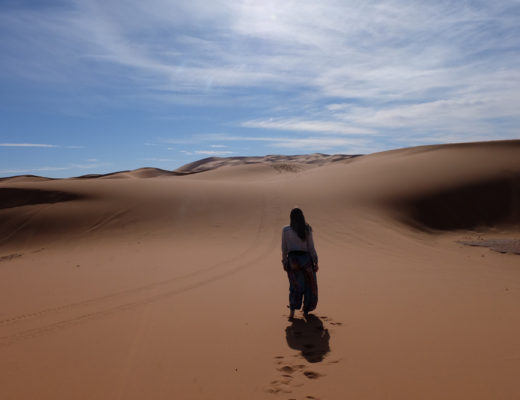
How to Spend One Week in Morocco
No comments, leave a reply cancel reply.

What to Expect on Your First Trip to Africa
:max_bytes(150000):strip_icc():format(webp)/anoukmarrakech-56a373305f9b58b7d0d20299.jpg)
If your first trip to Africa is also your first time visiting a developing country, you may be in for a cultural shock. But don't be scared off by what you hear in the news as there are many myths about Africa . Find out what to expect from your first trip to Africa .
Give yourself time to get used to being in a different environment. Don't compare things with "home" and just keep an open mind. If you are afraid or suspicious of local people's motives, you can needlessly ruin your vacation.
The poverty in much of Africa is usually what strikes first-time visitors the most. You will see beggars and you may not know how to respond. You will realize you can't give to every beggar, but giving to none will most likely make you feel guilty. It's a good idea to keep small change with you and give to those who you feel need it the most. If you don't have small change, a kind smile and a sorry are perfectly acceptable. If you can't handle the guilt, make a donation at a hospital or to a development agency that will spend your money wisely.
Children begging on their own will often have to give up the money to a parent, guardian or gang leader. If you want to give something to begging children, give them food instead of money; that way they'll benefit directly.
Unwanted Attention
You'll have to get used to people staring at you when you visit many African countries, even in areas where there are lots of tourists. The stares are harmless and just curiosity for the most part. Given the lack of entertainment available, checking out a tourist is just fun. You'll get used to it after a while. Some people like to wear sunglasses and feel more comfortable that way. Some people enjoy this new rock star status and miss it when they're back home.
For women , being stared at by groups of men is naturally somewhat threatening. But this is what you can expect when you travel to some African countries , especially in Northern Africa ( Morocco , Egypt , and Tunisia ).
Scams and Conmen (Touts)
Being a visitor, and often much wealthier than most people you see around you, means you also naturally become the target of scams and touts (people trying to sell you a good or service that you don't want, in a deceitful way). Remember that "touts" are poor people trying to earn their living; they would much rather be official guides but often aren't in a position to pay for that kind of education. A firm "no thanks" is the best way to deal with persistent touts.
Common Scams and How to Deal with Them
- Assume nothing is free : While hospitable and friendly folk are everywhere in Africa, be careful when you're in a touristy area and you're offered something for "free." It is rarely free. A "free" camel ride will quickly become an expensive one when you wish to return to where you came from. A "free" guided tour around a tourist site will most likely lead to an uncle's jewelry shop or a demand for money at the end of the tour. A "free" cup of tea might include looking at a lot of carpets. If you hear the word "free." the price you pay is often not in your control.
- Hotels don't suddenly disappear, fill up, or move to a bad location: This tip is especially useful for independent travelers. When you arrive at an African airport , bus station, train station or ferry port you will be greeted by many people, inquiring rather loudly, where you want to go to. Many of these folks will earn a commission for taking you to a hotel of their choosing. This doesn't mean that the hotel will necessarily be bad; it just means you may end up in an area you don't want to be in. The price of your room will be higher to cover the commission, or the hotel could indeed be quite nasty. Hotel touts may ask you what hotel you have booked and then tell you emphatically that that hotel is full, has moved or is in a bad area. Make a reservation with a hotel before you arrive, especially if you're arriving in the evening and/or in a major tourist town. Your guidebook will have phone numbers of all the hotels they list, or you can research online before you go. Take a taxi and insist they take you to the hotel of your choosing. If your taxi driver pretends not to know the location of your hotel, take another taxi.
- Exchanging money on the street: When you arrive in an African country, you may meet people who will try to encourage you to exchange money and will offer a better rate than that which the bank may give you. Don't be tempted to change your money this way. It's illegal and it's also not a great idea to show someone all your foreign currency . There are very few countries in Africa where the black market rate for foreign currency is vastly different from the official exchange rate. (Zimbabwe is one of the exceptions to this rule).
What to Pack for Bali
Currency in Egypt: Everything You Need to Know
10 Common Scams in Bali
How to Travel the World for Free Using Miles and Points
The 9 Best Power Adapters for European Travel of 2024
Bargain Accommodation in Ireland
A Guide to Tipping in India
Step-By-Step Budget Tips for a First European Vacation
Dos and Don'ts in Bali, Indonesia
Your Ultimate Trip to India: The Complete Guide
Tips for Changing Your Money Abroad
8 Most Common Tourist Scams to Watch Out For in India
Beijing Guide: Planning Your Trip
France Travel Planner for Every Vacation
Your Trip to Argentina: The Complete Guide
South Africa Guide: Planning Your Trip

Traveling Africa on a Budget
By: Author Zachary Friedman
Posted on Last updated: February 13, 2024
Categories Africa , Travel Budgeting
Home » Africa » Traveling Africa on a Budget
Africa is a travel destination that can be as cheap or expensive as you want it to be. If you’re willing to take local transport, eat local foods, and camp, Africa is one of the cheapest places on the planet. After all, millions of people survive on the continent on less than $1 per day. On the other hand, if you want to go on safaris, take tours, and stay in decent hotels, Africa is one of the more expensive continents to travel. In this guide, I outline all of the major costs of traveling Africa on a budget.
Each section in this guide begins with a rough budget. After, I’ll break down the costs more specifically to show you where your money is going. I tend to be conservative with my travel budgets so keep that in mind. I’ll also provide some helpful money-saving tips in each section.

This guide is designed for those traveling in Africa independently. If you plan to take an overland tour, most all of your expenses will be included in the price of the tour. If you’re undecided, check out my Africa independent travel vs overland tour pros and cons list.
So far, I’ve visited 12 African countries. I have found that Africa is one of the more expensive places to travel. It is possible to visit on a backpacker’s budget. In this guide, I’ll share my budget and some money saving tips.
Table of Contents
- Safaris and Tours Budget
- African Visas
- Vaccines and Medicines Budget
- Airfare to and Within Africa
Accommodation Budget in Africa
Transportation budget in africa.
- Food and Drink Budget
Travel Insurance Budget
- Travel Gear and Additional Expenses
Volunteering in Africa Budget
Example monthly africa travel budgets, a note about atms and money tips in africa.

Safaris and Tours Budget in Africa
Safaris and tours are the most expensive part of your trip to Africa. Expensive tours are the reason that so many travelers complain about the high cost of travel in Africa. Permit costs are high. Some sites require that you take a guide. Often times, you’ll need to hire a vehicle. It all adds up.
Popular Tours and Safaris in Africa and Their Costs
- Serengeti National Park, Tanzania- This is probably the best and most famous safari park in Africa. It’s located in Tanzania. Expect to pay around $400-$500 for a 2 day one-night safari. This includes your guide, safari vehicle, and one night of accommodation in the park. Food may or may not be included.
- Maasai Mara National Park, Kenya- Located just across the border from the Serengeti, Maasai Mara offers a similar safari experience for around $300-$350. To reduce costs, check out my guide: How to Safari in the Maasai Mara for less than $200.
- Climbing Mount Kilimanjaro, Tanzania- Depending on route and number of days that you choose, expect to pay $1200-$2000. This includes a guide, permits, and food. If you don’t have the proper gear, you may need to rent some in Arusha or Moshi. This adds a bit of cost.
- Gorilla trekking in Uganda, DR Congo, or Rwanda- Expect to pay $800-$2000. This includes a guide, permit, and accommodation for one night. The permit for Uganda costs $600, Rwanda costs $1500, and Congo costs $400.
- Victoria Falls, Zambia and Zimbabwe- Entry on the Zimbabwe side costs $30 and entry on the Zambian side costs $20. You may also wish to hire a guide to walk you across the top of the falls to visit Angel’s or Devil’s pool. Expect to pay around $50 for this service.
- Sossusvlei, Namibia- Here, you can climb some of the largest sand dunes on the planet and visit one of the most photogenic spots in Africa, Dead Vlei. Expect to pay around $300-$400 for a tour. You can save some money by self-driving. For a step-by-step guide, check out my article: How to Visit Sossusvlei, Namibia Independently and On a Budget.
- The Omo Valley of Ethiopia- Visit the tribes. Tours from Addis Ababa go for around $1000. You can visit independently for around $200-$300. Check out my guide: How to Visit the Omo Valley for more info. Also, check out my guide to Dimeka, Ethiopia.
- Cape of Good Hope, South Africa- Day tours from Cape Town start around $25. Other activities- If you plan to bungee jump, whitewater raft, SCUBA dive, take a hot air balloon ride, etc. expect to pay $100-$200 for each activity.

How to Reduce Safari and Tour Costs
For whatever reason, Africans love pushing tours. You’ll encounter people all over the continent trying to sell their guide services. Even when a tour is completely unnecessary. In fact, most of the time it’s just a money grab. Even when guides are required.
Permits and entry tickets are also ridiculously expensive. Some are even a bit of a scam. For example, when you visit the Serengeti, you must pass through Ngorongoro National Park both when you enter and leave. Each time, you must pay the entry fee. You must pay twice even if you don’t care to see the park. That’s a $150 fee that can’t be avoided.
A few ways to cut tour costs include:
- Don’t book in advance- Every tour can be booked when you’re there. If you book online in advance, you’ll end up paying a higher price every time. For example, while traveling in Uganda, a guide approached my friend and I and tried to sell us a gorilla trekking tour for around $800. My buddy had already booked his tour in advance online and paid around $1200. The same is true with safaris. You can save at least $50-$100 by booking in person once you arrive. Tours rarely sell out.
- Negotiate hard- Prices of tours are always negotiable. You can save hundreds of dollars if you’re willing to spend the time bargaining.
- Shop around- Different tour companies cater to different types of tourists. Some cater to budget tourists while others are more high end. If you’re on a budget, shop for a budget tour. You’ll enjoy the same experience with fewer comforts.
- Find a group of people to take a tour with- This can lower your cost in a couple of ways. First, you can use your group to negotiate a lower price per person with a tour company. Second, you can put together your own tour by hiring a guide, vehicle, and booking a campsite by yourself. This is how my buddy and I were able to save around $100 on our safari in Maasai Mara in Kenya.
- Do your research and know the rules- For example, if you know a guide isn’t required, you can save yourself $50 or so for a day tour. When I went to visit Sipi Falls in Uganda, several guides approached trying to sell me their services. I knew a guide wasn’t required so I didn’t hire one. I just explored on my own.
- Choose a cheaper safari park- The animals are the same. You can save a few hundred dollars by skipping Serengeti and going to Maasai Mara instead, for example. Check out my pros and cons list to see if the savings is worth it to you.
- Skip some things- Do you value a longer trip or enjoying a specific tour? Sometimes you have to choose. For example, you could travel for an extra month or two if you forego climbing Kilimanjaro or gorilla trekking. Prioritize the activities that interest you most and skip the rest.

African Visas Budget
African visas are a significant expense that you have to budget for. The price varies depending on your nationality. Most African visas cost between $50 and $100 for a single entry visa that is valid for 30-90 days. If you want multiple entries, the cost increases. If you want a visa with a longer validity, the cost increases.
Before leaving for your trip, you’ll want to do some research on visas. Check which are available at the border on arrival and which must be arranged in advance. If you need to arrange a visa in advance, check whether you can get from an embassy while you’re traveling or if it must be obtained in your country of residence.
You can obtain most African visas either on arrival or along your journey. There are a few exceptions that you must get at home before your trip.
To make a rough estimate of visa costs for your trip, assume $75 per country that you plan to visit. You’ll probably spend less but this will give you an idea of what to budget for. For example, I visited 11 countries on my trip. 11 X $75= $825. In reality, I spent about $650 on visas.
A Note about Paying for African Visas
Pretty much all African visas must be paid for in US dollars. Local currencies are not accepted. The banknotes that you pay with must be in good condition and issued after 2004. Most borders only accept large bills in denominations of $20, $50, and $100. Be sure to bring enough cash as most borders don’t have ATMs.
I tried to pay with 1s and 5s at a couple of borders to get rid of them but was turned away. They told me to go exchange them somewhere then come back. Luckily, you’ll find a currency exchange booth near most every border. You’ll also encounter independent currency exchange guys who can sometimes give you a better rate by working on the black market.
For info on African visas by country including requirements, availability, and prices, check out my Africa Visa Guide.
How to Save Money on African Visas
- Avoid multiple entries- Try to plan your itinerary in such a way that you don’t need to enter any countries twice. This way, you’ll avoid having to pay extra for a multi-entry visa or a new visa.
- Skip countries with particularity expensive visas- The most expensive visa I had to pay for on my trip was Tanzania at $100. It wasn’t worth it. This is just one of the reasons that I’ll never return to Tanzania.
- Take Advantage of the East Africa Visa- This visa allows you to travel between Kenya, Uganda, and Rwanda for up to 90 days. The cost is $100. This saves you a minimum of 30 dollars and a bit of hassle. If you buy each visa separately, you’ll spend $50 for Kenya, $50 for Uganda, and $30 for Rwanda. If you need multiple entry visas, you’d be saving even more.
- Don’t get scammed- Some immigration officials are corrupt and can solicit bribes. Sometimes, you’ll encounter a scammer offering to help you with the visa. The best way to avoid getting scammed is to know the cost of the visa before you arrive at the border and have patience. For more info, check out my guide: 19 Common Travel Scams and How to Avoid Them.
While traveling from Ethiopia to South Africa overland, I spent about $650 on visas alone. I travel on a US passport. For most European nationalities, the cost will be about the same. I’m currently planning a West Africa trip and expect to spend over $1200 on visas and related expenses. As you can see, this expense is significant enough that you need to consider it while traveling Africa on a budget.

Vaccines and Medicines Budget for Travel in Africa
Before traveling to Africa, chances are you’ll need to get a few travel vaccines and medications to help you stay healthy during your trip. Which vaccines you need depends on where you’re planning to travel, for how long, and the activities that you plan to participate in. Some vaccines are required and some are recommended. Some you’ve probably already had. The cost of these varies greatly by country. In some places, they’re free and in some, they cost hundreds of dollars.
Recommended Travel Vaccines for Africa and their Costs
To get most travel vaccines, you must visit a travel clinic. Your regular doctor’s office usually doesn’t stock them. I recommend you visit a clinic that is operated by your city or state government. Prices will be lower than in private clinics. The staff can direct you as to which vaccines you’ll need for your specific trip. The following prices are for the US. They are generally cheaper in other parts of the world.
- Yellow Fever- This is the most important one because it’s an entry requirement for many African countries. Unfortunately, it’s often the most expensive. Expect to pay $150-$200.
- Typhoid- This one is available in oral or injection form. Expect to pay $30-$50.
- Hepatitis A- This disease is transmitted through contaminated food or water. Expect to pay around $100 for the vaccine.
- Rabies- This one is only recommended if you plan to travel in rural areas or participate in outdoor activities.
- Cholera- This one is only recommended if you plan to travel in rural areas or participate in outdoor activities.
- Meningitis (Meningococcal)- While the risk is pretty low, you should consider getting this vaccine if you plan to travel to a place where Meningitis is present. Expect to pay $100-$150.
In addition to the above, you should also make sure that all of your routine vaccines are up to date. Check your vaccine history and make sure that you didn’t miss any during childhood. Your health insurance should cover the cost of routine vaccines. Disease rates are significantly higher in Africa so you want to make sure that you’re protected.
If you don’t already have any of the above travel vaccines, budget $400-$500 to get them. It’s expensive but the good news is that most of these vaccines last for many years or even a lifetime.
How to Save Money on a Yellow Fever Vaccine
Consider waiting until you arrive in Africa to get your Yellow Fever vaccine. In some countries, you can get the vaccine at the airport when you arrive for a fraction of the price of getting it back home. You could save over $150 this way.
Before you do this, be sure to do your research. You don’t want to be denied entry because you don’t have your yellow fever vaccine which is required in some countries. Also, know that the Yellow Fever vaccine takes around 10 days to become effective. You won’t be protected during that time.
Malaria Tablet Budget for Africa
Malaria still kills hundreds of thousands of people per year. Including some tourists. While traveling in much of sub-Saharan Africa, you’ll want to take prophylaxis if you’re visiting a malaria zone. You have three options in terms of tablets. Each has its own pros and cons. Prices also vary. Options include:
- Malarone (Atovaquone/Proguanil)- This is the most expensive but has the fewest side effects. It is taken daily. Expect to pay around $5 per day.
- Doxycycline- This is the cheapest option. It is effective against most types of malaria and is taken daily. This is the malaria tablet I use. Expect to pay around $0.50 per day.
- Lariam (Mefloquine)- This is the most convenient option as you only have to take it once per week. Unfortunately, many travelers complain about side effects. Expect to pay around $0.75 per day.
As you can see, prices vary widely. To help you decide which is best for your situation, visit a travel clinic for a malaria consultation. This usually costs $30-$50. Budget around $30 per month on malaria prophylaxis if you don’t take Malarone (Atovaquone/Proguanil).
How to Cut your Malaria Tablet Budget
Consider purchasing your malaria tablets when you arrive in Africa. I waited until I arrived in Ethiopia to purchase a 4 month supply of doxycycline for less than $10.
Airfare Budget for Travel to and Within Africa
Airfare to and around Africa is expensive. There are simply fewer travelers which means fewer flights and more expensive tickets. Your airfare will be a major chunk of your Africa travel budget.
Of course, the cost of your flight to Africa depends on where you’re starting from. Most flights to Africa originate in Europe or the Middle East. If you’re traveling from outside those regions, you’ll probably have a layover somewhere along your journey.
For a round trip ticket to Africa from the US, expect to pay $1200-$2000. Tickets from Europe and the Middle East are cheaper. Expect to pay around $500-$1000 for a round trip ticket.
Air travel within Africa is expensive for the same reason. One way fights between African capitals often run around $200-$300.
Domestic flights within larger African countries are often more affordable. Even then, the bus is always significantly cheaper.
Tips to Reduce Your Africa Airfare Budget
- Fly into a major hub in Africa- Choose a major African city to start your journey in. Flights are cheaper. Nairobi, Addis Ababa, Johannesburg, Dakar, and Cairo are a few good cities to fly into.
- Fly from a city with a lot of flights to Africa- London, Pairs, Frankfurt, Istanbul, and Dubai are a few of the cities which offer numerous flights all over the African continent. Prices in these cities are more reasonable due to higher supply. You can save money by taking a budget flight to your nearest major hub first then catching your long haul flight to Africa.
- Fly with a low-cost or budget airline- The African airline with the most reasonable prices is probably Ethiopian Airlines. Kenyan Airways also offers some decent prices. Keep an eye out for deals- Occasionally airlines offers specials on flights to Africa. It pays to shop around.
- Take the bus instead of flying- Once you’re in Africa, avoid flights. Just travel overland if possible. For example, I traveled from Addis Ababa to Nairobi overland* for about $40. The same flight costs around $200.
Accommodation in Africa is expensive. Particularly when you consider the quality you get for your money. If you’re traveling alone and plan to stay in budget accommodation every night, expect to spend around $20-$30 per night on average.
In this section, I’ll outline each of your African accommodation options and their cost per night. I’ll offer some tips to lower your accommodation cost.
African Hotels Budget
I’ll start off by going on a bit of a rant. African hotels are a rip-off. A basic, run-down hotel room that hasn’t been updated since 1960 can cost $25-$50 per night. Often, that’s the cheapest option in town. Paying this much for such low quality is particularly annoying when you consider what you could get for the same price in Southeast Asia or Latin America.
You’ll encounter three types of hotels while traveling in Africa. Listed in order of cheapest to most expensive they are:
- Basic hotels- You’ll find these in small villages and rural areas. They are basically just a small room with a bed and maybe a table and chair. Bathrooms are shared. Some don’t have running water so they bring you a bucket to bathe. Expect to pay $2-$10 per night for a basic African hotel room.
- Standard budget hotels- This is your typical hotel with a private bathroom, bed, and maybe a tv. Most have hot water. You’ll find these hotels in any decent-sized city. Expect to pay $20-$40 per night for a standard budget hotel room in Africa.
- High-end hotels or lodges- Larger cities and tourist cites offer high-end accommodation options with all of the facilities you expect a hotel to have. Prices start around $150 per night and go up from there.

Tips to Save Money on African Hotels
- Don’t book in advance- Prices are significantly higher online. Most of the time, hotels don’t even check their online reservations. These places rarely fill up in Africa. You can save a nice chunk of money by just showing up.
- Negotiate hard- Hotel prices are almost always negotiable in Africa. If you’re staying multiple days, try to negotiate a price for the full stay to get yourself a lower nightly rate.
- Stay outside of the city center or in less desirable neighborhoods- Hotels in these areas are cheaper. For example, I stayed in Eastleigh in Nairobi for a couple of days for $12 per night in a room with a private bathroom and tv. That’s cheaper than a hostel dorm.
- Split the cost with another traveler- If you can share the room with someone else, it becomes more affordable. Hotels are the main reason that solo travel in Africa is so expensive.
- Shop around- Africans love to overcharge foreigners. If you ask around at a few hotels, you may find an honest one that offers you a room at a reasonable price.
Hostels in Africa
Hostels are still pretty uncommon in Africa. Having said that, most capital cities and tourist areas have at least a hostel or two. Expect to pay $10-$15 per night for a bed in a dorm room.
Overall, the facilities are fine. Most African hostels include a basic breakfast in the price. They generally have decent wifi. Most have hot water. Hospitality is excellent in Africa.
Camping in Africa
While traveling in Africa, I recommend you travel with a tent or some kind of camping shelter. You can greatly reduce your Africa travel budget and have some unforgettable experiences while camping in the bush.
Many African hotels and hostels allow you to camp in their compound for a reduced rate. For example, if a room costs $40, maybe you can camp outside for $10. This is a significant savings. In this case, you still have access to the restroom and other facilities.
While visiting a national park or going on safari, many times your only accommodation options are camping or staying in a fancy safari lodge that charges well over $100 per night. In this case, camping is almost a necessity for most budget travelers.
Most African campgrounds charge around $10-$25 per night. If you have your own tent, expect to pay toward the lower end of this range. If you need to rent a tent, prices are higher.
For those more adventurous travelers, you can also wild camp in parts of Africa. If you decide to do this, I recommend you be very careful about choosing a campsite. You don’t want to stay on someone’s land or be discovered in the night. A good alternative is to ask local villagers if they know of a spot where you can camp for the night. Usually, you’ll be given a safe spot in the village.
Some of my best memories of my trip are camping. Viewing the Milky Way while camping in the middle of the Namib Desert while visiting Sossusvlei is an unforgettable experience. I also camped in Serengeti National Park in Tanzania and just outside of Maasai Mara National park in Kenya. Both nights were spectacular.
Airbnb in Africa
If you’re looking to stay in a larger city for more than a week or so, check Airbnb. Many hosts offer long term discounts. A room can end up costing less than a hotel. Plus, you’ll get access to a kitchen and other facilities. Expect to pay $10-$20 per night for a private room in an apartment. You can also find private apartments for just a bit more.
Long Term Accommodation Cost in Africa
If you want to travel in Africa on an extremely tight budget, like less than $800 per month , you can if you don’t travel around too much. By staying in long term accommodation, you can travel in Africa on a low budget.
In small villages, you can rent a basic room for as little as $20 per month. As I said earlier, millions of people survive on the continent for next to nothing. If you’re frugal and not too concerned with comfort, you can travel in Africa on very little.
In larger cities, you can find a decent studio apartment for as little as $150-$300 per month. This will probably be outside of the city center but it will be secure.
Another good place to look for long term accommodation is Airbnb. Many hosts offer major monthly discounts. Sometimes as much as 50% off the normal rate. While this is more expensive than renting, it is much easier and convenient. You can rent a room for around $200-$300 per month in many cities.
Even though transportation is pretty affordable in Africa, costs add up because the continent is so large. Traveling from one tourist destination to another can take days. Your transportation budget while traveling in Africa depends on how fast you want to travel and your desired level of comfort.
On average expect to pay $20-40 for an international bus journey between two capital cities. The price depends on the distance and the quality of the bus. For domestic journeys, assume around $1-$2 per hour of travel.
If you don’t mind squeezing into a minibus for hours or days on end, you can get around pretty cheaply. If you only have a limited amount of time to travel and you need to fly to cover some legs of your journey, costs increase significantly.
Shared Taxi or Minibus Travel Budget in Africa
This is the main mode of transport across Africa. It’s how the locals get around. Shared taxis and minibusses travel both within and between cities. They operate on set routes and just run back and forth all day. Expect to pay between 50 cents and $1.50 per hour of travel when traveling between cities. You’ll pay about the same to cross a large city.
When you travel long distance by minibus, you’ll have to make transfers. Most intercity minibuses travel back and forth between two towns that are several hours apart. Once they reach their destination, you get out and find a minibus on toward your destination. Sometimes you pay once and sometimes you must pay each driver separately. This is a hassle, but it’s the cheapest way to get around.
Money-saving tip: Minibus drivers love to overcharge foreigners. Be sure to ask the price before accepting a ride. You can also ask a fellow passenger how much the ride should cost. If the driver tries to overcharge you, negotiate hard. As a foreigner, you’ll usually end up paying a bit more than the locals.
If the driver tries to blatantly rip you off, just wait for another minibus to come by. In most situations, you’ll find one within 15 minutes. Of course, there are routes with only one bus per day. In this case, you may just have to accept that you’re overpaying.
Africa Bus Travel Budget
For many longer journeys, coach services are available. Expect to pay $1.50-$2 per hour of travel. Most long-distance coach tickets usually end up costing $20-$40. For example, a ticket from Nairobi, Kenya to Kampala, Uganda usually costs about $25.
If coach service is available for your desired route, I recommend you take it instead of a minibus for several reasons. First, prices are set. This means that you don’t have to negotiate. You also get to enjoy relative comfort. Some coaches even have AC. Coaches are also safer. Africans often drive pretty fast.

For more info on coach and minibus travel including pricing and step-by-step guides to some of the most popular routes on the continent, check out my Ultimate African Bus Guide.
Train Travel Budget in Africa
Train routes around Africa are limited. Schedules are often unpredictable due to maintenance and break downs. Expect prices similar to the bus, around $1-$2 per hour of travel.
Train travel in Africa is an experience. If you have the choice on a particular route, I recommend choose the train over the bus. A few popular African train routes include:
- Victoria Falls to Bulawayo or Harare in Zimbabwe
- Iron Ore train in Mauritania
- Cairo to Aswan in Egypt
I’ve only enjoyed one African train journey so far. To read about my experience, check out my guide: How to Travel Between Victoria Falls, Bulawayo and Harare by train.
Ferry Travel Budget in Africa
One ferry journey that many travelers will make in Africa is the trip to Zanzibar from Dar es Salaam. A round trip ticket on the fast ferry costs about $70-$80.
Several other ferry trips are possible on Lake Victoria and Lake Malawi. If you’re traveling in West Africa, you’ll cross a number of rivers by boat or ferry. Ticket prices vary. Expect to pay anything from a dollar or two to $50 or so for longer journies.
Uber or other Rideshare Apps in Africa
Ridesharing is surprisingly popular in Africa. Uber operates in many large cities on the continent. Many cities also have their own rideshare apps which are often cheaper. Some even offer motorcycle taxi services.
Expect to pay $3-$5 for an average length ride half way across town. For a longer ride to the other side of a city, expect to pay $8-$10.
If ridesharing is available where you’re traveling, I recommend you use it over Taxis. Prices are lower, you don’t have to negotiate, and you’re less likely to encounter a scammer or shady driver. All of the drivers that I met were honest and friendly. I can’t say the same of taxi drivers.
Self Drive Cost in Africa
If you prefer to have your own wheels, you have several options in Africa. You can:
- Rent a car or 4×4 and drive yourself- Rental costs vary by location and vehicle type. For a basic economy car, expect to pay around $40-$50 per day. I rented a car in Namibia for $43 per day when I visited Sossusvlei.
- Buy a car or motorcycle and drive it through Africa- If you’re feeling really adventurous, you can buy a vehicle or ship your own to Africa and explore the continent with your own wheels. This type of travel is called Overlanding. For a trip like this, you must consider the cost of the vehicle, maintenance, gas, insurance, and all necessary documents such as a carnet de passage.

Hiring a Driver in Africa
If you want the freedom of having your own vehicle, but don’t want to actually drive yourself, you can hire a driver in Africa. Expect to pay $50-$150 per day for a car and driver.
I realize that this is a large range but the price varies greatly by country and type of vehicle required. For example, some routes require 4 wheel drive to navigate.
Bicycle Touring in Africa
Bicycle touring is becoming more and more popular. Probably because it’s just so economical. Traveling by bicycle cuts your transportation budget to almost nothing. All you need to worry about is the cost of maintenance.
Of course, there are quite a few upfront costs to bicycle touring such as buying a bike, tools, and panniers or bags. All in, you’re probably looking at around $2000 for a decent touring setup.
For my next trip to Africa, I’m considering traveling with a folding bike to cut my transportation budget. This way, I’ll be able to enjoy the benefits of bus travel for long-distance journeys and bicycle travel for local transport.
Food and Drink Budget while Traveling in Africa
Overall, food prices are very reasonable in Africa. You can maintain a healthy, filling diet on about $150-$200 per month. This includes mostly local foods with the occasional western meal.
If you only eat local foods and cook for yourself on occasion, you could get by with a food budget of $80-$100 per month. In Africa, you can enjoy a nice local meal at a small roadside restaurant for around $1-$2.

Common African foods include:
- Various stews
After a while, basic African foods get a bit boring in my opinion. The cuisine just isn’t that exciting. It’s nice to splurge once in a while and treat yourself to a western or Indian meal. Expect to pay $5-$10 for a decent sized portion of spaghetti, pizza, burger and fries, or a nice curry.

Drink Budget in Africa
Drinking water budget in africa.
Because of the heat, you will drink a lot of water while traveling in Africa. Unfortunately, tap water isn’t potable through most of the continent. Bottled water is available everywhere. Expect to pay $0.50-$1 per liter.
Water Budget Tip: Travel with a Water Filter
Assuming you drink 2 liters of water per day, you’ll spend a $30-$60 per month on drinking water alone. This is just too much. A water filter is almost an essential piece of gear while traveling in Africa. You can use your water filter to make tap water or water from a river or stream to safe to drink. A good filter will pay for itself in less than a month. I like the Sawyer Mini. It filters out bacteria, protozoa, and debris. Check out my full review of the filter here.
Alcohol Budget in Africa
The most popular alcoholic beverage in Africa is probably beer. It’s sold everywhere. Most every country has its own national brew for you to try. Expect to pay around $1-$1.5 for a beer on average.
The cheapest and best beer I found in Africa was in Ethiopia where a bottle costs only 50 cents. Beer in Kenya was the most expensive and most disappointing in terms of taste. I paid $2-$3 per beer in Nairobi.
In Uganda, you can buy 100ml bags of spirits for around $1-$2. They don’t taste that great but it’s probably the cheapest way to get a buzz.

If you decide to travel through Ethiopia, be sure to try the honey wine called tej. This sweet homemade beverage is served in small roadside stands where people congregate to drink. Expect to pay $1-$2 for a large bottle.
Coca Cola products are available seemingly everywhere in Africa. Even in the smallest villages in the Omo Valley of Ethiopia. Expect to pay around $0.50-1.50 for a cold glass bottle of coke or sprite.
Travel insurance is optional but highly recommended. Africa is such an unpredictable place to travel with risks that other destinations just don’t have. For example, your bus could break down and leave you stranded for a day, causing you to miss a flight. You could contract a bad strain of malaria and end up in the hospital for a few days. You could get mugged. Travel insurance can save you money in the event of one of these unfortunate occurrences.
Additional Travel Gear Budget
While traveling in Africa, you should pack all of your important gear from home. Don’t expect to wait until you arrive to buy any important items. Finding quality gear in much of Africa can be a challenge. Imported items are more expensive in Africa as well due to high import costs. The only country where you can pretty easily buy whatever gear you need is South Africa.
For example, if you need a new pair of shoes, you’ll probably need to travel to a capital city to find a shop that sells name brands. Once you’re there, you’ll notice that prices are significantly higher than they are back home. It’s also hard to determine what is genuine what is a Chinese knockoff.
Most travelers already have all of the necessary gear for traveling in Africa. If you need help with packing, check out my ultralight travel packing list.
A few additional items you may need for travel in Africa include:
- A tent or other camping shelter- As mentioned earlier, camping in Africa can save you a good amount of money. Look for an ultralight option. I have the Big Agnes Fly Creek HV UL 1 and am really happy with it. Check out my review here.
- Water filter- This small piece of gear can save you hundreds of dollars over the course of a long trip.
- Mosquito net – Most hotel rooms have one but some don’t. It’ s a good idea to pack your own just in case.
- Extra credit and debit card- If your card is lost or stolen, you’ll want to have a backup. Getting a replacement could be a challenge as receiving mail in many African countries is expensive and time consuming.
- Spare glasses and contacts- While you can buy new glasses and contacts in Africa, it’s a hassle and expense that is best avoided. It’s best to just bring some spares. For more tips, check out my guide: Tips for Travel with Glasses and Contacts.
- Money belt- In Africa, you need to carry quite a bit of cash. You need to pay for expensive visas and sometimes ATMs aren’t very readily available. I recommend you use a money belt to keep your cash, passport, cards, and other small valuables hidden. This will reduce the risk of losing it in the event of a mugging or robbery. I like the Eagle Creek Silk Undercover money belt. For more info, check out my full review here.
Many travelers choose to pair volunteer work with their travels in Africa. They work for a charity organization for a few weeks or months then travel independently after. I recommend skipping the volunteer work for the following reasons:
- Volunteer programs are expensive- Many of these volunteer programs charge over $1000 per month. Personally, I can’t imagine paying someone to work for them. It just seems illogical. I do understand paying a small fee of a couple of dollars per day to cover food and accommodation but anything beyond that feels like they’re taking advantage.
- Volunteer work often does more harm than good- Most volunteers are unskilled. They can’t contribute in any meaningful way. In fact, volunteer work often takes jobs that locals could preform. If you want to help, donating money to a legitimate charity is generally much more productive than volunteering. Of course, there are exceptions. Skilled volunteers like doctors and engineers can do a lot of good.
- Many African charities are scams- Corruption is so bad in Africa that finding a legitimate charity can be a challenge in itself. Much of your work and money will just go toward lining some corrupt official’s pocket. You can do more good by supporting local businesses with your tourist dollars.
Most travelers can comfortably travel Africa on a budget of $1400-$1800 per month. This includes airfare, safaris, tours, food accommodation, and all other necessary expenses. On this budget, you’ll eat good, see most of the main sites, and travel in relative comfort. Of course, you’ll miss out on some of the more expensive or luxury activities.
Here is the breakdown of an average Africa travel budget:
- Accommodation- $20 per day equals $600 per month. On this budget, you can stay in budget hotels most nights with the occasional night couchsurfing, camping, sleeping in a hostel, or AirBnb.
- Food- $200 per month. On this budget, you’ll eat mostly local foods with the occasional higher-end or western meal. You may wish to prepare some of your own meals to balance costs if you like to eat out more.
- Drinks- $100. Enjoy a couple of beers in the evening or a soda with your meal.
- Transportation- $100 per month. On this budget, you’ll travel mostly by bus or minibus with the occasional taxi or Uber. You won’t fly within the continent on this budget.
- Visas – $100 per month. This is assuming you visit about 1-2 countries per month.
- Flight- The cost per month depends on the length of your trip. Assuming you spend $1200 on a ticket and travel for 6 months, you’ll spend $200 per month.
- Safaris and tours- Assuming you travel for 6 months and visit some of the more expensive destinations, you’ll spend $1800. That comes out to $300 per month.
- Additional travel gear- budget around $100 per month for replacement items. Sometimes things get broken, lost, or stolen. For example, if your phone gets pickpocketed , you can buy a new one out of this budget.
If you add this all up, it comes out to $1600 per month. Your monthly budget will be lower if you travel longer. The cost per month of your flight and tours decreases when you divide it between more months. If your trip is shorter, you’ll spend more per month.
Of course, it is possible to travel in Africa on a much lower budget as well. To achieve this, you’ll have to skip the expensive tours and seek cheaper accommodation. Some destinations may be inaccessible because of the high cost.

Breakdown of Costs While Traveling Africa on a Budget
- Accommodation- $10 dollars per day equals $300 per month. On this budget, you’ll be able to stay in basic hotels occasionally. To balance the cost, you’ll have to couchsurf, camp, and stay in hostels where available.
- Food- $100 per month. Your diet will mostly consist of local food with the occasional western meal. You’ll also need to prepare some of your own meals.
- Visas- $100 per month. This is assuming you visit 1-2 countries per month.
- Transportation- $50 per month. To cut your transportation budget, you’ll have to travel slower and take minibusses instead of expensive taxis.
- Flight- $1200 or $200 per month for a 6 month trip.
- Safaris and tours- $0. If you’re on a low budget, you’ll just skip these. Additional gear- $50 per month for replacement of lost, stolen, or broken gear.
If you add this all up, it comes out to $800 per month. You can further reduce this Africa travel budget by traveling slow. By staying in one place longer, you can find significantly cheaper accommodation. For example, you could rent a basic room for less than $100 per month in many 2nd tier cities. Traveling slower also reduces your cost of transportation and visas.
It’s possible to cut your Africa travel budget to around $500 per month if you’re frugal. While you’d be living a pretty basic existence, this is still 5 times more than millions of people live on.
My Africa Travel Budget
Over the course of about 4 months, I traveled from Addis Ababa to Cape Town overland by bus. I ended up spending about $4000. This includes all food, accommodation, tours, and transportation. It does not include my airfare which I got for free through credit card points. Had I paid my own airfare, it would have cost me around $1000 round trip from Los Angeles.
During my trip, I skipped two major tours. I did not hike Mount Kilimanjaro and I did not go gorilla trekking. These are both $1200+ tours that I decided to skip to reduce my Africa travel budget.
My one regret is skipping the gorilla trekking tour. I hope to travel to DR Congo on my next trip to see the mountain gorillas in Virunga National Park.
As an alternative to Kilimanjaro, I’d like to climb Mount Kenya on my next trip to East Africa. The permit price is much lower.
Overall, the money situation is a bit more tricky in Africa than many other travel destinations. Credit cards aren’t as widely accepted. You need to carry cash.
Luckily, ATMs are fairly easy to come by in Africa. This makes withdrawing local currency pretty easy. All larger cities have ATMs. Many small towns surprisingly have an ATM as well. For example, I was surprised to find a working ATM in Jinka in the Omo Valley of Ethiopia. I also used one in Karonga, a small town in northern Malawi.

A Few Africa Money Tips
- Carry some cash as a backup- If you find yourself in a place without a working ATM or if your debit card gets lost or stolen, you need to be able to get by until you’re able to get more cash. I recommend carrying at minimum $500 in USD in denominations of 20,50, and 100. You can exchange them anywhere for local currency. You can use these to buy visas as well.
- Plan cash withdraws ahead- If you’re traveling to a rural area, withdraw enough cash from the ATM to support yourself until you make it to another city. Small villages don’t have banks.
- Know the exchange rates- If you need to exchange money, you want to shop around or negotiate the best rate. You also need to know what things cost so you don’t overpay.
- Do your research- In some countries, it is difficult or impossible to get cash from an ATM. For example, when I arrived in Zimbabwe, I found that all of the ATMs were empty. In Sudan, you can’t use foreign cards at the ATM. You must bring enough cash to last you the duration of your stay.
- Carry backup cards- Keep them separated so if you lose one, you may not lose the other. You need to have access to your money.
Final Thoughts on Traveling Africa on a Budget
In general, Africa is one of the more expensive travel destinations. When you factor in the high price of flights and safaris, you’re paying more to travel in Africa than you would to visit Latin America, Southeast Asia, or even much of Europe.
On the other hand, if you’re traveling long term and don’t care about seeing the main tourist sites, Africa is probably the cheapest place in the world to travel. You could get by on just a few dollars per day.
Personally, I believe the experience of traveling in Africa is well worth the cost. I completely fell in love with the continent. It’s my favorite continent that I have traveled.
Are you planning to travel to Africa on a budget? Share your plans in the comments below!
More Africa Guides from Where The Road Forks
- How to Plan a Cairo to Cape Town Trip
- 13 Best Things to do in Nairobi
- 5 Incredible Things to Do in Uganda
- Why Nairobi is the Best African City
- Scams in Ethiopia: My Afternoon with a Con Man
- 15 Great Rift Valley Lakes to Visit in East Africa
Zachary Friedman is an accomplished travel writer and professional blogger. Since 2011, he has traveled to 66 countries and 6 continents. He founded ‘Where The Road Forks’ in 2017 to provide readers with information and insights based on his travel and outdoor recreation experience and expertise. Zachary is also an avid cyclist and hiker. Living as a digital nomad, Zachary balances his professional life with his passions for hiking, camping, cycling, and worldwide exploration. For a deeper dive into his journey and background, visit the About page. For inquiries and collaborations, please reach out through the Contact page. You can also follow him on Facebook.
Sharing is caring!
Sign me up for the newsletter!
Saturday 18th of March 2023
This is so much information to plan my trip to Africa. I live in Africa so I will spend less on Visas. However, I wanted to ask if the east Africa Visa you talked about is open to everyone as I stay in west Arica?
Cookie policy
Wanderlust Movement | A South Africa Travel Blog
10+ of the Cheapest African Countries You Need to Visit
March 6, 2020 by Lauren Melnick
Last Updated on October 5, 2023 by Lauren Melnick
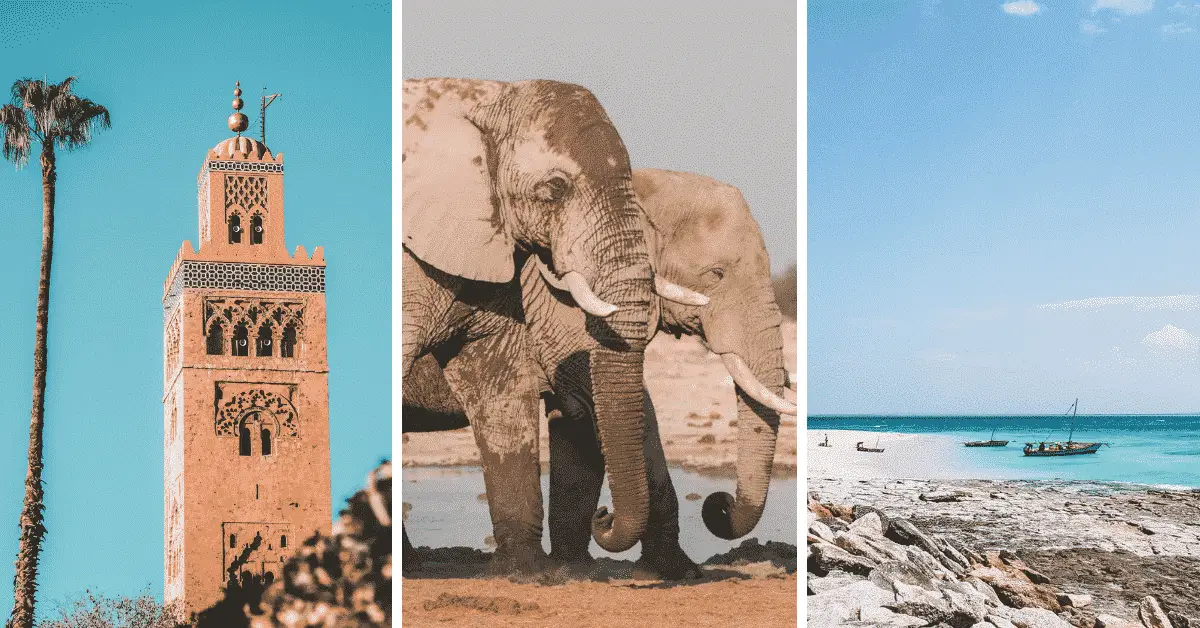
Travelling around Africa is NOT cheap.
From gorilla trekking in Rwanda to luxury safari lodges in Kruger National Park , a trip to Africa can quickly add up.
But good news everyone!
While Africa is no South East Asia, there are plenty of cheap destinations in Africa.
From Morocco to Egypt and Mozambique, here are 10 of the cheapest African countries to visit!
Table of Contents
1. Kigali, Rwanda
4. zanzibar, 5. ethiopia, 7. livingstone, zambia, 9. mozambique, 10. morocco, 11. south africa.
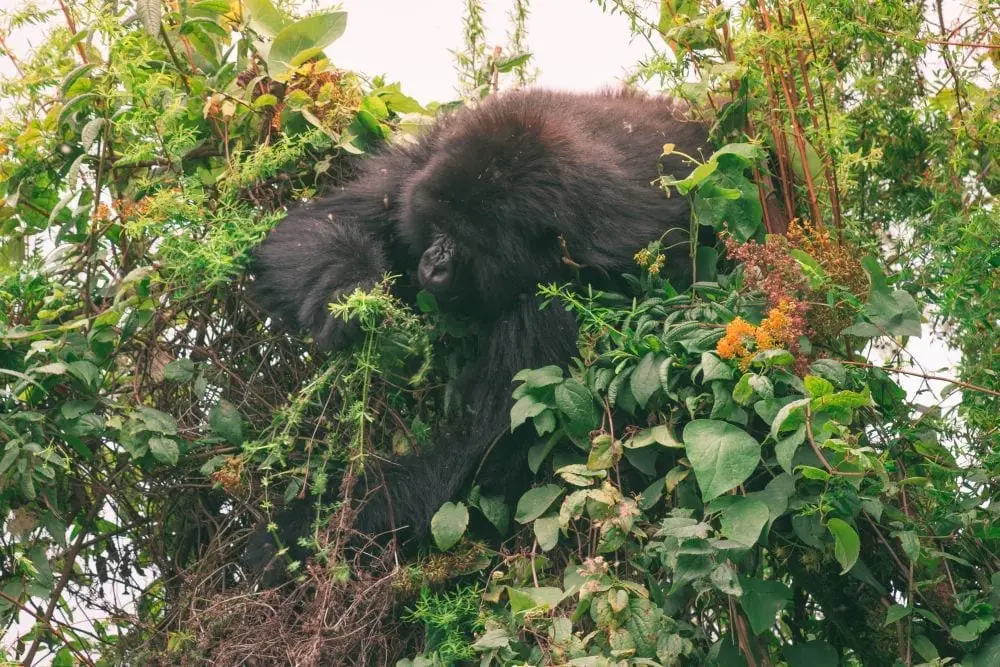
I came across a gorilla by accident during my trip to Rwanda!
Rwanda’ s tragic past, rich culture, and incredible wildlife make it one of the most intriguing places to travel to in Africa.
Kigali is the pulse of the country’s cultural attractions. With its genocide memorials and thriving art scene, it’s a must-visit for history buffs and those who love immersing themselves in different cultures.
Kigali is also one of the cheapest African cities to visit. While the backpacking scene is still growing, there are a few hostels to choose from that won’t break your budget.
Avoid fancy restaurants, eat local or cook your own food, and you can easily survive on under R 300.00 per day.
And for those that want to experience the country’s natural beauty, you can use public transport to visit further away destinations like Volcanoes National Park.
It’s the place to go if you want to trek with gorillas or see Dian Fossey’s grave !
Read More: Travel to Rwanda: 15 Useful Things To Know Before You Go You
How Much Does a Trip to Rwanda cost?
- Dorm bed: From R200.00 ($13) per person per night
- Budget double room: From R300.00 ($19) per night
- Three cheap meals: R 150.00 ($10)+/- per day
- Local transport: R 20.00 ($1) on a moto-taxi for short trips
- Average Daily Budget: R 400.00 – R600.00 ($26-39)
- Visa Requirements for South Africans: Visa on arrival at $30 for 30 days.
Check flights from South Africa | Browse hostels and hotels in Rwanda
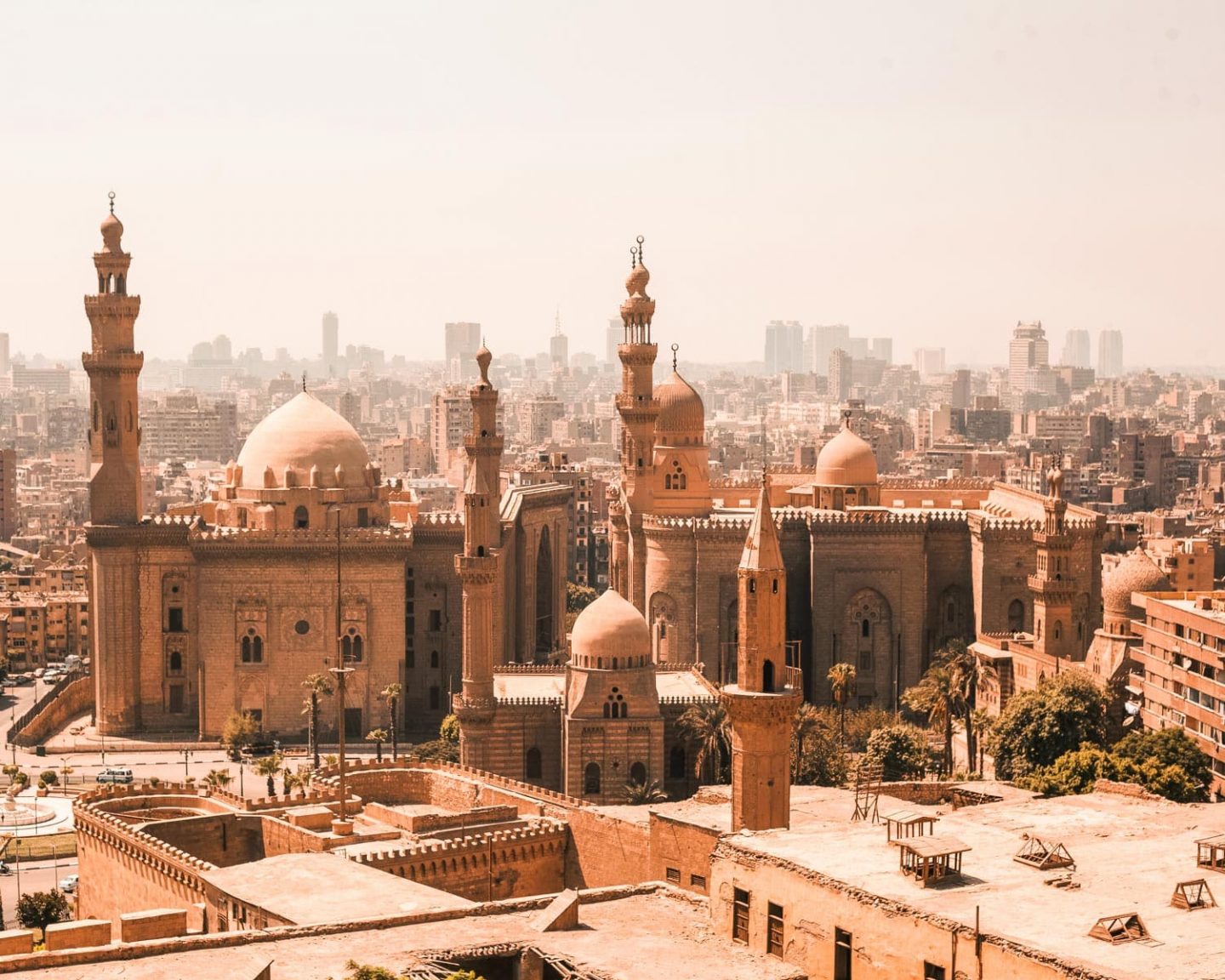
Budget travel and Egypt might not be the first thing that comes to mind when you think of this northern African country. But it’s one of the cheapest African countries for travellers .
Flights will be your biggest expense, but if you follow these airfare-saving tips , you might be able to score affordable return tickets from South Africa.
You can book a bed in a dorm room for as little as R114.00 ($7) per night, a first-class ticket on a train costs R200.00 ($13), and you can feast on local food for less than R50.00 ($3).
The best part?
The activities in Egypt aren’t crazy expensive.
You can visit the ancient pyramids for R100.00 ($6), and tours start at R235.00 ($15). Cruising down the Nile won’t bankrupt you either, and scuba diving in the Red Sea starts at R360.00 ($23) per dive.
Read More: 16 Unique Experiences You Need To Have in Africa
How Much Does a Trip to Egypt Cost?
- Dorm bed: From R114.00 ($7) per person per night
- Budget double room: R400.00 ($26) per night
- Three cheap meals: R210.00 ($14)
- Local transport: R34.00 – R50 ($2 – $4) for short taxi rides within the city centre
- Average Daily Budget: R400.00 – R800.00 ($26 – $52)
- Visa Requirements for South Africans: You need to apply for a visa in advance, but there is no cost involved unless you go through a service provider.
Check flights from South Africa | Browse hostel and hotel deals from Egypt
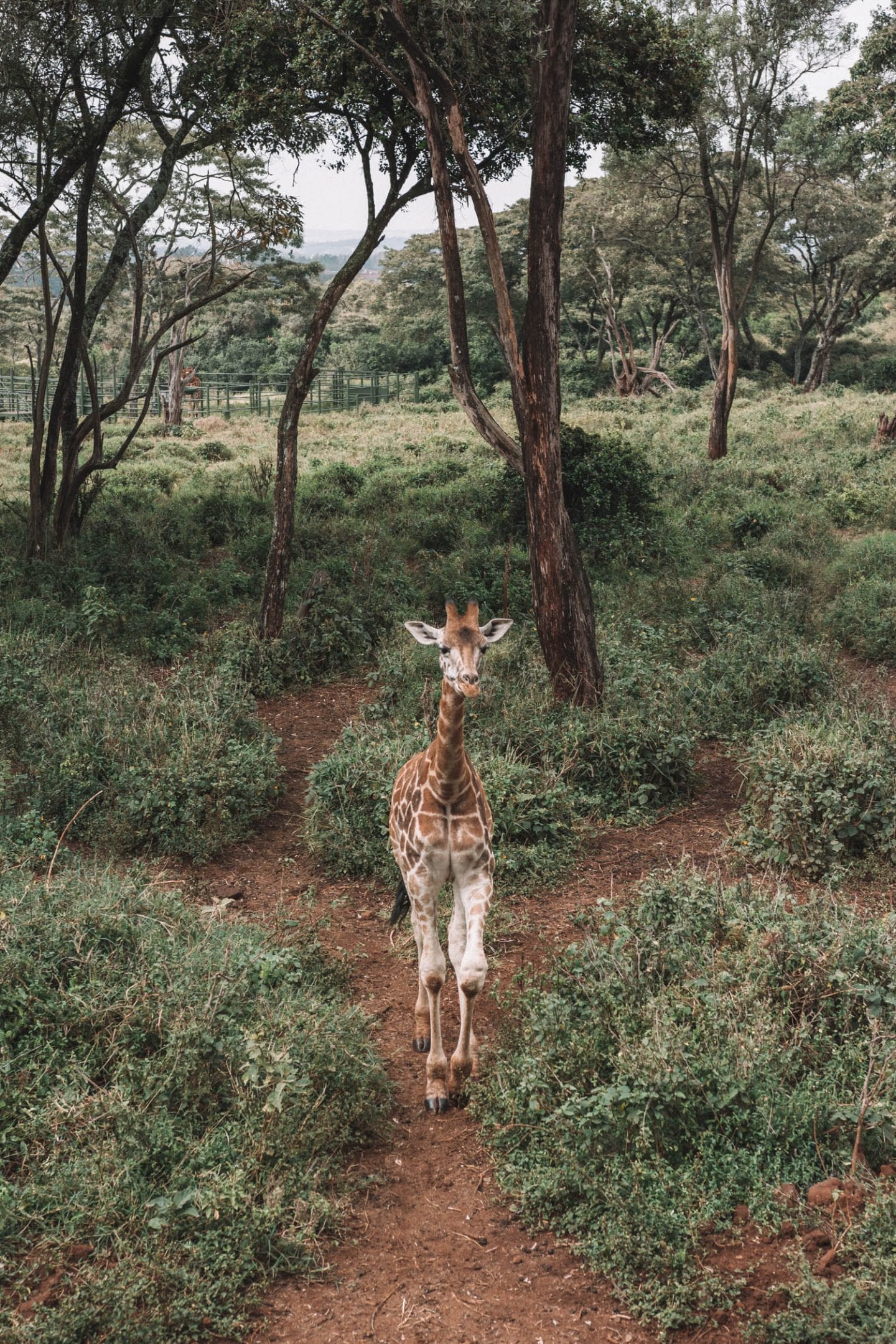
With incredible national parks, excellent museums and quirky sites – a trip to Nairobi , Kenya won’t disappoint those looking for a cheap Africa holiday destination .
The capital city has a delicious foodie scene and some incredible culinary experiences!
(Just be sure to budget a bit more if your stomach leads your travels).
Nairobi is a stone’s throw from many of Kenya’s top attractions. You can base yourself here and visit the famous Giraffe Manor, go on a safari or fly down to Diani Beach for the weekend for as little as R1600.00 ($104) return!
The most expensive thing you’ll need to pay for is a safari to the Masai Mara. To find the best deal, contact the backpackers near the park and plan a trip with friends.
If you’re travelling to Kenya solo, it’s not easy to find a good deal on safaris as the single supplement fee is quite high.
A 3-day/2-night safari usually costs around R6200.00 ($400) and includes accommodation, safari drives, guides, entrance fees and food.
Read More: How to Travel Kenya on a Budget
How Much Does a Trip to Kenya Cost?
- Dorm bed: From R250.00 ($16) per person per night
- Budget double room or apartment: From R350.00 ($22)
- Three cheap meals: R260.00 ($17) per day
- Local transport: R104.00 – R130.00 for short rides with Uber or R6.00 ($0.40) with a minibus taxi
- Average Daily Budget: R600.00 – R800.00 ($39 – $52)
- Visa Requirements for South Africans: Visa not required
Check flights from South Africa | Browse hostel and hotel deals from Kenya
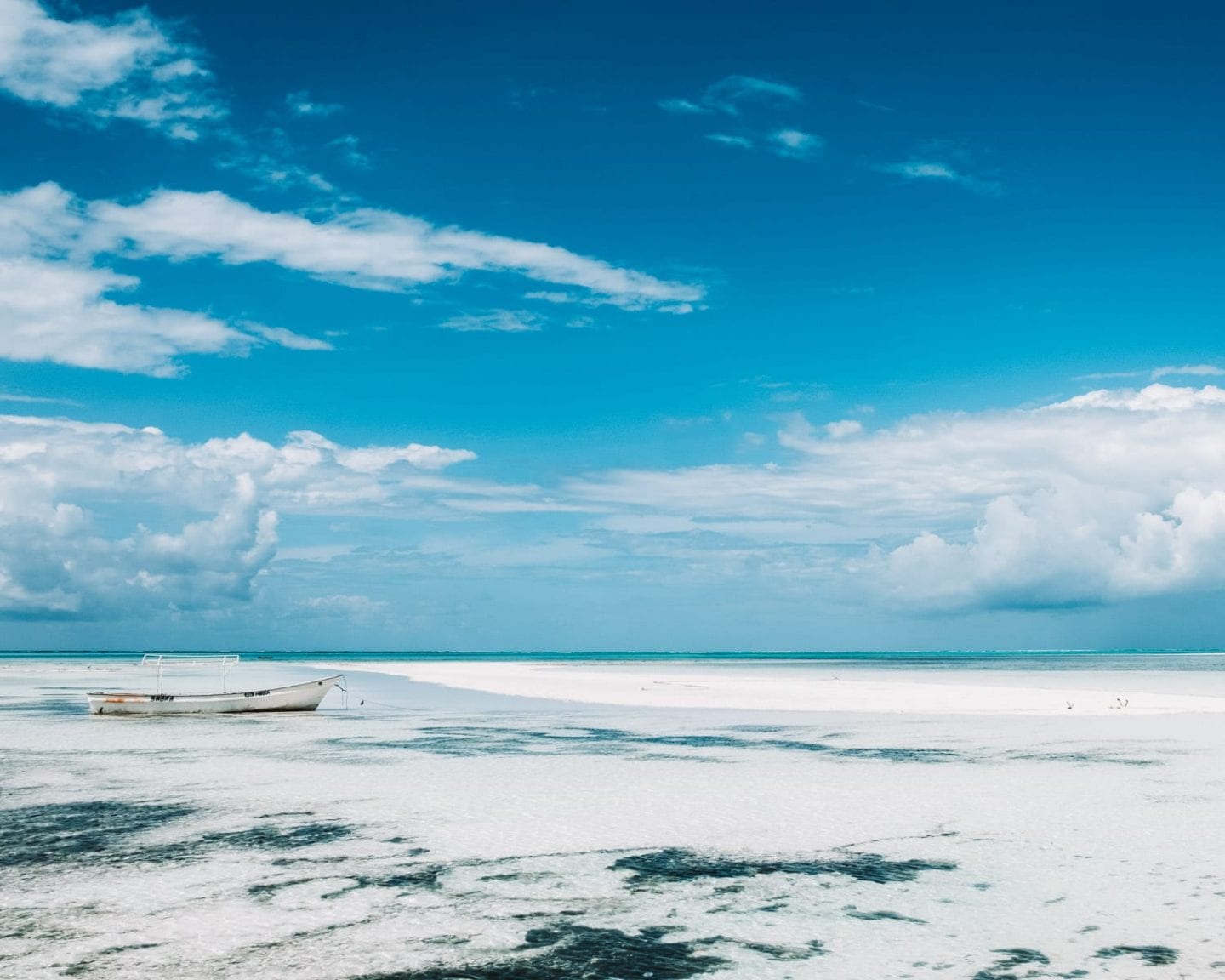
If you’re looking for a cheap holiday destination that has gorgeous beaches, look no further than Zanzibar, Tanzania!
Spend your days exploring this island’s past, rich culture, and some of the best beaches in the world.
Zanzibar’s Stone Town and Prison Island are not to be missed if you want to learn more about the island’s dark history in the slave trade and how that created its unique culture.
Or you can hop on over to Pemba Island and go snorkelling and diving!
Want an all-inclusive holiday on a budget in Zanzibar? You can often find package deals that include return flights from South Africa, a week-long all-include stay at a 4-star or 5-star resort.
How Much Does a Trip to Zanzibar Cost?
- Budget double room: From R500.00 ($32)
- Three cheap meals: R180.00 ($12) per day
- Local transport: R30.00 – R60.00 ($2 -$4) on shared taxis
Check flights from South Africa | Browse hostel and hotel deals from Zanzibar
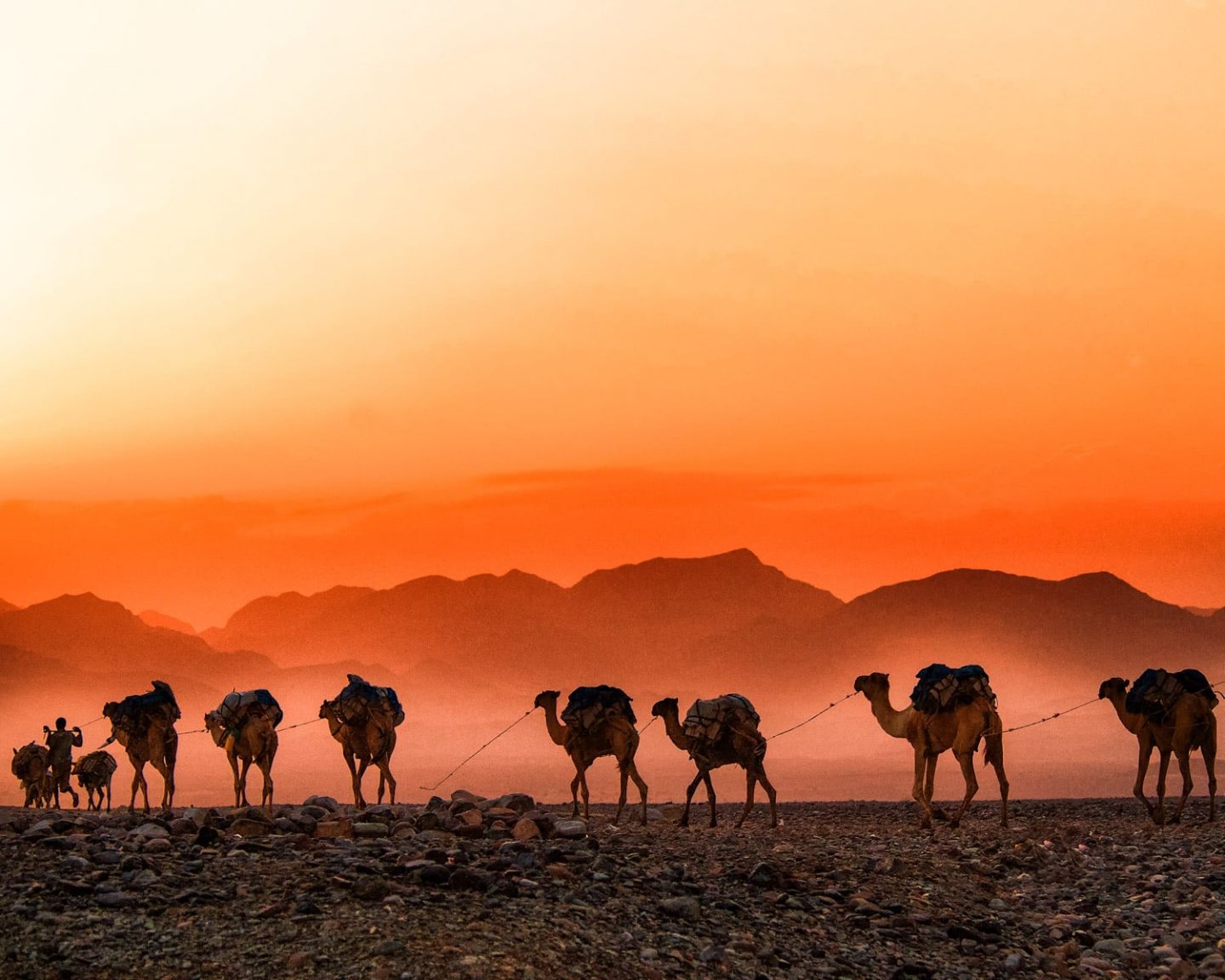
Ethiopia is a portal to another world.
It’s the gateway to an ancient place mixed in with its growing metropolis Addis Ababa. The capital city is now Africa’s fourth-largest, and it’s home to some of the country’s best museums and traditional food.
For vegan travellers, Ethiopia is heaven. More often than not, you don’t get to experience much of a country’s authentic dishes when you travel on a plant-based diet, but that’s not the case here.
Traditional dishes are meat and dairy-free, packed with flavour and substance that won’t leave you hungry!
When it comes to what to see in Ethiopia – the country is overflowing with unique adventures you won’t find anywhere else in Africa.
Stay in the Simien Mountains , visit the Danakil Depression , explore Ethiopia’s ancient capital Gondor, see Lalibela and spend an afternoon hanging around the country’s famous Gelada monkeys .
Money-Saving Tips:
- If you fly into Ethiopia with Ethiopian Airlines, you can save as much as 50% off domestic flights!
- Book your tours on the ground, and you can knock as much as $200 off the final price.
Read More: 50+ Genius Ways To Save Money for Travel
How Much Does a Trip to Ethiopia Cost?
- Budget double room: From R400.00 ($26)
- Three cheap meals: R220.00 ($14) per day at an inexpensive restaurant
- Local transport: R14.00 ($0.92) for a short taxi ride
- Average Daily Budget: R450.00 – R650.00 ($29 – $42)
- Visa Requirements for South Africans: Visa on arrival at $52 (R800.00).
Check flights from South Africa | Browse hostel and hotel deals from Ethiopia
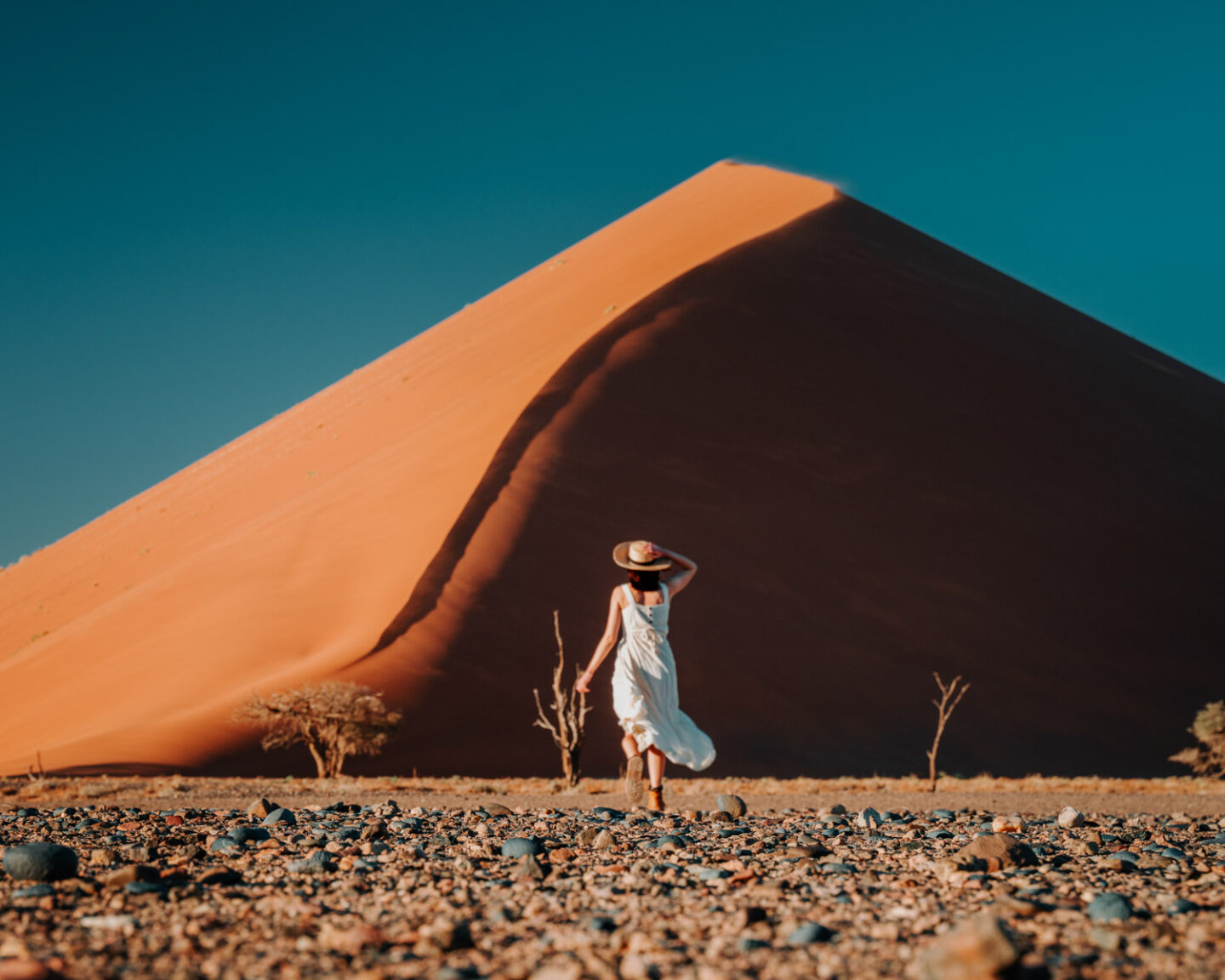
Namibia is the ultimate road trip destination in Africa!
Not only are return flights from South Africa super affordable, but it’s possible to camp your way through the country and see its highlights on a budget.
Due to the country’s vastness, you can’t base yourself in one area and go on day trips to attractions. For example, the capital city Windhoek is three to five hours from attractions like Etosha National Park, Swakopmund, Walvis Bay and Sossusvlei.
But what you’ll spend on car rental and petrol, you’ll make up with cheap accommodation.
Read More: An Incredible 10-Day Namibia Road Trip Itinerary
How Much Does a Trip to Namibia Cost?
- Dorm room: R170.00 ($10) per person per night
- Budget double room: R400.00 – R600.00 ($25-$38) per night
- Three cheap meals: R150.00 – R200.00 ($9 – $12) if you cook your own food
- Local transport: R200.00 ($12) if you need to use local transport for short trips
- Average Daily Budget: R400.00 – R800.00 ($25 – $50) excluding car rental costs and petrol
Check flights from South Africa | Browse hostel and hotel deals for Namibia

Livingstone in Zambia is the perfect base for exploring Victoria Falls and adventure lovers.
You’ll be only 11 km away from the mighty Zambezi and in prime position to see the falls from above or wrestle its currents.
It’s also one of the cheapest countries to visit in Africa , especially compared to prices on the Zimbabwean side. It’s Zambia’s backpacking mecca making it possible to splurge on big-ticket items like the Devil’s Pool.
Looking for the ultimate safari destination on a budget? Head to South Luangwa National Park .
You’ll need to hire a car or fly in to get there – but it’s worth it. There are budget accommodation options right outside the park ranging from camping, dorm rooms or budget double rooms.
Entrance to the park is around R630.00 ($40) per person per day – which is steep, I know.
But, South Luangwa is famous for having the largest leopard population in Africa, and it’s the home of the walking safari.
Read More: A Quick Guide to Victoria Falls: Everything You Need To Know
How Much Does a Trip to Zambia Cost?
- Dorm rooms: R240.00 ($15) per person per night
- Budget double room: R500.00 ($32) per night
- Three cheap meals: R200.00 ($12) per day
- Local transport: Livingstone is small enough that you can walk, but a taxi to Victoria Falls costs R230.00 ($15) each way
- Average Daily Budget: R440.00 – R700.00 ($28-$44), excluding transport to Vic Falls
Check flights from South Africa | Browse hostel and hotel deals for Zambia
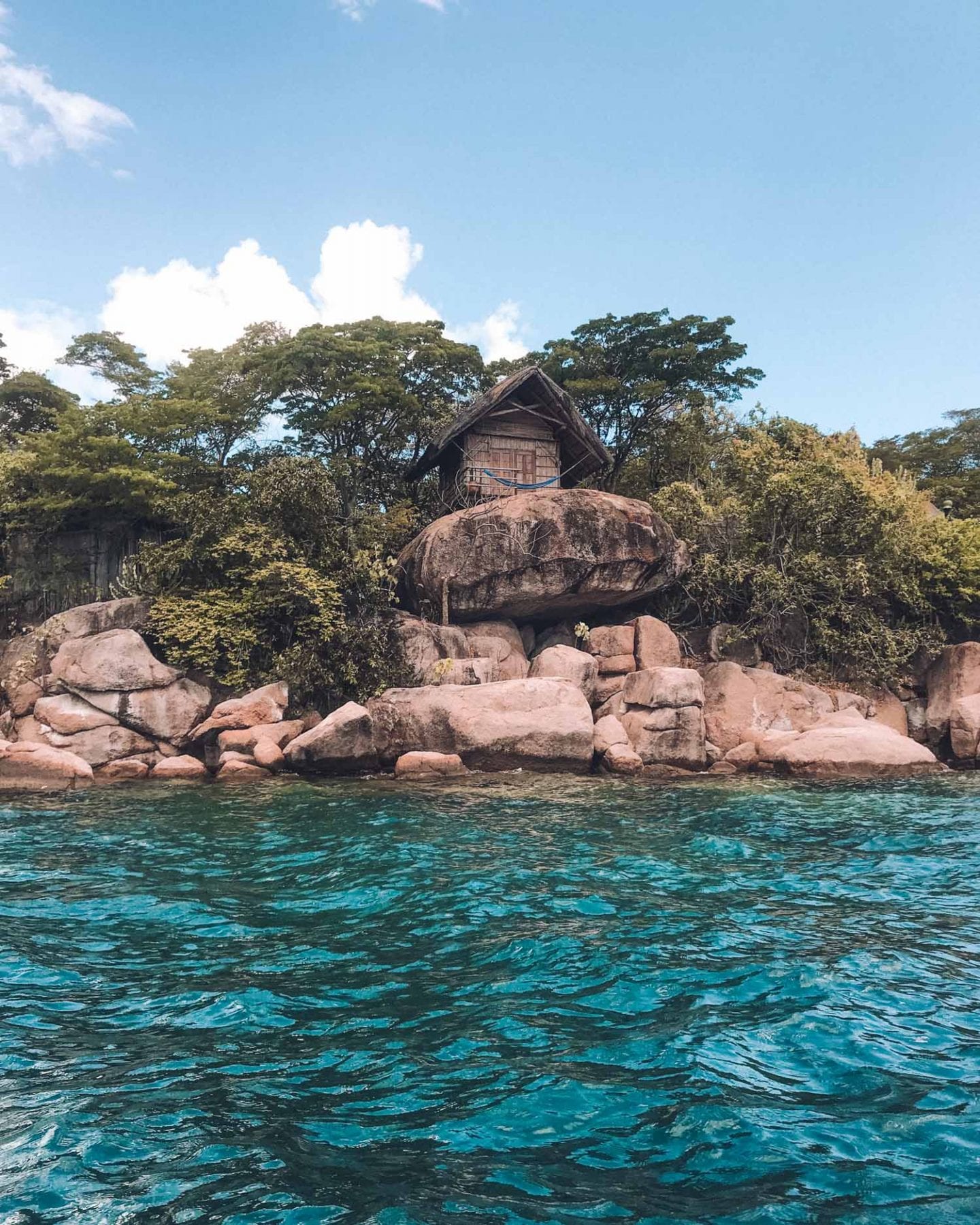
I visited Malawi for my 29th birthday, and I’d go back in a heartbeat.
For 7 days, I called Mumbo Island my home. It’s an uninhabited island in the middle of Lake Malawi, and it’s considered one of the top eco-lodges in the world.
You would think that means you’d have to drop some serious $$$ to stay there, right?
Mumbo Island has incredible all-inclusive packages, which include flights from South Africa and discounts for fellow Africans.
If you’re not looking for something more backpacker-friendly, Malawi delivers.
Go scuba diving for R700.00 ($45) per dive, hike to the summit of Lake Mulanje or attend the iconic Lake of Stars music festival.
While Malawi isn’t a safari destination, you can easily hire a car or join a group tour and hop the border over to Zambia’s world-renowned South Luangwa National Park .
Read More: What It’s Like Staying on Mumbo Island in Malawi
How Much Does a Trip to Malawi Cost?
- Dorm bed: R200.00 ($12) per person per night
- Budget double room: From R500.00 ($31.90)
- Three cheap meals: R300.00 ($19) per day
- Local transport: R370.00 ($23) for a taxi ride
- Average Daily Budget: R870.00 – R1170.00 ($55 – $75)
Check flights from South Africa | Browse hostel and hotel deals for Malawi
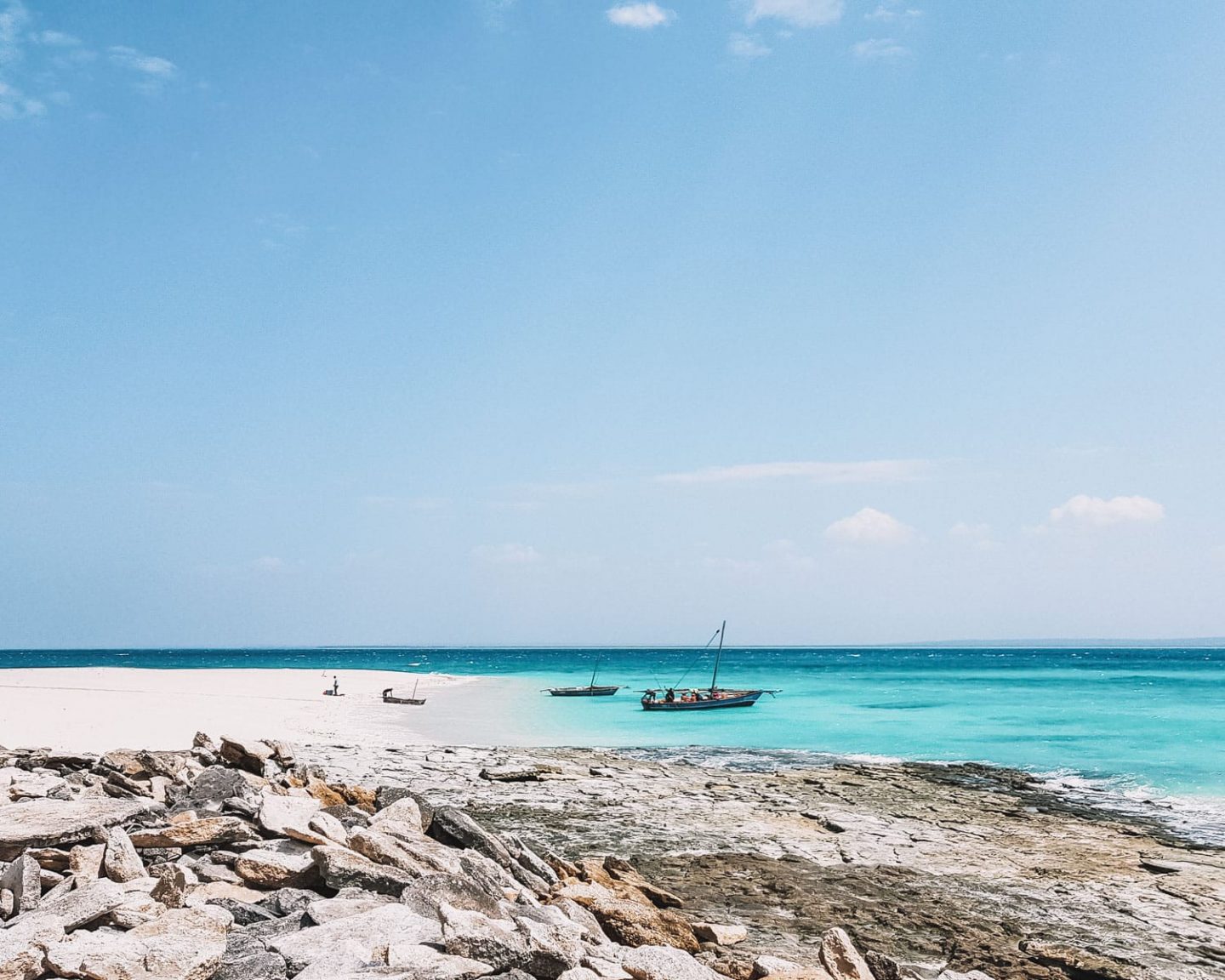
Mozambique was the first African country I travelled to way back in 2015. 40+ countries later, and it’s still one of my favourite budget destinations.
For adventure travellers, it has so much to offer!
Go diving with dugongs and dolphins for R630.00 ($40) with equipment rental, or spend a few hours snorkelling in the ocean with whale sharks for the same price.
Plus, you don’t need to hire a car to explore Mozambique. There are local buses running from Maputo to Tofo for as little as R80.00 ($5), and short tuk-tuk rides cost even less.
You’ll have more than enough room in your budget for all the adventure activities with cheap eats and dorm rooms in abundance.
Read More: How to Travel to Mozambique on a Budget From South Africa
How Much Does a Trip to Mozambique Cost?
- Dorm bed: R160.00 ($10) per person per night
- Budget double room: From R500 ($31) per night
- T hree cheap meals: R100.00 – R300.00 ($6 – $19)
- Local transport : Three tuk-tuk rides are R80.00 ($5)
- Average Daily Budget : R400.00 – R800.00 ($25 – $50)
Check flights from South Africa | Browse hostel and hotel deals for Mozambique

For those looking to escape to the desert and explore the beautiful architecture that Morocco is known for, head to Marrakech. With Morocco trending as a destination on Instagram, its affordability adds to its picture-perfect charm.
Hostels boast rooms starting at R200.00 ($12) a night , and you’ll get to experience Morocco without breaking the bank.
Plus, there’s plenty to see without spending a dime. Head to Medina, and stroll around the old buildings and monuments while making pit stops at the Koutoubia Mosque, Saadian Tombs and soaking up the city’s vibrant nightlife.
Dine on cheap local food for R30.00 -R50.00 ($2-$3) and book a train ride to far-flung destinations like Fes, Casablanca or the blue city of Chefchaoen.
The things that will drain your budget are activities like camping in the Sahara Desert or climbing the Atlas Mountains.
But if you eat local, use public transportation, keep your accommodation costs low, and haggle, it’s possible to afford trips to these iconic attractions.
How Much Does a Trip to Morocco Cost?
- Budget double room: From R600.00 ($38)
- Three cheap meals: R300.00 per day ($20)
- Local transport: R31.00 ($2) for a short taxi trip around town
- Average Daily Budget: R560.00 – R1,000.00 ($35 – $63)
- Visa Requirements for South Africans: A visa is required and obtained at the embassy in Pretoria. It costs R327.00 for a single entry.
Check flights from South Africa | Browse hostel and hotel deals for Morocco
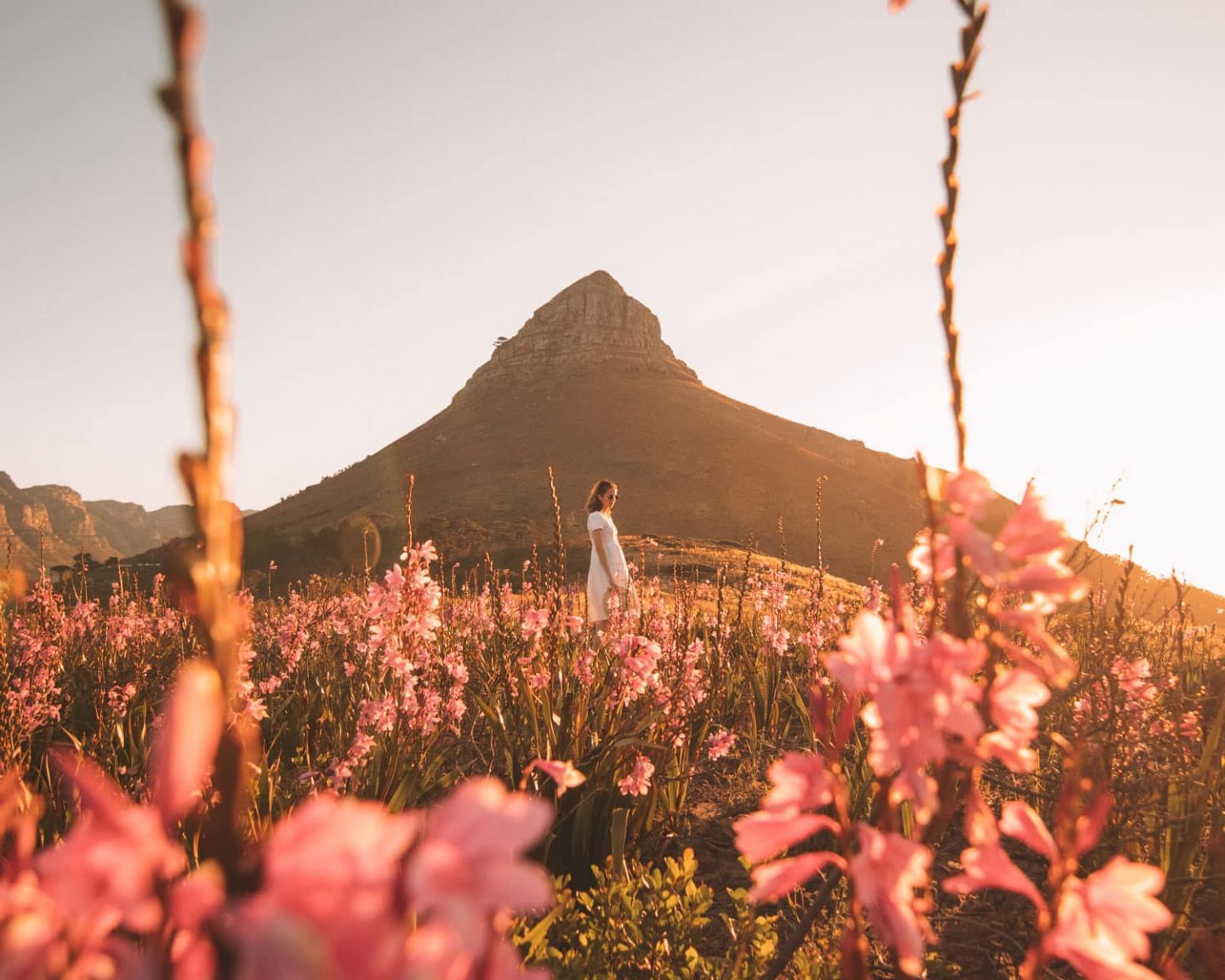
For locals and international travellers alike, South Africa is an affordable destination to explore with so much to offer!
You can hire a car and make your way from Cape Town to the Garden Route (one of the most scenic road trips in the country), go on safari in Kruger National Park , and camp on top of the highest waterfall in Africa .
Or you can explore the Cape Winelands and sip on award-winning vintages for as little as R80.00 ($5) per tasting.
Want to escape the other tourists? Head up to the Wild Coast and explore gems like Coffee Bay, Port St. Johns and Hogsback.
While Cape Town is the most expensive city to visit, there are plenty of backpackers, budget hotels and things to do for FREE .
How Much Does a Trip to South Africa Cost?
- Dorm bed: From R200.00 ($12) per person per night
- Three cheap meals: R240.00 per day ($15)
- Local transport: R80 ($5) for a short Uber trip in Cape Town
- Average Daily Budget: R600.00 – R1,000.00 ($38 – $63)
Check flights to South Africa
Read More: The Ultimate South Africa Bucket List: 40+ Amazing Places to Visit
Hopefully, Africa no longer seems like an expensive destination, and you’ve opened up a few more slots on your bucket list.
Did I leave any cheap African countries off this list?
Want more African travel inspiration? Check out these other posts:
- 12 Best Visa-Free Countries for South Africans to Visit
- 100 of the Best Places to Visit in Africa
- 16 Unique Experiences You Need To Have in Africa
- 50+ Genius Ways To Save Money for Travel
- Top Romantic Getaways in South Africa
- How to Travel Kenya on a Budget
Did you find this post useful? Save it for later on Pinterest!
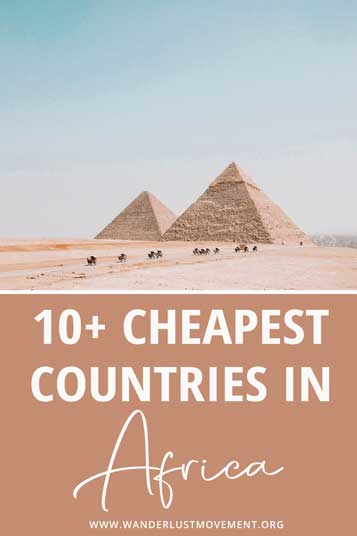
About Lauren Melnick
Lauren Melnick is the founder of Wanderlust Movement, Wander to Here and is a South Africa travel blogger. She's been travelling the world as a full-time freelance writer since 2016 and has visited over 40 countries.
When she isn't typing up a storm, you can find her conquering overnight hikes around the Western Cape, rock climbing, and hosting sold out group travel trips around South Africa, Namibia and Morocco.
Reader Interactions
October 18, 2017 at 10:12 am
This is an insightful article! I’m looking to travel more in Africa, so this will definitely help me. Thanks Lauren!
October 22, 2017 at 12:43 pm
Thanks Selam! Hope you make some great memories here 🙂
March 13, 2018 at 8:57 am
Very interesting and helpful! I was just wondering what monetary unit you are using in the budgets? Thank you!
March 13, 2018 at 10:08 am
South African Rands and US dollars.
March 18, 2018 at 1:11 am
One thing I will say about Rwanda is that the gorilla permits are in fact expensive. The most expensive between the three countries to see the Mountain gorillas. Uganda is less and has almost a guarantee of seeing them at Bwindi and Virunga has a pretty good success rate and is even less.
March 18, 2018 at 3:39 am
True. I did the Dian Fossey hike in Rwanda and managed to see three gorillas on the way back down 🙂 But I’d love to go and do gorilla trekking on the Congo side and hike their volcano one day. They are even cheaper than Uganda and there’s a tour company that runs pickups from Kigali International Airport. It’s on my bucket list!
March 15, 2019 at 1:10 pm
Excuse me, I really don’t understand the currency used here, can someone help me? is it $ or what? “Dorm bed: R 157.00 per person per night”
March 16, 2019 at 10:58 am
Hey! It’s in South African Rands 🙂
May 11, 2020 at 5:11 pm
I just discovered your page. Thank you so much! This is extremely informative. I’d love to travel around Africa first since I’m South African. This is so helpful and makes one excited.
May 12, 2020 at 2:37 pm
Hey Faith! I’m so glad you like the post and it’s inspired you to explore our amazing continent 🙂
April 17, 2021 at 7:09 am
YOu will be staying really really low end places in Kenya if you budget that much. No anywhere I’d particularly want to sleep
April 17, 2021 at 1:44 pm
Yeah, that’s the point lol 😅 that was kinda my vibe when I wrote this and was backpacking on a super tight budget. If it meant spending the least amount of money, I’d sleep there or couchsurfing. That was even better because it was free!
November 24, 2021 at 10:16 am
I think Botswana is also one of cheap African country to visit.
August 18, 2023 at 2:57 pm
I would love to visit Egypt however, I need a travel buddy that can foot their own bill you know. A lady especially. My dream destination for years.
August 19, 2023 at 10:12 am
Go on a group tour babe 🙂 solves that problem easy-peasy.
Leave a Reply Cancel reply
Your email address will not be published. Required fields are marked *
This site uses Akismet to reduce spam. Learn how your comment data is processed .
- PRO Courses Guides New Tech Help Pro Expert Videos About wikiHow Pro Upgrade Sign In
- EDIT Edit this Article
- EXPLORE Tech Help Pro About Us Random Article Quizzes Request a New Article Community Dashboard This Or That Game Popular Categories Arts and Entertainment Artwork Books Movies Computers and Electronics Computers Phone Skills Technology Hacks Health Men's Health Mental Health Women's Health Relationships Dating Love Relationship Issues Hobbies and Crafts Crafts Drawing Games Education & Communication Communication Skills Personal Development Studying Personal Care and Style Fashion Hair Care Personal Hygiene Youth Personal Care School Stuff Dating All Categories Arts and Entertainment Finance and Business Home and Garden Relationship Quizzes Cars & Other Vehicles Food and Entertaining Personal Care and Style Sports and Fitness Computers and Electronics Health Pets and Animals Travel Education & Communication Hobbies and Crafts Philosophy and Religion Work World Family Life Holidays and Traditions Relationships Youth
- Browse Articles
- Learn Something New
- Quizzes Hot
- This Or That Game
- Train Your Brain
- Explore More
- Support wikiHow
- About wikiHow
- Log in / Sign up
- Budget Travel
How to Travel to Africa on a Budget
Last Updated: February 13, 2024 References
This article was co-authored by Stef Katz and by wikiHow staff writer, Jessica Gibson . Stef Katz is a Travel Agent and the Founder of The Travel Superhero. She has helped clients enjoy convenience, access, personal attention, and ease in their travel planning for 6 years. Stef specializes in elevated social travel and finds ways to bring peace of mind to her travelers with open communication, genuine care, and professional support. She holds an Associate's Degree in Liberal Arts from Miami Dade College and a Bachelor's Degree in Marketing from the University of Florida, as well as numerous certifications with destinations, tour companies, and cruise lines in the travel industry. There are 15 references cited in this article, which can be found at the bottom of the page. This article has been viewed 29,571 times.
Vacationing in Africa has a reputation for being expensive, but it doesn't have to be! It's totally possible to book an affordable flight. From there, you can save on lodging and meals, especially if you're not afraid to backpack or eat local cuisine. We'll give you some tricks and travel hacks so you can enjoy Africa even on a tight budget.
Travel during the off-season.

- Yes, the off-season is hotter and wetter than the peak tourist season, but the rain is usually brief. To deal with the temperature, pack loose clothes that are made of breathable fabric.
- By some estimates, you could save 20% to 40% on travel expenses by traveling during the off-season. This makes it one of the most effective ways to stick to a budget!
Check out the cheapest African destinations.

- Kigali, Rwanda
- Cairo, Egypt
- Addis Ababa, Ethiopia
- Cape Coast, Ghana
- Livingstone, Zambia
- Marrakech, Morocco
- Dakar, Senegal
Find a budget airline that flies to Africa.

- Keep in mind that cheaper flights will probably have more than one stop.
- The site might show flights with budget airlines like Kulula, Fastjet, Mango, Flysafair, Fly540, JamboJet, Dana Air, Flydubai, or Skywise.
Take local transit to get around your destination.

- If you're traveling in Kenya, look for matutus. These vibrant private minibuses cover short and long distances within the country.
- To get between countries, look into riding the train. A second-class fare usually costs around the same as a similar bus fare. [4] X Research source
Camp or stay in a hostel to save money on accommodations.

- Budget hotels are also a great option if you book in advance. Use an aggregator website that searches for hotels at your destination, then ranks them by cost.
- For example, a South African hostel in the Nqileni Village runs around $10 and includes village visits, canoeing, breakfast, and other great amenities.
- If you'd rather backpack and camp, you've got tons of options. You could camp in Kenya's Hell's Gate National Park for around $70 or camp in Namibia's Naukluft National Park for about $26.
- Be careful with places that seem too cheap or shady. It's important to read up a lot about the location you plan on staying beforehand.
Sign up with a volunteer program in exchange for cheap accommodations.

- For instance, you might do community development in Tanzania for a cost of $200 USD a week or you may give musical instructions to kids in Ghana for around $650 USD a week.
- You're sure to find a program that caters to your interests. There are volunteer opportunities for sports coaching, AIDS prevention, wildlife refuges, shark conservation, and more!
Make your own food or shop at local markets.

- Avoid shopping at expat-owned supermarkets. They usually charge a premium. Instead, get the basics where the locals shop.
- Check to see if your accommodations offer meals. You might be able to eat a filling breakfast and make do with snacks later in the day. Some accommodations might also offer inexpensive dinners.
- The Centers for Disease Control recommends that you avoid drinking tap or well water while in Africa. Stick to bottled water or water that's been disinfected. [8] X Research source
- Be careful when accepting drinks from strangers. Always go for bottled drinks that are opened in front of you.
Buy a SIM card to avoid roaming fees.

- If your plan has a limit, keep track of how much data you use, so you're not surprised with charges on your next bill.
- ATM fees are another way to break your budget. If you use ATMs in Africa, you'll most likely be charged high international fees for withdrawing cash. Plus, you can't assume that you'll be able to easily find one!
Develop your haggling skills.

- Remember, be polite and have fun! Haggling in the market will be a memory you take back with you—especially if you make it fun or make a connection with someone.
Look for affordable safaris.

- For instance, a luxury safari could cost you hundreds of dollars or even thousands if you have to rent a private vehicle. By comparison, you could stay do a safari out of South Africa's Kruger National Park for $70 a night.
Visit free or inexpensive parks.

- Depending on where you're traveling, you may be able to spend time at a breathtaking beach. Check out Wimbi Beach in Mozambique or Grand Baie Public Beach in Mauritius for instance.
- If you love elephants, be sure to visit Chobe National Park which is known as the elephant capital of Africa! The entry fee is only $13.
- Want to see Mt. Kilimanjaro? Skip Kilimanjaro National Park which costs $70 a day and see the volcano from Amboseli National Park for half the price.
Plan activities that don't cost you money.

- For example, spend an afternoon walking around Morocco's famous markets in Fez, or enjoy the sounds of street musicians playing in Cape Town. [14] X Research source
Expert Q&A

- You might experience people shouting at you as soon as you get out of a bus or taxi. These people are called touts and they're usually trying to sell you something or offer a service. Don't let them give you things or take you around for a tour since they will expect you to pay—usually more than it's worth. Firmly say "no" and walk away. [15] X Research source Thanks Helpful 0 Not Helpful 0
- Have physical and online copies of all your documents at all times. This is important so you don't face any problems in case you lose anything during your trip. Thanks Helpful 0 Not Helpful 0
- The first thing you should do is decide what's the experience you're looking for. Is it a guided tour with an opportunity to make lifelong friends or just a quick trip with your traveling partners? After answering this and figuring out your schedule, work with a traveling agent to find what you want in your budget—or the closest thing possible, if your budget is not high enough. Thanks Helpful 0 Not Helpful 0

- If traveling by yourself, make sure to activate the location services on your cell phone and share it with someone you trust, like a partner or a close family member. Thanks Helpful 0 Not Helpful 0
You Might Also Like

- ↑ https://ntabaafrica.com/east-africa-safari-off-season/
- ↑ https://travelnoire.com/10-cheap-tourist-destination-africa
- ↑ https://www.expatarrivals.com/africa/kenya/transport-and-driving-kenya
- ↑ https://www.lonelyplanet.com/africa/narratives/practical-information/transport/getting-around/train
- ↑ https://www.theguardian.com/travel/2016/jan/20/top-10-backpacker-lodges-south-africa-eastern-cape
- ↑ https://www.volunteerforever.com/article_post/cheap-affordable-volunteer-abroad-programs-low-cost-overseas-projects/
- ↑ https://www.nationalgeographic.com/traveler/extras/planner/africa/budget.html
- ↑ https://wwwnc.cdc.gov/travel/destinations/traveler/none/south-africa
- ↑ https://umabroad.umn.edu/resources/travel/electronics
- ↑ http://hipafrica.com/features/the-art-of-haggling/
- ↑ https://www.travelandleisure.com/trip-ideas/safaris/ten-amazing-affordable-safaris
- ↑ https://national-parks.org/africa
- ↑ https://www.victoriafalls-guide.net/victoria-falls-entrance.html
- ↑ https://www.fodors.com/news/trip-ideas/how-to-fly-business-class-to-africa-for-the-price-of-an-economy-ticket
- ↑ https://www.worldnomads.com/travel-safety/africa/tanzania/dealing-with-touts-in-tanzania
About This Article

- Send fan mail to authors
Did this article help you?

Featured Articles

Trending Articles

Watch Articles

- Terms of Use
- Privacy Policy
- Do Not Sell or Share My Info
- Not Selling Info
Get all the best how-tos!
Sign up for wikiHow's weekly email newsletter

Tips and tricks for travelling in Africa
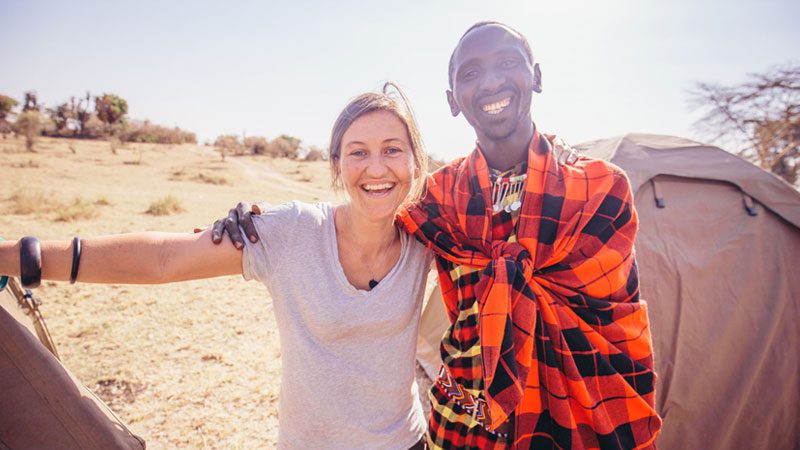
You’ve finally taken the plunge and booked that ticket for an epic African adventure, you’ve planned a rough itinerary, picked your safari, and soon you’ll be on your way – hooray!
From the incredible natural environment to the rich cultural history, the friendly locals to the vibrant markets, Africa has everything, sometimes all at once. There’s just something about this fascinating continent that pulls you in and keeps you wanting to return over and over again. But there’s no denying that it can also be a daunting place to travel for even the hardiest of explorers!
We recently spent 4 months travelling through southern and central Africa , and we compiled all the things we either learnt along the way (through misfortune or trial and error!), or wish we’d known before we left for you, so you can focus on having the stress-free African adventure of your dreams!
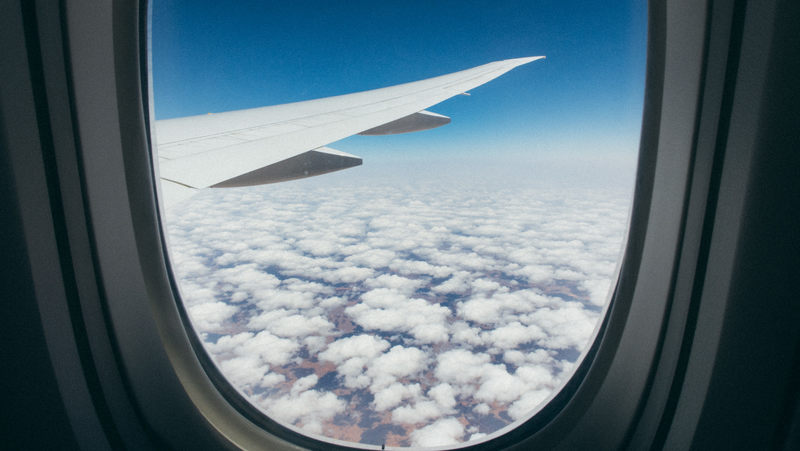
How to speak the language
If you’re worried you’re going to get stuck at the airport in Tanzania forever because you can’t direct your taxi driver in fluent swahili, stay calm.
You’ll be mighty relieved to discover that despite the 1,500-2,000 local languages spoken in Africa , English is actually an official language in many countries (along with German or French in a few countries!).
Don’t miss out by being lazy and relying solely on English though; learn some key phrases. The locals will appreciate it and you’ll have a much richer experience for it – like the time a friendly Malawian fruit stall owner threw in a few extra pieces because we attempted our best Chichewa with him!
What the locals are like
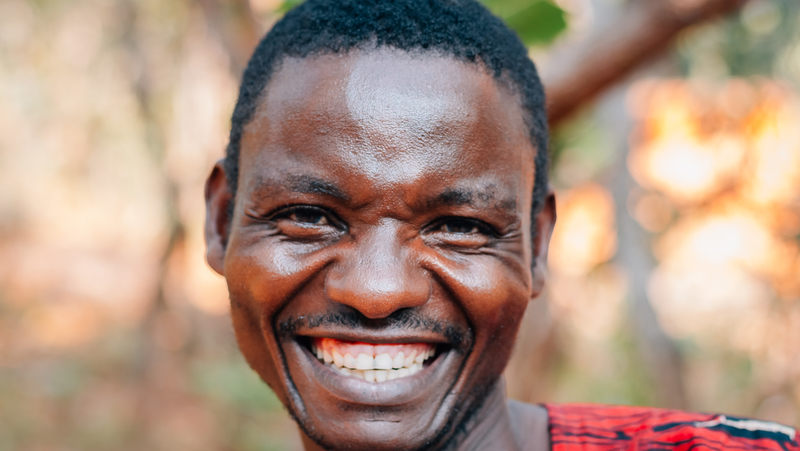
Forget what you’ve seen in the movies; collectively, Africans are some of the friendliest people on the planet. It’s common to be greeted with a huge smile and hello, and most are keen to learn your name, where you’re from and why you’re visiting.
You’ll probably encounter the phrase ‘Mzungu’ being thrown your way – often by locals smiling as they wave out of car windows or pass you on the street. The literal translation from Swahili is ‘person who wanders without purpose’, though these days it’s used to describe any white foreigner. It’s mostly said in a friendly, joking way – so try not to take offence.
It’s also important to remember that Africa as a whole is very religious (Christianity and Islam are widely practiced) and quite conservative so be respectful of this in your speech and dress.
How to avoid border hassles
Unfortunately corrupt border processes are one aspect of African travel that can be seriously frustrating for travellers.
Most of the time you’ll pass with no issue, other times you may have to wait hours for your passport to be processed without explanation, or be asked to pay a corrupt official a bribe. Then there are the touts offering to exchange your money at rates that are totally ridiculous, or trying to sell you anything from bangles to samosas (side note: always buy the samosas, guys).
Thankfully, we managed to make it through eight different border controls with minimal hassle, and you can too, by following these tips:
- Be informed: Know your visa requirements before visiting any country in Africa. Get in touch with your local embassy before travelling, or pay a visit to Project Visa for answers to all your visa-related questions.
- Be organised: While you can get most visas at the individual points of entry, arranging them ahead of time saves a tonne of hassle (and sometimes, money!) later.
- Be money smart: Always carry spare US dollars just in case. If you need to change money on the border, always know the exchange rate before you get there and bargain hard.
- Be stubborn – if someone looks like they’re deliberately holding things up to make you pay to “rush it through” firmly (and politely!) ask to have your passport back. If you’re certain that your visa meets all the requirements but you’re being asked to pay more to get it approved, decline and ask to speak to another official.
- Above all else: approach the process with a smile and have a laugh. It’s easier that way!
How to travel around
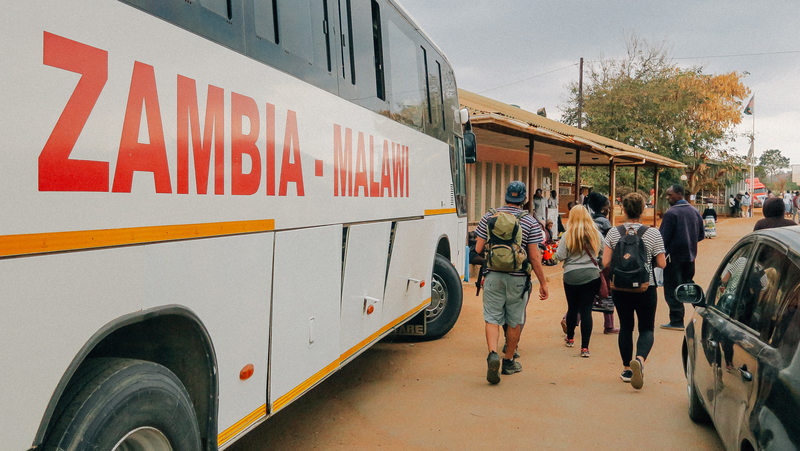
One of the best things about travelling in Africa is no matter where you are or where you want to go, getting from A-to-B is always possible. How you get from A-B however, is another story altogether.
Taxis, tuk tuks, mopeds, rickshaws, you name it… If it has wheels and appears capable of travelling some distance, you can probably travel on it. You might find yourself sitting on a flight or bus, crammed into a local mini bus with 25 other people (and the odd goat or chicken!), or hitching a ride in the back of a pick-up with half a village heading home from the markets.
For the record: travelling by mini-bus is an African rite of passage and we totally recommend embracing the uncomfortable seat and cramped conditions for this insight to how the locals live!
For a journey you can relax into, our tips are:
- Always travel by day. Always.
- Always wear your seatbelt
- Don’t expect to leave or arrive on time – things run on Africa time here!
- You may, or may not, get a seat. You may sit in the aisle of the bus for 5 hours with a chicken pecking at your head. Roll with it – it’s all part of the adventure!
- For most mini bus journeys, you can negotiate your fare
- Never pay a “bag storage fee” on large buses. It’s a scam – your ticket price includes your baggage.
Accommodation
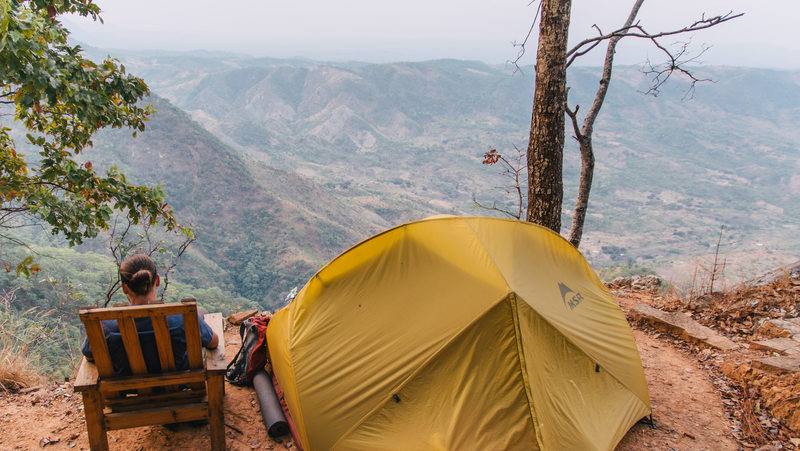
From tailor-made luxury safari tents where you can live like Prince Harry, through to your standard backpacker dorms where snore-proof earplugs are a must – the options of where to lay your head in Africa are many and varied.
Many travellers actually choose to camp their way through Africa (we often did!), because the camping facilities are accessible, safe, full of good amenities, and super cheap. Plus, what better way to make new friends than by sitting round the campfire swapping stories about your day?!
Larger cities have all the usual accommodation options, the further into the countryside you venture, the less options are available. Don’t fear though, you’ll ALWAYS find somewhere to rest up after a hard day’s adventuring!
Things to consider:
- Always book accommodation well in advance during peak season (May – October). Places like Namibia are extremely popular, with very limited accommodation in desert areas.
- Use guide books, online reviews or local recommendations. Does it get good reviews?!
- Does your accommodation have a safe, lockers or locks?
- Is there a night watchman/security to make sure you and your belongings are safe overnight?
How to stay healthy
Medication & health : Check with your GP about what vaccinations and medication you’ll need before you depart.
Hot tip: Most countries require Yellow Fever vaccination proof just to enter the country.
We also packed the following to keep us fighting adventure-fit on the road:
- Anti malarial medication
- Antibiotics
- Painkillers
- Antihistamine
- Iodine tablets
- Hydrocortisone cream
- Insect repellent: DEET is your new best friend!
* Sadly, though the lakes in Africa look inviting, many are home to a horrible parasite called Bilharzia. We’re not in the business of horror stories, so we’ll leave you to investigate the delights of that one yourself – but you DO NOT want to get it. Always check with locals before taking the plunge.
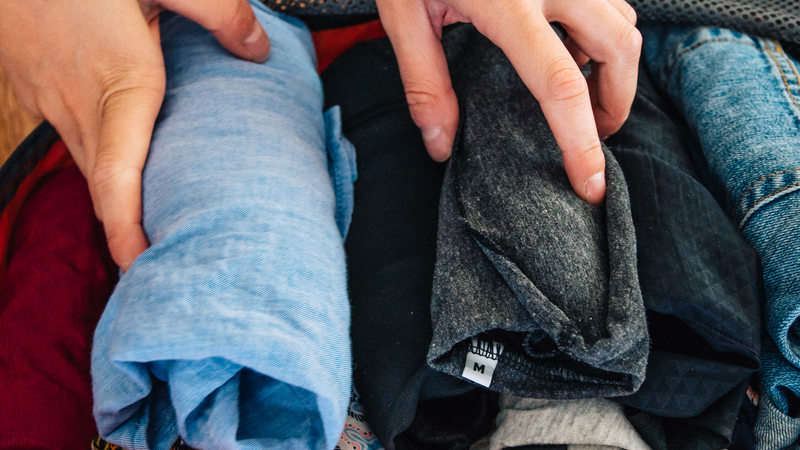
Water: There’s a pretty common misconception that there’s no clean drinking water in Africa, but we’re here to tell you it is possible to drink water straight from the tap in South Africa, Namibia, and parts of Zambia and Botswana. Head north and you’ll need to be cautious, but carry iodine tablets and you’ll be fine!
Food: All you really need to know is that food in Africa is delicious. It’s also mostly high quality – though perhaps avoid meat in remote areas due to a lack of proper refrigeration.
How to stay safe
We actually felt more safe in African countries than we did in other regions of the world we’ve visited. However, as always it pays to do your research before you go.
Keep the following in mind and you’ll have a stress-free trip!
- Leave the flashy jewelry and designer labels at home – they’re not practical, and make you a target instantly.
- Wear a money belt OR only take a day’s worth of cash out with you.
- When taking money out at an ATM, be aware of your surroundings. If something seems suspicious, move along quickly.
- We’re photographers, which means we always travel with big cameras and even bigger lenses. But you’d never know, because they’re safely locked away in our bags till needed. Don’t make yourself a target by waving yours around!
- Don’t walk the streets at night by yourself, especially in larger cities or towns. If you’re out late, take a taxi or Uber, every time.
- Pickpockets exist here as they do everywhere, so if you’re visiting markets, bazaars, train or bus stations be extra careful.
Going it alone
Africa is a wonderful place to travel solo. If you’re open, you can have wonderfully rich experiences while meeting incredible people. You’ll also find that it’s pretty safe – any dangers that exist for both males and females are pretty the same as anywhere else you’d travel to.
Where possible, follow these tips and you should have no issues:
- Be cautious when travelling to remote regions
- Don’t travel alone at night
- Register your travel plans with your government
- Keep in regular contact with members at home
Money matters
Africa isn’t a cheap holiday by any stretch – generally the daily costs for a traveller are much higher than in Asia or even South America.
Budget around $100USD per day per person for transport, accommodation and food. Safaris and adventure activities bump up the cost substantially, so you’ll need to allocate more for those.
There are 54 currencies in Africa, so things can get tricky if you’re travelling to multiple countries. Here are a few tips to handle it all:
- Most southern African countries have ATM’s or credit card facilities. If not, it’s best to find a local bank and stock up on currency.
- If you have a large amount of currency left over when leaving a country, exchange it at the border with a reputable source. Only in extreme circumstances should you use street vendors
- Always hide at least $200 USD somewhere safe in case of emergencies
- Credit card fraud is big time in Southern Africa, so be wary. We had our cards skimmed in South Africa and temporarily lost AUD$1500!
- Tipping is generally expected, though it varies region to region
Staying scam-free
Our general rule of thumb is “if it sounds too good to be true, it probably is”; live by this in Africa and you should be okay.
Here’s what to avoid:
- People offering a good or service (e.g. tour) for free, including tours, only to charge exorbitantly at the conclusion of the service
- Fake products or tickets being sold at inflated prices
- Payment for stored baggage on bus rides
- Insisting on carrying baggage at airports or bus depots, then demanding a large ‘tip’
- Over inflated taxi or bus rides – always agree on a price first!
- People posing as refugees, students or orphans begging
- Other ‘payments’ at border crossings, including health assessments or for bogus documents
Be mindful of resources
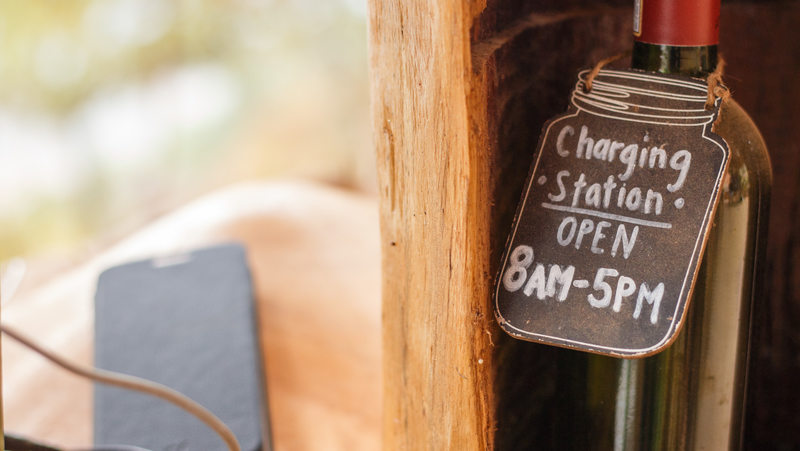
Electricity, or lack of it, is big issue in Africa. Many areas have it, yet over 600 million people still go without. As technology develops so does access, however if you are travelling, please take this into consideration. Switch those lights off and unplug your chargers!
We recommend carrying a worldwide travel adaptor and a solar charging device (not all rest camps will have consistent access to power!).
Same goes for water – Africa is a dry continent, and has long-suffered droughts. Short showers = benefit for all.
Ready for a proper African adventure? Check out our small group trips .

Feeling inspired?
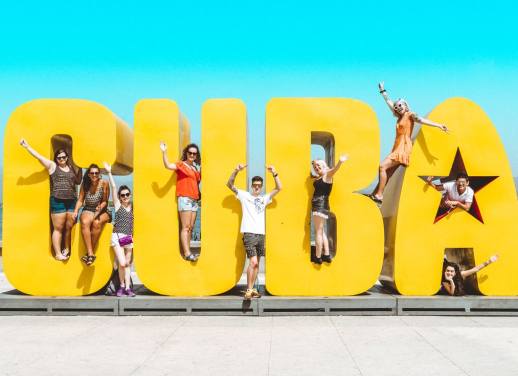
The Common Wanderer
The Common Wanderer are made up of Mark and Mim. He’s a weet-bix fuelled adventure freak who’s visited 35 countries, summited Kilimanjaro and trekked to Basecamp. She’s a caffeine-fuelled traveller and writer of words, who’s most content on the road, armed with her trusty notebook and pen, a coffee and her DSLR. You can read their adventures at thecommonwanderer.com.
You might also like
Tips and hacks for train travel in europe, why train travel is the one experience you..., everything you need to know about a night..., mind your manners: dining etiquette around the world, 5 places to escape the crowds in italy..., is australia safe everything you need to know, 10 fun facts you might not know about..., exploring the world through tea, 12 facts you probably don’t know about guatemala, the 7 best places to go on a..., 5 reasons to visit sri lanka in the....
Nomadic Matt's Travel Site
Travel Better, Cheaper, Longer
How to Travel Around South Africa
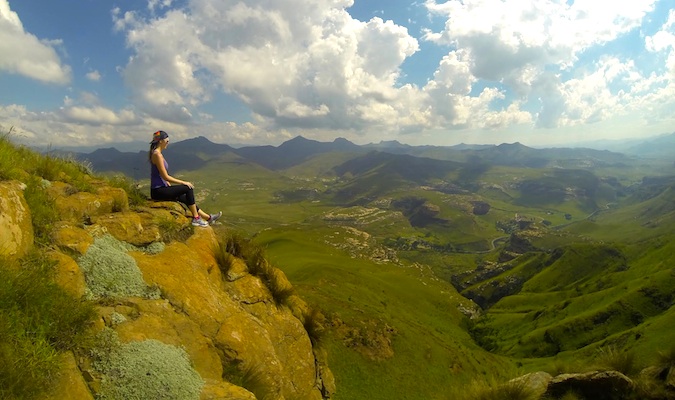
Kristin Addis from Be My Travel Muse is an expert on on solo female travel. It’s an important topic I can’t adequately cover, so I brought her in to share her advice. In this post, she shares her advice on traveling South Africa.
When I started planning my South Africa trip, a lot of questions went through my mind:
Is a country that big easy to travel around?
Is it expensive?
Is it safe?
The resources I found online were vague, negative, or simply nonexistent. I’d have to either cancel my trip or dive in and figure it all out for myself.
I chose the latter.
After traveling through the country for close to two months, I discovered a wide variety of reasonably affordable ways to navigate South Africa safely and easily.
To help you do the same, here’s my breakdown of how to get around South Africa on a budget:
Table of Contents
Traveling South Africa By Bus
Traveling south africa by air, traveling south africa by car, traveling south africa by train, how to stay safe in south africa.
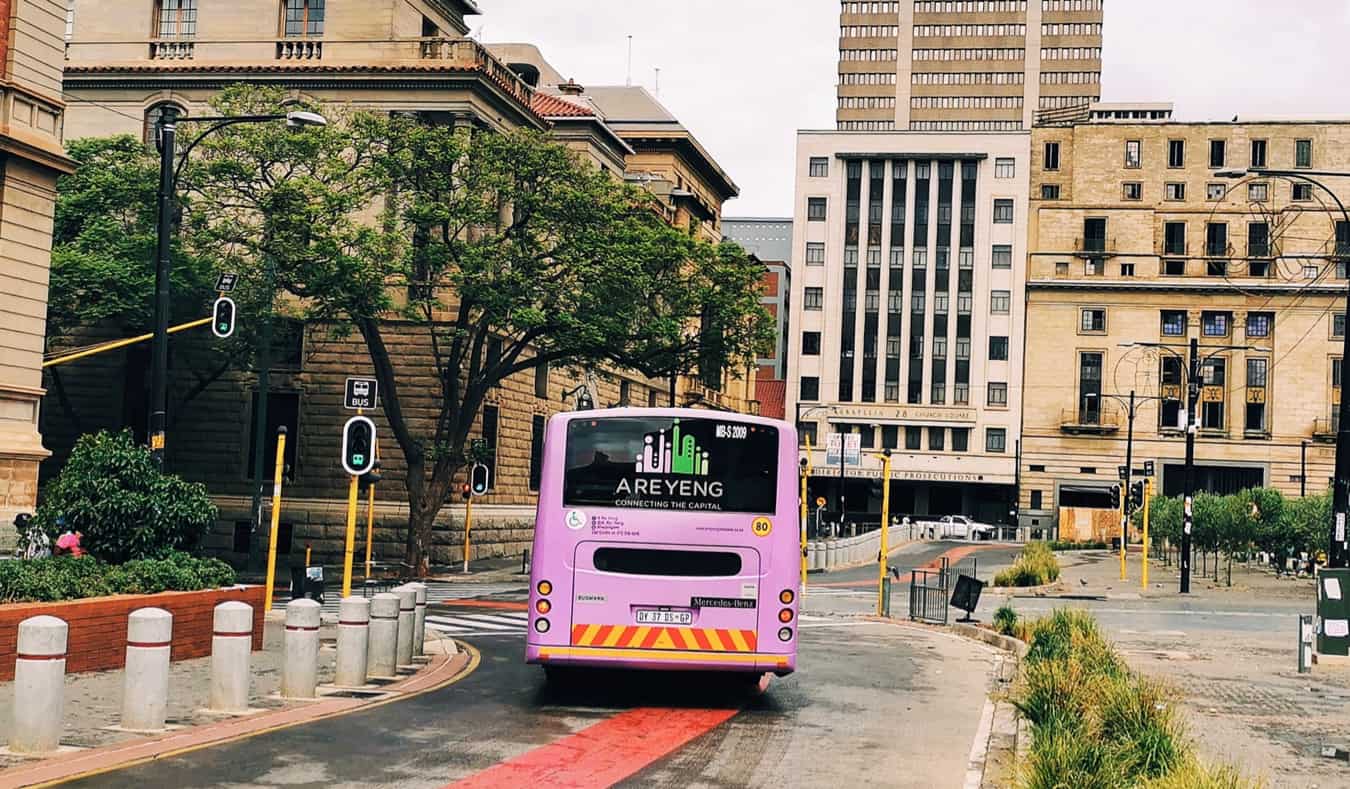
Baz Bus runs a route from Port Elizabeth to Cape Town (or vice versa) with several stops along the way. You can hop on or off whenever you want and can begin your trip anywhere, but as those two cities have major airports, most people start in one or the other.
( Matt says : I’ve taken similar buses in New Zealand and Australia . They can be good for people who want to meet other travelers.)
The most popular Baz Bus option is the unlimited one-way hop-on/hop-off pass. It costs 3,700 ZAR and covers the 750 kilometer distance between Port Elizabeth and Cape Town. You have no time limit and have unlimited travel in one direction, allowing you to have as many stops as you want. A return pass costs 4,800 ZAR.
Baz Bus is not a big money saver, as the fares are more than the train and other bus companies, but it is a convenient option for those who are happy to travel along the popular routes and meet other backpackers. The route includes the big cities in South Africa, popular spots along the coast, and the famous Garden Route in the Western Cape.
The drawbacks to taking the bus include dealing with a lack of transport once you’re at your destination, though shuttles to various local attractions, such as the bungee jump in Wilderness, are sometimes available at an additional cost. You’ll also need to be flexible with your schedule since the shuttles don’t run every day.
The biggest drawback for me was that the buses run along one set route and only go to the most popular tourist destinations and drop off only at certain backpacker accommodations. So, for those who like to head off the beaten path, it’s not a great option.
For comparison, a Greyhound or Intercape bus from Port Elizabeth to Cape Town will cost around 280-460 ZAR each way. Bus tickets from Johannesburg to Cape town cost between 370-930 ZAR each way. The journey is around 18-20 hours. The buses are large, air-conditioned, comfortable, and filled with locals, not backpackers.
Be sure to bring along snacks (and water) as well as some entertainment, as the buses run on a tight schedule and most stops are very brief, if they happen at all.
During the high season (December and June through August), you should book ahead as buses fill up quickly.
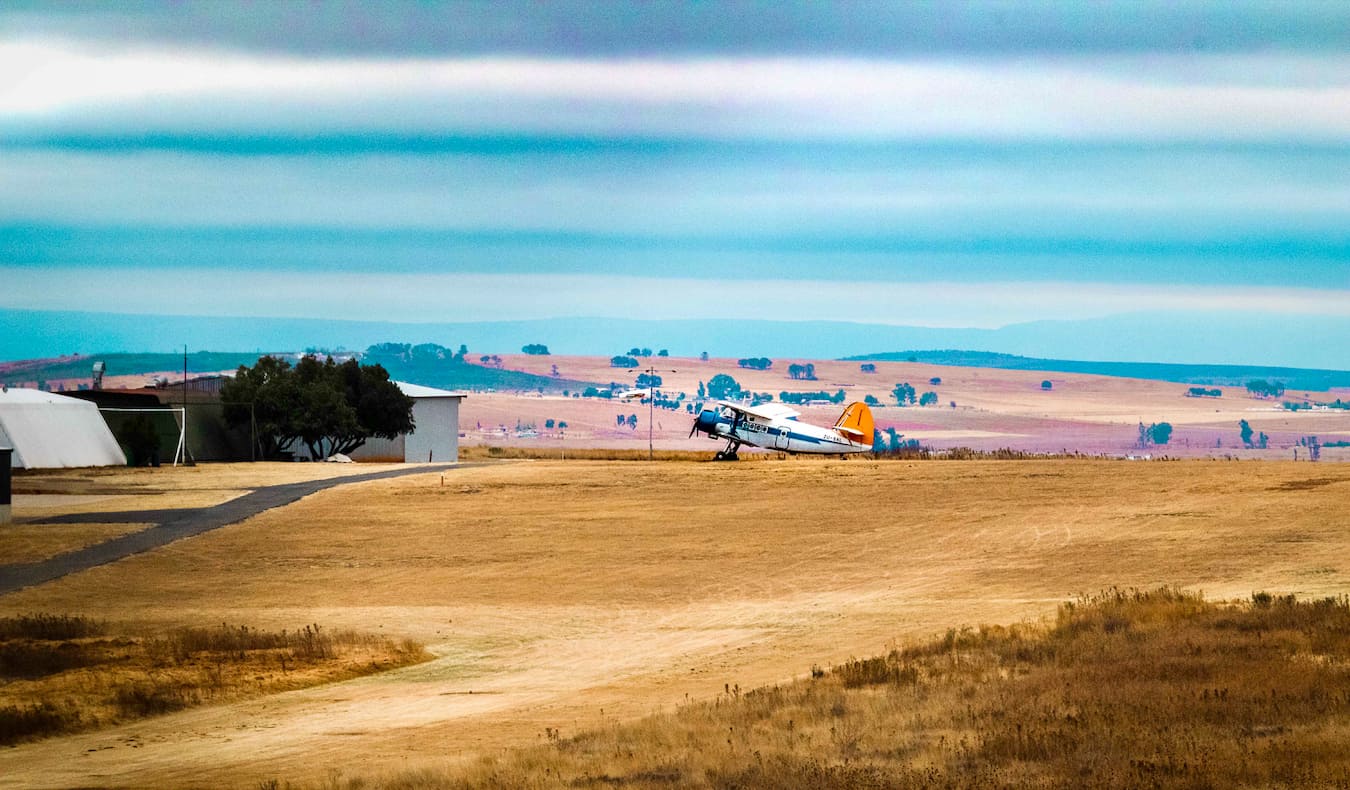
Even last-minute flights, as long as they still have quite a few seats left, tend not to go up in price if it’s a major route. For a last-minute planner like me, that was a real treat! For less common routes or smaller airports, prices go up the closer the date is.
Unsurprisingly, inconvenient times and early morning flights tend to be the cheapest. As with most budget airlines the world over, checked baggage and meals onboard cost extra.
While flying is probably the cheapest option, it’s also the least sustainable . And, when you factor in getting to and from each airport you don’t end up saving a huge amount of time if you’re just traveling a short distance.
However, if you’re on a tight schedule then flying is probably your most budget-friendly option.
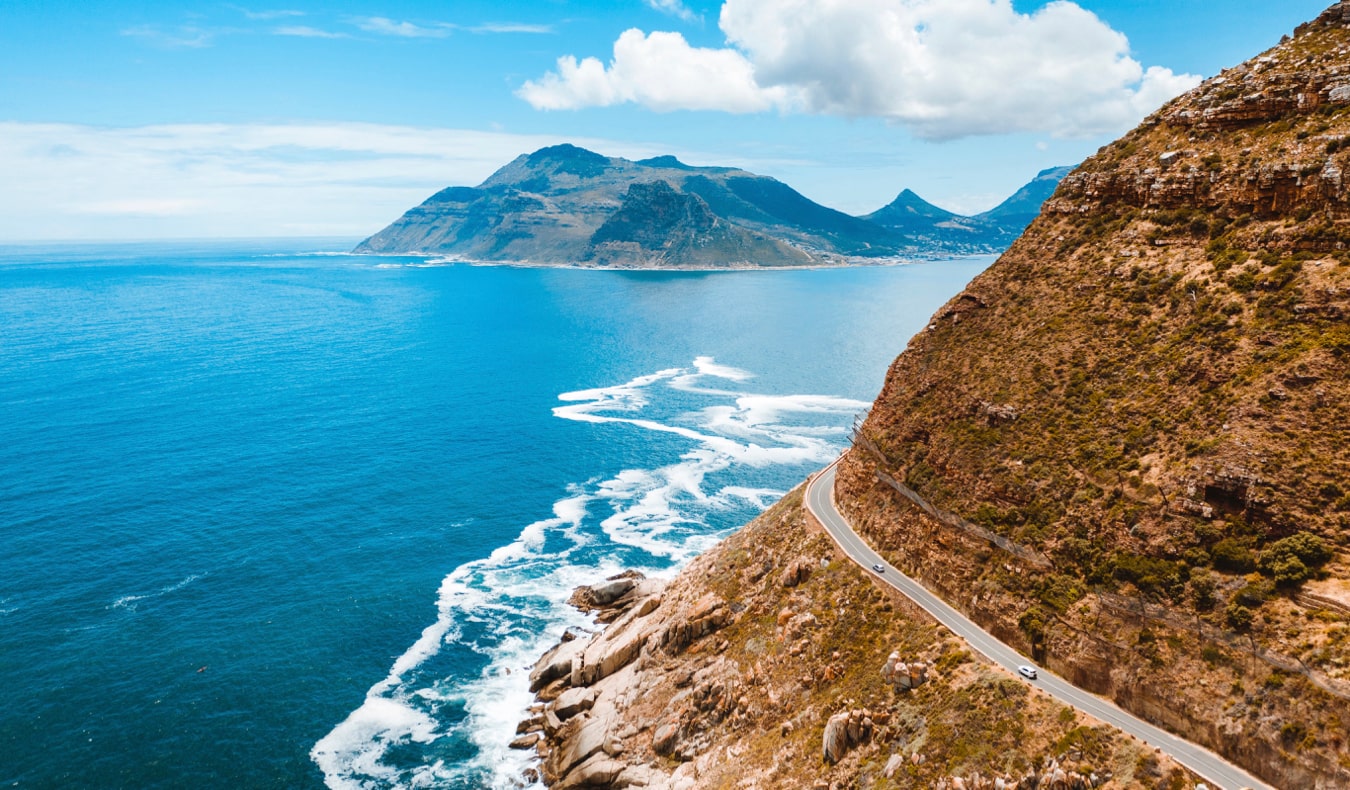
In truth, road-tripping through South Africa is not much of a problem at all, as other cars are passing by all the time should a breakdown occur, and South Africans are incredibly friendly and helpful.
That’s not to say driving in South Africa is without risk. There are carjackings from time to time, and break-ins are common. But being aware of this and taking precautions to keep valuables hidden and doors locked greatly reduces the risks.
Renting a car is the most convenient way to get around since you can get to many out-of-the-way parks, cities, and destinations. If you would rather not travel alone but still want to rent a car, post on travel forums such as:
- Africa Backpacking Facebook group
- Couchsurfing
For the best car rental prices, use Discover Cars .
Additionally, ask around hostels as there are usually people looking (or offering) rides (I found my partner in crime through a friend of mine). Not only will you get to meet new people but you’ll be able to split the gas costs, saving you money.
I rented a Volkswagen Vevo, which we booked online and picked up in person. The price worked out to be 4,350 ZAR for two weeks, including gas, the fee for dropping off in a different city than we rented in (we picked the car up in Johannesburg and dropped it off in Cape Town), and insurance.
During my trip, gas cost around 17 ZAR per liter. As of 2023, it’s closer to 23 ZAR per liter. If you choose a smaller car, mileage can be quite good. To keep costs low, we also gave rides to other backpackers we met along the way in exchange for a bit of gas money.
While it’s possible to buy a cheap car and sell it later, the paperwork can sometimes take months to go through and thus is not the best for travelers who don’t plan to spend ages in the country.
A small manual car will do for most popular destinations in South Africa. I’ll admit, a 4×4 would have been helpful for a few of the lesser-visited places that we went to during our road trip, such as the amphitheater hike in the Drakensberg mountains . But they are more expensive to rent and use more fuel. I’d only rent one if you plan on getting off the beaten path often.
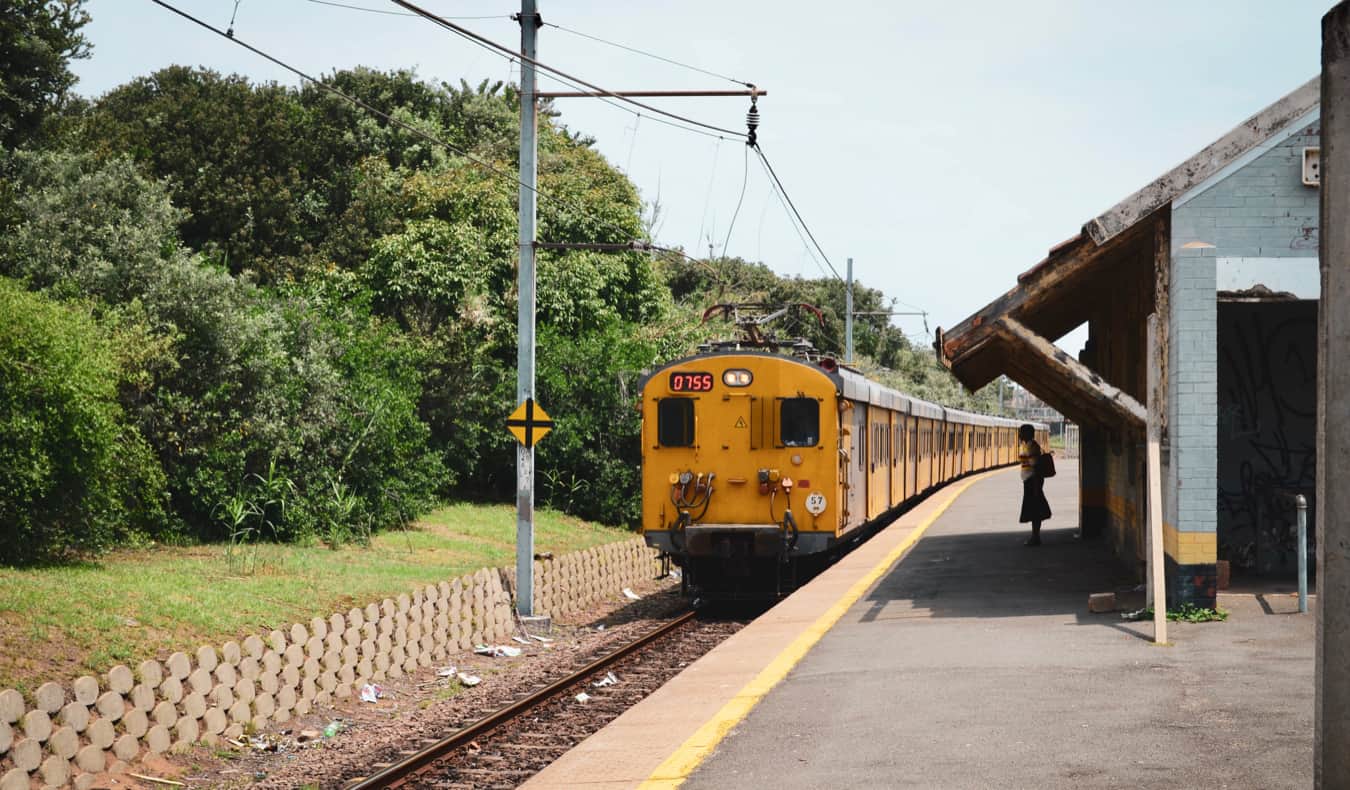
Shosholoza Meyl (South African Railways) has long-distance trains that serve Cape Town, Port Elizabeth, Bloemfontein, Durban, East London, Johannesburg, Queenstown, and East London. They’re comfortable and safe and make various stops at smaller towns along the way.
The fares are some of the cheapest available for any mode of transport in South Africa, running as low as 330 ZAR for a sleeper berth from Johannesburg to Durban. They’re safe, comfortable, and one of the best-kept secrets of traveling South Africa.
For those who are interested in some luxury, the famous Blue Train , which runs from Pretoria to Cape Town, costs 41,380 ZAR for a luxury double berth. The trip lasts a few days and includes wine, cigars, great food, and comfortable compartments. It’s the fanciest way to see the country!
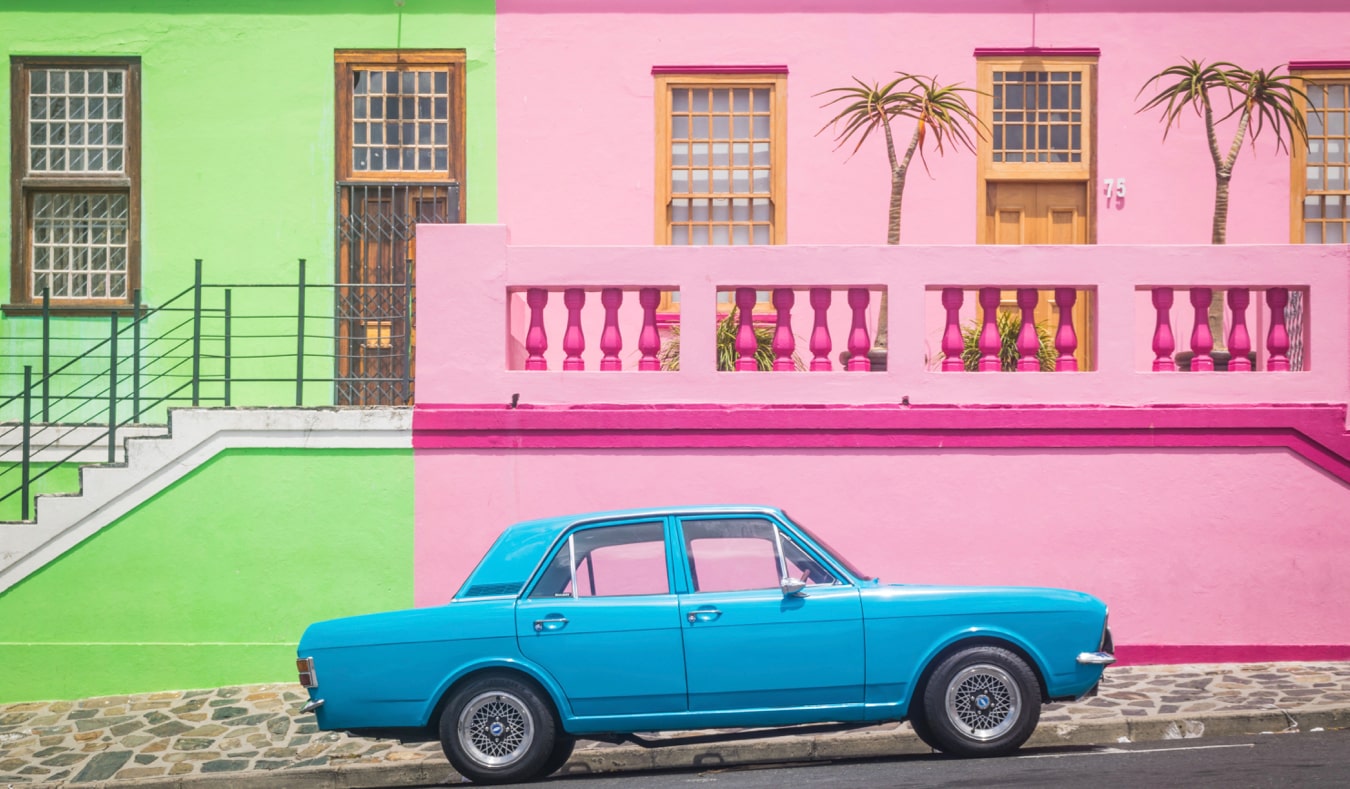
That said, muggings are still common, especially amongst tourists and particularly in Cape Town and Johannesburg. Given the high level of rape and theft in South Africa, I wouldn’t advise hitchhiking ( which is something I usually love to do! ).
Additionally, one shouldn’t walk around alone at night, be flashy, or leave things showing in the car, but much of that is true around the world.
For more safety tips, here’s a complete guide to staying safe in South Africa .
There are numerous ways to get around South Africa , and after testing several methods, I think the best is a car rental. Nothing else offers the flexibility, convenience, and reasonable price tag. If a car rental isn’t your thing and you’re solo, I’d consider the Baz Bus.
That said, regardless of which of the above transport methods you choose, South Africa is easy and relatively affordable to travel around, whether you’re solo, in a group, or a duo.
Kristin Addis is a solo female travel expert who inspires women to travel the world in an authentic and adventurous way. A former investment banker who sold everything and left California in 2012, Kristin has solo traveled the world ever since. You can find more of her work at Be My Travel Muse or on Instagram and Facebook .
Book Your Trip to South Africa: Logistical Tips and Tricks
Book Your Flight Use Skyscanner to find a cheap flight. They are my favorite search engine because they search websites and airlines around the globe so you always know no stone is left unturned.
Book Your Accommodation You can book your hostel with Hostelworld as they have the biggest inventory and best deals. If you want to stay somewhere other than a hostel, use Booking.com as they consistently return the cheapest rates for guesthouses and cheap hotels.
Don’t Forget Travel Insurance Travel insurance will protect you against illness, injury, theft, and cancellations. It’s comprehensive protection in case anything goes wrong. I never go on a trip without it as I’ve had to use it many times in the past. My favorite companies that offer the best service and value are:
- Safety Wing (for everyone below 70)
- Insure My Trip (for those over 70)
- Medjet (for additional evacuation coverage)
Looking for the Best Companies to Save Money With? Check out my resource page for the best companies to use when you travel. I list all the ones I use to save money when I’m on the road. They will save you money when you travel too.
Want More Information on South Africa? Be sure to visit our robust destination guide to South Africa for even more planning tips!
Got a comment on this article? Join the conversation on Facebook , Instagram , or Twitter and share your thoughts!
Disclosure: Please note that some of the links above may be affiliate links, and at no additional cost to you, I earn a commission if you make a purchase. I recommend only products and companies I use and the income goes to keeping the site community supported and ad free.
Related Posts
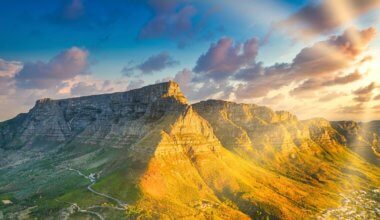
Get my best stuff sent straight to you!
Pin it on pinterest.

My 6-Month Africa Travel Budget
Working out your Africa travel budget is not easy! I know this because three of my most frequently asked questions are:
- “Is it expensive to travel in Africa?
- “Can I travel Africa on a budget?”
- “How much do I need to go backpacking in Africa?”
My honest reply is… it depends! But in this post, I’ll explain below what I spent in 6 months in Africa to help you work out what it is going to cost you, and how much money you might need.
Please Note: Some of the links in this post are affiliate links, which will earn me a small commission at no extra cost to you. Affiliate sales help with the running costs of this site, so thank you for your support!
Table of Contents
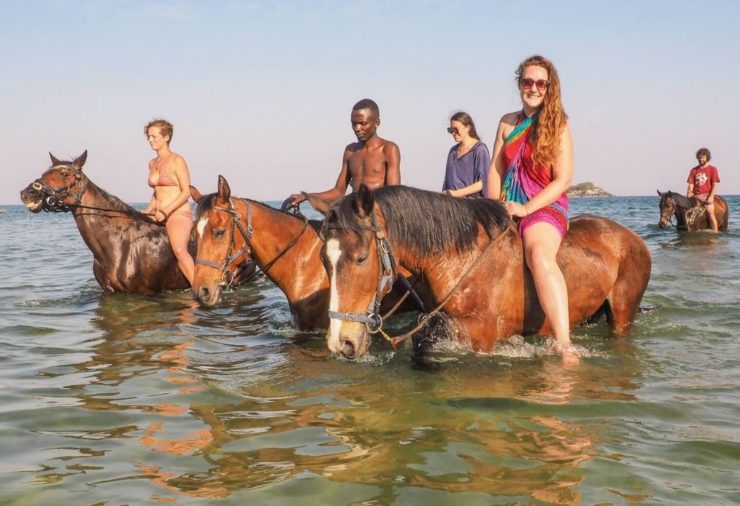
Is it expensive to travel in Africa?
It can be and some destinations are more expensive than others. But it doesn’t have to be.
Africa isn’t as cheap to travel to as some other parts of the world. But there are lots of options for the budget traveller. Kenya , Malawi , Mozambique , Tanzania , Uganda and Zambia are some of my favourite places for budget backpacking in Africa.
The most expensive things tend to be activities (things like gorilla trekking, or multi-day trekking) and safaris. Park fees and the remote location of many national parks can increase the costs a lot too.
But, you DO NOT need to spend thousands on a 2 or 3-day safari. There are plenty of great, ethical and ecologically sound safaris that cost a fraction of what the fancier safaris cost. There are safaris for all budgets.
Often on expensive safaris, you are purely paying for the luxury/all-inclusive element, the logistics of running a remote camp/lodge, lack of infrastructure and in some instances the money will be going to support the local communities that were driven off their land to make way for said, fancy safari lodge.
Expensive does not always mean ethical or better.
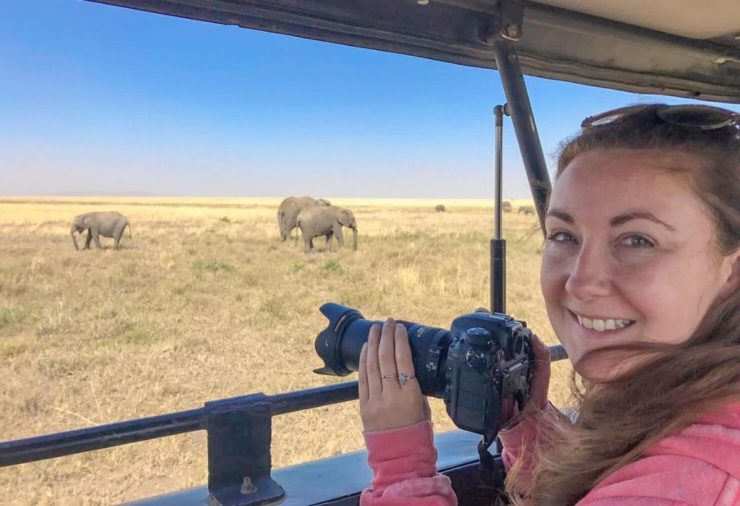
Can you travel to Africa on a budget?
Can you travel to Africa on a budget? Absolutely! Africa does NOT need to be an expensive vacation – despite what you may have heard.
If you take local transport, camp or stay in hostels, eat local foods and limit your activities/safaris you can keep costs low.
A budget-conscious traveller could probably easily travel on $30 – $50 per day – or even less. If you ate locally every day, you could spend less than $5 on food & water. Camping or staying in dorms, outside of national parks is cheap too, usually between $5 – $10 per night. Local transport is super cheap too.
But isn’t half the fun of travelling seeing and doing all the cool things on offer? it is for me anyway! However, when you start adding in safaris and activities that the costs start rising – quickly.
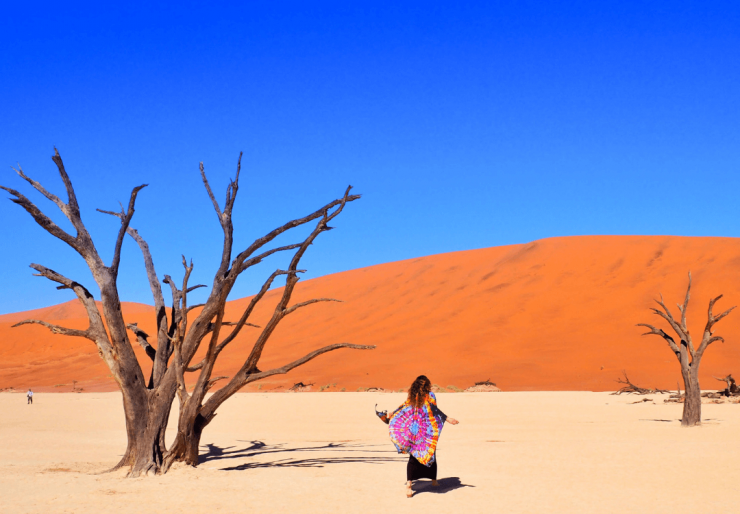
How much do I need to go backpacking in Africa?
Now I know you probably came to this post because you’d like me to give you a definite, quick and easy answer to this question.
But, your Africa travel budget will really depend on what you do and how you do it. I’ve known backpackers who travelled Africa on a tiny budget.
But that’s not for me. I love going on safari, I love going white water rafting and treating myself to a meal at the best restaurant in town every now and again. But I offset those costs by getting public transport and eating locally some nights.
This gives me the best of both worlds and gives me a really well-rounded view of the countries I visit.
Going on an Africa group tour is good if you want to stick to a budget, as you can pretty much work out what your costs will be in advance. Travelling solo makes it a little bit more difficult to work out your exact costs and you could end up paying more if you don’t have people to share costs with.
It can also go the other way. Travelling alone, you can dictate exactly how you do your trip and you might get lucky and find an open space on a safari vehicle or hitch a ride with some fellow travellers, saving you money! It’s hard to predict!
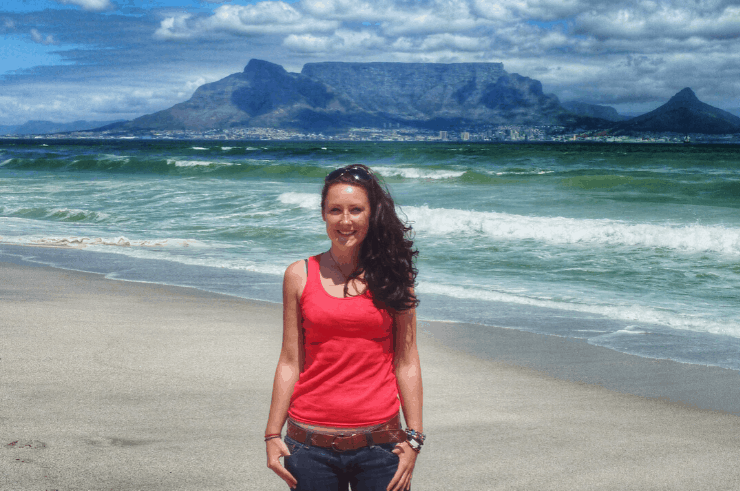
My Africa Trip & Travel Style
Your trip will be different to my trip, but I can tell you what I spent, and then hopefully, it will give you a good idea of what you might spend. Bear in mind that I am not an extreme budget traveller, but on this trip I was also travelling for a long time so I didn’t go crazy either.
These days, I spend around 6 months of the year travelling and running flashpacking tours in Africa .
But my first trip to Africa in 2009 lasted 6 months and my itinerary included 2 different volunteering placements in Zambia and Tanzania, an epic 3-day trip on the Tazara train , a trek up Kilimanjaro a 2.5-month overland safari through (Kenya, Uganda, Rwanda, Tanzania, Malawi, Zambia, Botswana, Namibia and South Africa) and a 2-week road trip along South Africa’s Garden Route .
The two things that I did spend a lot of money on were:
- Climbing Kilimanjaro: This is always going to be relatively expensive (even at the cheaper end of the scale).
- Volunteering on the Book Bus: My placement cost a lot, and there are cheaper ways to volunteer, but I don’t regret it at all because of the opportunities it opened up for me in the longterm (including working as a paid expedition leader for the company in 2012, which ultimately gave me the idea and skills to start my own tour company ).
Please Note: Prices have been updated to reflect prices up to date as of April 2020.
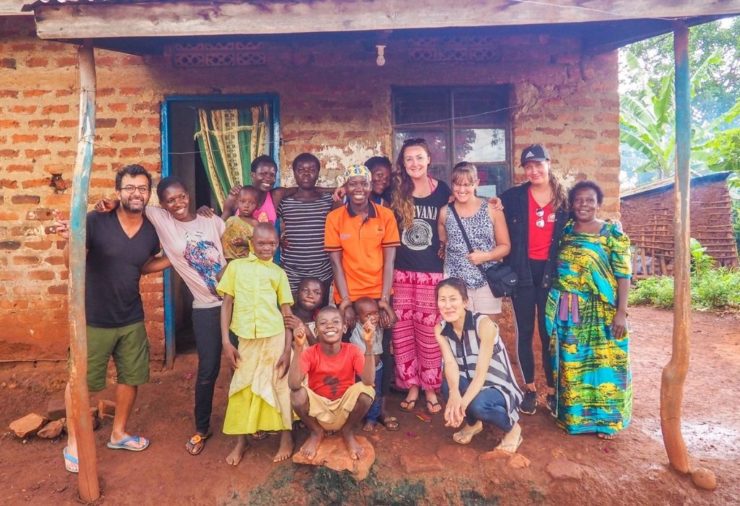
Pre-Trip Costs
I won’t include these costs in my overall budget at the bottom, as these costs have lots of variables, but here’s what I spent my money on.
Flights really depend on where you are flying to and from.
TOP TIP: I almost always use Skyscanner to find the best deals. They have a multi-destination option, which is useful if you are starting and ending in different countries.
Vaccinations/Medications
This will depend on what you’ve had already, and what you can get for free from your doctor. I managed to get Hep B, Hepatitis A/Typhoid, Diptheria/Tetanus/Polio all free from the doctors.
I then got a prescription for Meningitis (£12), and the doctor gave me the jab for free. I paid for Rabies x 3 (£42.50 per shot), Yellow Fever (£60.30).
Anti-malarials vary in cost, depending on the take of tablets you take. I usually take Atovaquone/Proguanil (aka Malarone) and avoid Doxycycline and Lariam, but it is best you speak to your doctor decide which ones are right for you.
There is no difference between generic Malarone and branded GSK Malarone, except that the generic stuff is cheaper.
Malarone usually costs around £2.30 – £2.60 per tablet and is a daily tablet, which is why many people usually tend to mix it up between different types of antimalarials or skip them altogether.
Dr Fox and Superdrug also offer convenient postal services where you do not need a prescription.
For a comprehensive view of the health precautions to take when travelling to Africa, check out the NHS, Fit for Travel website and always consult your doctor. Nomad Travel has a range of vaccinations on offer.
Clothing/Equipment
This was my first ever long-term backpacking trip, so I spent quite a lot on buying new stuff. If I could do it again, I wouldn’t have spent so much and now I travel much lighter.
Invest in a few essentials – good shoes, good bag, good camera (doesn’t have to be a fancy one, a camera with a good zoom) and the rest you can probably borrow, hire or do without! Just remember, the less you buy before you go, the more you can do when you’re there!
You can see m y full Africa Packing List here .
Travel Insurance
I cannot stress how important it is to have travel insurance in place for your trip to Africa as medical care is not free. If you get injured or fall sick, you will have to pay for your medical care which could be very expensive, so make sure you have comprehensive travel insurance that will cover you for all aspects of your trip. I recommend World Nomads , Outbacker , or InsureandGo .
Some bank accounts include travel insurance, so check if you’re covered first. At the time, mine didn’t so I paid around £70. Nowadays, insurance is a lot more expensive (and Americans are more expensive to insure than Europeans usually).
The cost will depend on a lot of factors but don’t forget you may be doing a lot of adventurous activities so ensure that you are covered. And if you’re taking electricals like an expensive camera or a laptop, you may need extra cover for those too.
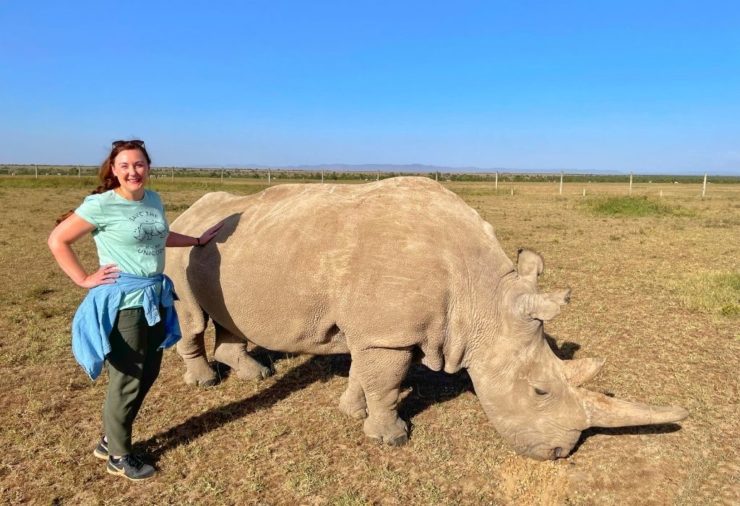
In-Africa Costs
This section includes everything that I paid for whilst I was in Africa – food, transport, accommodation, visas etc. This includes any pre-paid tours and excursions too.
Total = £284
Visas vary in price, depending on where your passport is from. On this trip, I visited Kenya, Uganda, Rwanda, Tanzania, Malawi, Zambia, Botswana, Namibia & South Africa.
The below amounts are for Single Entry visas, are in USD and for British passport holders. Other types of visas may vary.
- Kenya: $50 (however you can get the East Africa visa for $100 which allows you to travel freely between Kenya, Uganda & Rwanda for 3 months – as long as you don’t leave those countries).
- Uganda: $50 (as above).
- Rwanda: $30 (as above).
- Tanzania: $50 (for most people) & $100 for US citizens.
- Malawi: $75.
- Zambia: $50 (you can also get a KAZA visa if you will be entering Zimbabwe – find more in fo here )
- Botswana: Free.
- Namibia: Free.
- South Africa: Free.
All visas are paid in US dollars and bills should be dated after 2009 and in good condition.
I went to both Tanzania and Zambia twice, so paid slightly more for those visas. My costs for visas as of today would have been $355 (£284). If I’d only been to each country once, I’d be looking at $275.
TOP TIP: Project Visa and Wikipedia are great resources to get information. If in doubt, contact your local embassy before you go. Just be aware that you need to apply in advance for some visas.
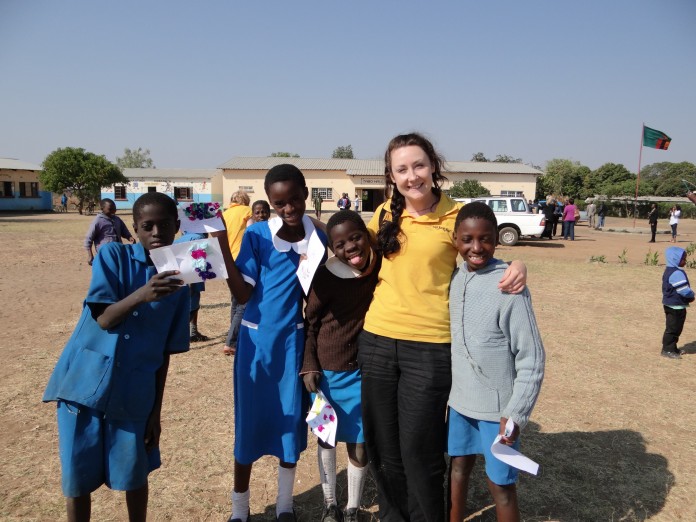
Volunteering Project 1
Total = £1,850
I volunteered with the Book Bus in Livingstone Zambia for 4 weeks. It isn’t cheap, but it is a great project which I love.
The Book Bus provided an extracurricular activity for school children in Zambia, therefore not taking away from local employment opportunities.
Their volunteer programme is different now, so I haven’t updated this section, but this gives you an idea of what I spent and you can also find lots of free volunteering opportunities throughout Africa. Just do your research to make sure that they are not taking away local jobs.
Livingstone is also one of the best places for adventure in Africa and there are loads of great things to do there, so you’ll want to have a bit of spending money!
- Volunteering (£1,600): For 4 weeks which included in-country support, airport transfers, food, accommodation (tents) and project costs.
- Weekend Food & Drinks (£200): Food is included on weekdays and not included at weekends but there are quite a few nice places to eat and drink in and around town.
- Activities: You can do all sorts from white-water rafting, jet-boating, sunset cruises, cycle tour, high tea at the Royal Livingstone, bungee jumping and even a weekend trip to Chobe National Park in Botswana. I’ll include the cost for these in the activities section at the bottom.
- Other (£50): I had some clothes made, bought souvenirs and a local SIM etc and you may need a bit of money for taxis to and from restaurants etc.
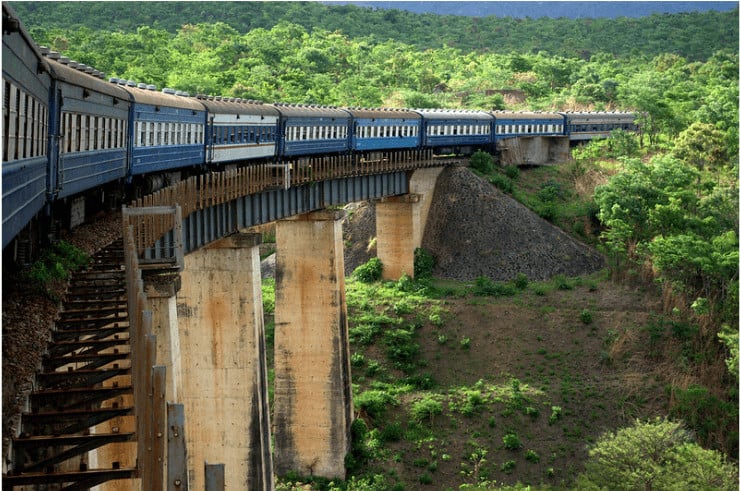
T he Tazara Train – Zambia to Tanzania
Total = £369
This is the train between Zambia and Tanzania , a wonderful, epic journey if ever there was one. I probably could have flown for a similar price… but where would the fun in that be?
- Bus from Livingstone to Lusaka: £13
- Dorm Accommodation in Lusaka x 2 nights: £20
- Bus from Lusaka to Kapiri Mposhi: £7
- Tazara Train from Zambia to Tanzania: £36
- Food/Drink: £20. A small selection of food, water, sodas and alcohol are available onboard. You can also usually buy fruit from people outside the train at various stops. Just don’t forget to change some money if you can at the border. But I would also take some food with you if you can! Things that will keep without a fridge, like jam, bread and peanut butter are good !
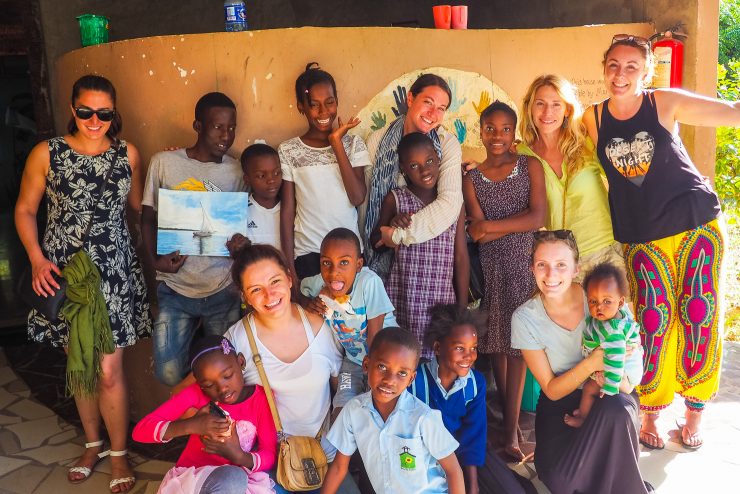
Volunteering Project 2
Total = £763
I did a volunteering placement at the Baobab Home in Bagamoyo, for just over 4 weeks, running a summer club for the local kids who live in or around the home. We did things like arts and crafts, trips to the beach and sports whilst they were on their school holidays. Bagamoyo is a great place if you want to experience the non-touristy side of Africa.
Side Note: I hardly spend anything when I was here (less than £400), but prices have gone up since then.
- Taxi from Dar es Salaam to Bagamoyo: £45. A minibus is cheaper, but as I was new to Tanzania, I took a taxi. But when I left Bagamoyo, I took a minibus.
- Mini Bus from Dar es Salaam to Bagamoyo: £2 (might be slightly more now).
- Volunteering: £0. At the time I was there there was no fee to volunteer. Instead, I raised money through a charity night and by climbing Kilimanjaro and split it between the Baobab Home and the Book Bus. You may also need to buy a volunteer visa on top of your regular visa.
- Volunteer Visa: £160. A volunteer visa is $200. If you are staying for longer than 2 months, you will need a Resident Permit which is $550 and lasts for 3 months each time but you can enter and leave as many times as you need.
- Accommodation: £336. At the time I only paid £150 for the whole month and I shared a house with 6 other volunteers and shared a room with 2 other girls, but that house isn’t there now. Now you would most likely to stay at one of their recommended guesthouses or hostels which usually cost between $15 – $25 per night.
- Food/Drink: £150. We ate rice and beans at a local container most nights or cooked for ourselves. In the daytime, I just ate chapati, samosa and bananas. Occasionally we would travel to Dar es Salaam for pizza or head to one of the hotels for cheese (yes really). These days there are a few more restaurants on offer but it’s still pretty cheap.
- Transport: £20. I walked almost everywhere in Bagamoyo, but I took a dala dala into Dar es Salaam a couple of times, and got the odd piki piki (motorbike taxi) or bajaji (tuk tuk) around town if I was going further away, but that was about it. Now the Baobab Home has moved out of town, so you would likely spend between $4 – $10 per day on transport, unless you stayed on the property. But if you want some nightlife, stay in town.
- Other: £50. There aren’t loads of things to do in Bagamoyo, not that cost a lot of money anyway – most of our free time was spent down at the beach. A tour of Bagamoyo is approximately $20. They also have cool events on at the Bagamoyo College of Arts.
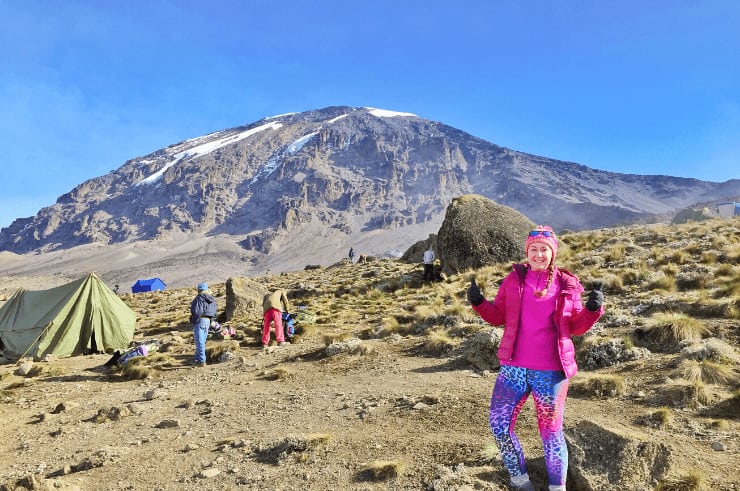
Mount Kilimanjaro Trek
Total = £2,227
Now, this was the biggest money drainer on my Africa trip but it was worth it. I’ve climbed Kili twice now and have lots of tips for reaching the top i f you need them!
There was a reason my climb was so expensive, and that was because I climbed alone. You can save a lot by joining a group. Something I wish I’d known at the time.
- Coach to Dar es Salaam to Arusha: £13 (36,000 TSH). If you are flying in, a taxi from Kilimanjaro Airport to Moshi is usually between $30 – $50.
- Kilimanjaro Climb (Machame Route, 6 Days): £1,700. Included park entry, guide, porters, all food, water and accommodation 1 night prior to and 1 night after the climb. Prices for solo climbs can vary and for a 6-day trip, you’ll usually pay somewhere between £1700 and £2,000. If you do a longer climb, expect to pay more.
- Tips: £360. You can read more in my Tipping on Kilimanjaro: Everything You Need to Know post. It’s cheaper if climbing with a group.
- Additional Accommodation: £50.
- Shuttle Bus to Nairobi from Moshi: £16 ($20). If you are flying in, a taxi from Kilimanjaro Airport to Moshi is usually between $30 – $50.
- Food/Drink: £40. Moshi has a few nice places to eat, and believe me, you’ll deserve a pizza, a big piece of cake and/or a few beers at the end of your trek.
- Equipment Hire: £28 ($35) I just hired some walking poles and some waterproof pants.
- Other: £20. I think I spent about £20 on cans of coke and chocolate bars on the mountain – they charge a fortune for it but I was very sick and that’s all I wanted to eat, so it was money well spent I say. I got up that mountain fuelled by a mixture of sheer determination, Coco-Cola and Cadbury’s Dairy Milk.
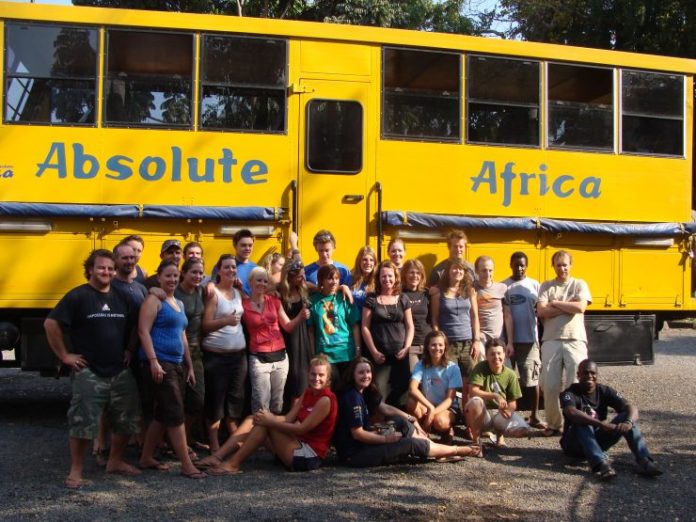
Overland Safari (Nairobi to Cape Town )
Total = £4,860
As I was new to Africa, I ended up taking a 2-and-a-half month overland safari with Absolute Africa, which is one of the most reasonably priced overlanding companies.
Overlanding is a relatively economical way to get around Africa if you don’t want to travel alone – I weigh up the pros and cons in this post . I made a lot of good friends on that trip. Some people love overland tours, some people don’t. I created my Rock My Adventure tours to bridge the gap between solo travel and more traditional overland tours.
Overlanding isn’t a ‘holiday’ as such, usually, you have to muck in – cooking dinners, cleaning the truck, putting up your tents – but it is an adventure. It takes all of the hassles out of figuring out how to get from A to B, plus you get lots of built-in friends.
Over 73 days, I visited Kenya, Uganda, Rwanda, Tanzania, Zanzibar, Malawi, Zambia, Botswana, Namibia and South Africa. The trip I took also goes through Zimbabwe too now.
- Trip Cost: £2,425 + $1,260 (local payment). Included breakfasts and dinners when on the truck, transport on the truck, accommodation (mostly in tents, some dorms and twin rooms in Zanzibar – options to upgrade) and some of the activities (but not all, see activity list below). The breakfasts/dinners not included are those when the truck is not with you and accommodation where you choose not to take part in any of the overnight excursions i.e) Okavango Delta, Zanzibar, Lake Kariba Houseboats… but trust me, do not opt-out – you’ll regret it as everyone goes! When I went the trip actually cost £990 + $1,300, rather than £2,425 + $1,260, so you can see how prices have risen.
- Accommodation: £100 – prior to tour at Heron Hotel (private room), Nairobi and after the tour at Ashanti Lodge, Cape Town (dorm). There are cheaper places to stay in Nairobi, like the dorm tent at Wildebeest Eco Camp or Milimani Backpackers.
- Spending Money: £1,325 (approx.) Absolute Africa recommend between $1,500 – US$1,800 for the whole safari. That would include additional food & drink, some transport, souvenirs, internet, some excursions and tips.
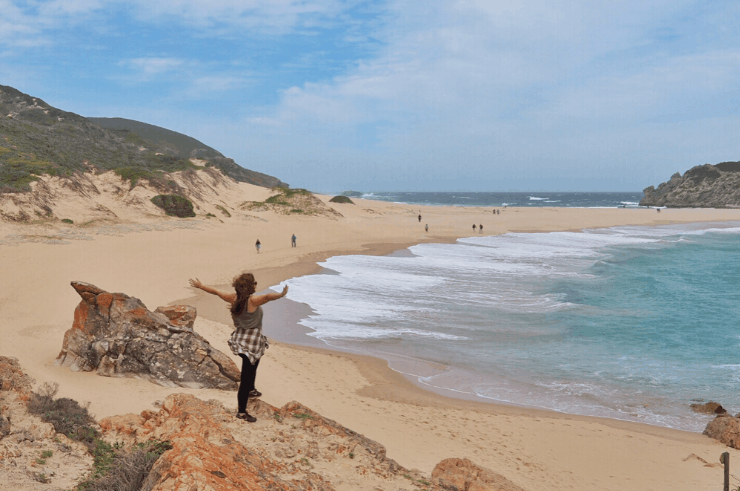
South Africa Road Trip
Total = £1,150
At the end of my trip, my boyfriend came to meet me in South Africa and we did a bit of a road trip from Cape Town, down the Garden Route to Plettenberg Bay and back, along with 3 friends from my Absolute Africa trip. We weren’t on a strict budget and stayed in private rooms.
- Accommodation: £500. We mainly stayed in backpacker hostels, but got a double room with an en-suite bathroom.
- Car Hire/Petrol: £150. This was my half of the cost. This was an economy car, with 2 drivers, insurance and petrol. Car hire in SA is very reasonable.
- Food/Drink: £500. There’s so much good food and drink in South Africa, it’s unreal. You can eat cheaply, or go to expensive restaurants. We mixed it up.
- Activities: I haven’t included these above, as I’d left the truck at this point. As we had the car, we also did lots of free sight-seeing too!
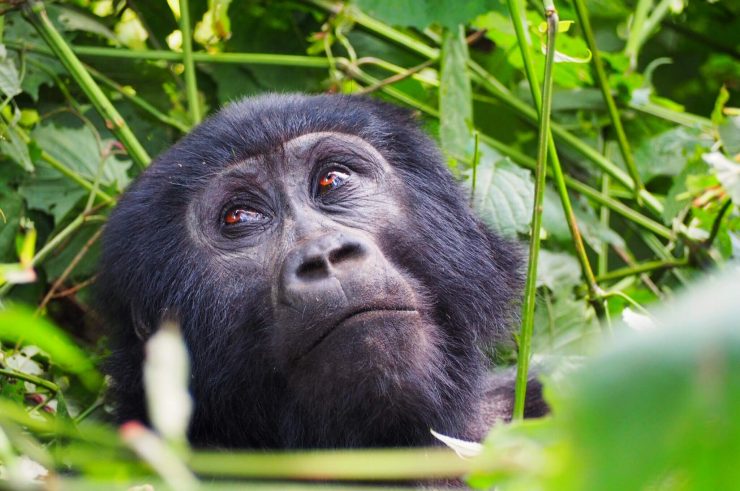
Total = £1,500
There are so many touristy activities on offer in Africa, you’ll have a hard time fitting them all in. This might be a good thing because even if you had the time, you might not have the money! So you have to pick and choose!
If you do an overland tour, you’ll have a lot of activities included. These expenses are on top of the activities that were included in the tour.
I did tons of great things on my first trip to Africa, the biggest expense of which was gorilla trekking which now costs $700 in Uganda. At the time it was $500 in Rwanda (they now charge $1,500). The other big costs are hot air ballooning (which is usually between $450 and $550).
If you are travelling on an overland truck for 2.5 months as I did, I’d budget somewhere between £800 – £1400. But just remember each overland company includes different things, so do the maths!
I spend around £1,000 whilst I was on the truck, and the rest during the other 4.5 months of my trip.
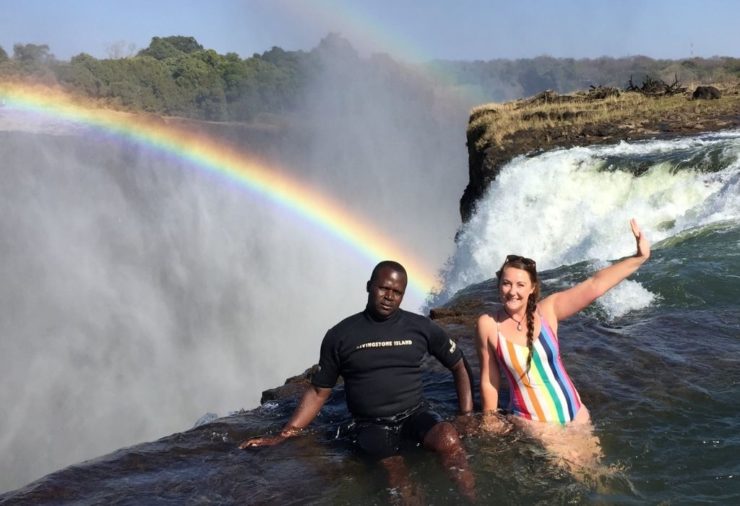
My Total 6-Month Africa Budget
So my total was…. £11,653/$14,530 (or £70/$86 per day) *
* Prices approx as of April 2020.
I know what you’re thinking – how much???? With inflation, this is quite a lot more than I actually spent in 2009, which was more like £55/$70 per day. Everything has gone up since then!
Could I have spent a lot less? Yes! If I had been purely backpacking I probably would have spent a lot less.
Could I have spent a lot more? Absolutely!
One safari company I contacted for my trip quoted me £3,000 for a 4-day safari in the Serengeti (not including the internal flight I would need to take between camps) and then it doesn’t seem so bad.
After all, in 6 months I travelled over 17,000 km, did 2 volunteering projects, a trek up Africa’s highest mountain, a 2.5-month overland tour through 9 countries, an epic train journey and 11 safaris.
Not to mention getting up close and personal with mountain gorillas, elephants, giraffes, sharks, cheetahs and lions. All the time making lifelong friends and a million amazing memories.
But I’ll tell you one thing for free… it was totally worth it. Now, start saving!!
I hope this helps you with your Africa travel budget!
Other Africa posts you might enjoy…
- Backpacking Africa: My Top Travel Tips (After 11 Years of Travelling the Continent)
- The 25 Best Places in Africa for Solo Travellers
- My Complete Africa Packing List (Plus FREE Africa Packing Checklist)
- 10 Reasons to Take a Group Tour in Africa
- Backpacking Africa: 39 Things You Need To Know Before You Go
- How To Plan Your Dream Trip To Africa (in 18 easy steps)
- Solo Travel in Africa vs. Taking a Group Tour
- I Wrote a Book! The Independent Traveller’s Guide to Backpacking Africa is Here!
- The Best Places in Africa to See Elephants
- Cultural Appropriation vs Cultural Appreciation & Africa Travel
Pin This Post For Later
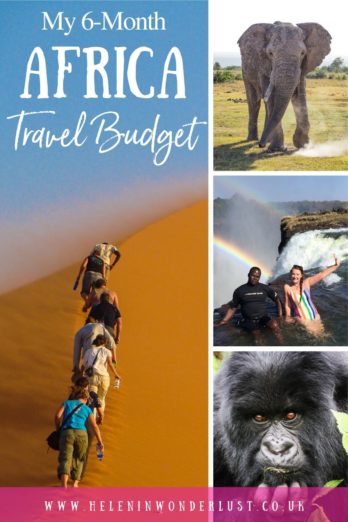
I love to travel all over the world, but it's Africa that holds a special place in my heart. My mission is to help people travel Africa in an authentic, safe, fun, adventurous and ethical way.
Similar Posts
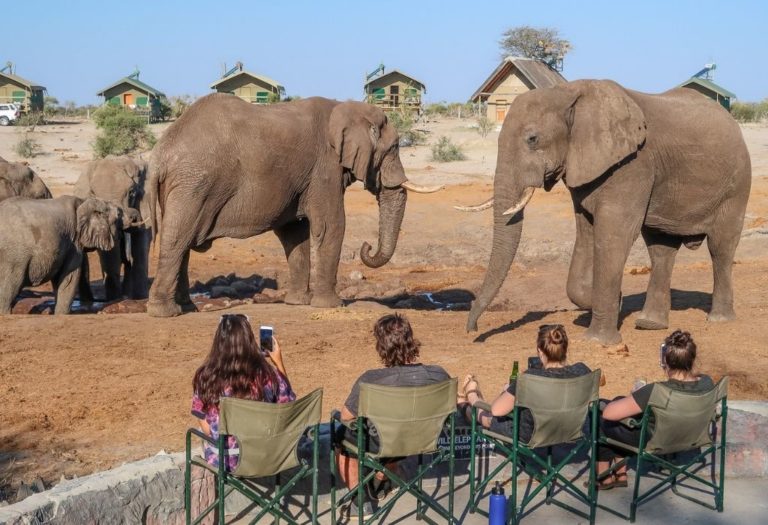
How to Visit Botswana on a Budget: Everything You Need to Know
Botswana is a notoriously expensive country to travel in, but travelling in Botswana on a budget is possible! There aren’t…
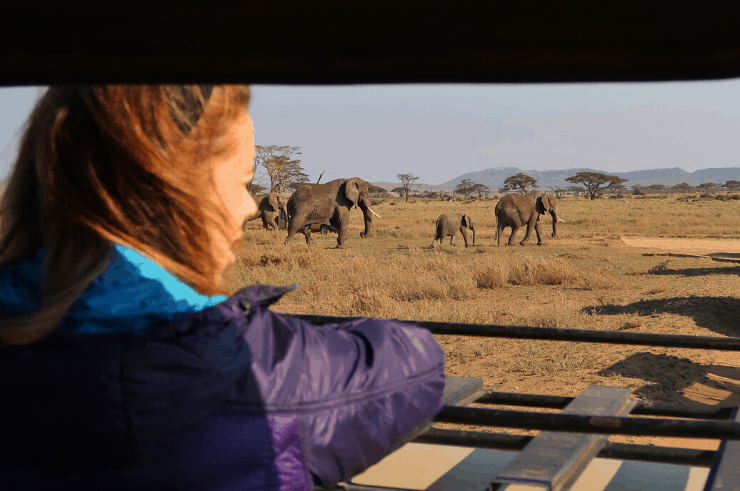
How Much Does it Cost to Travel in Tanzania? How to Budget for Your Trip
Whenever anyone asks me what my favourite African country is, I usually say Tanzania. Whilst I love pretty much every…
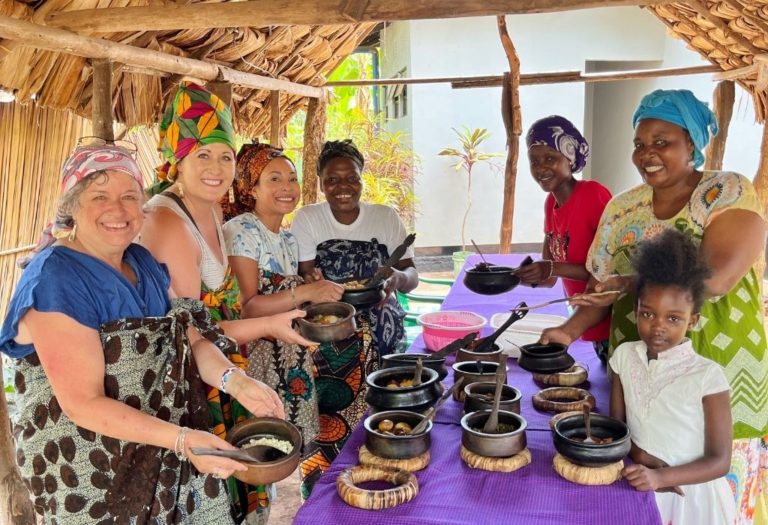
24 Fun Things To Do In Moshi, Tanzania
Moshi is a city that lies in the foothills of the mighty Mt. Kilimanjaro. So here are my suggestions on the best things to do in Moshi.
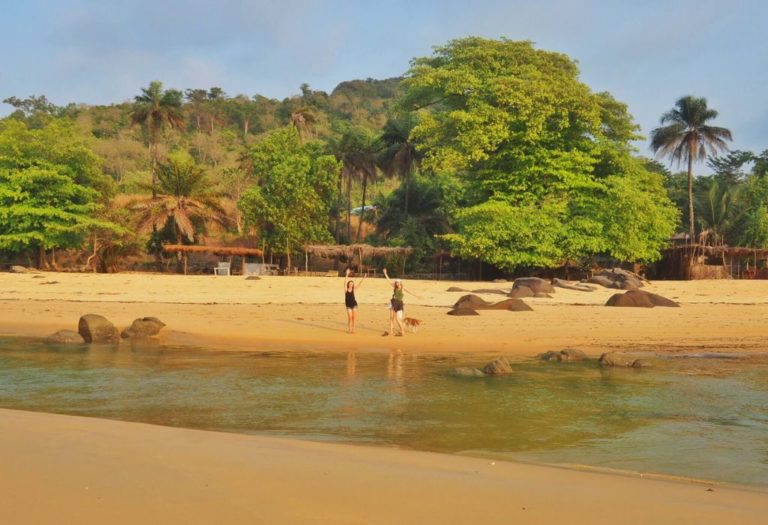
My Top 12 Best African Countries to Visit
Looking for the best countries to visit in Africa? Let me help! Africa is a huge and diverse continent, so…
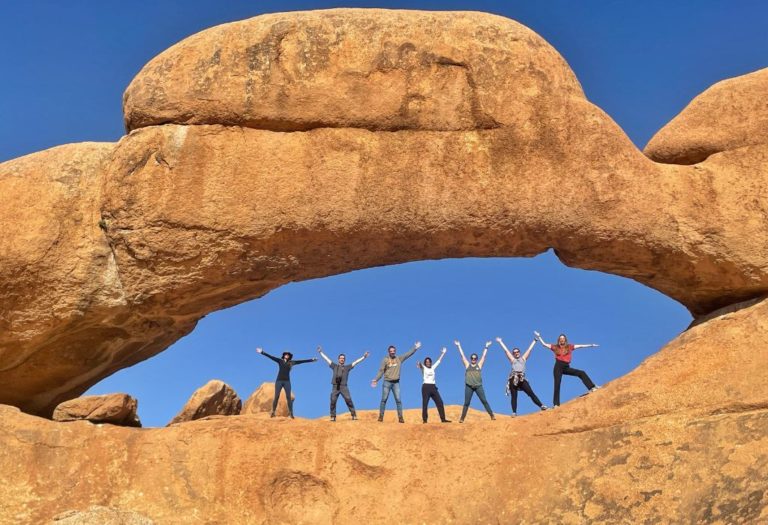
38 Best Things To Do in Namibia
To help with your planning, here are some of the best things to do in Namibia!
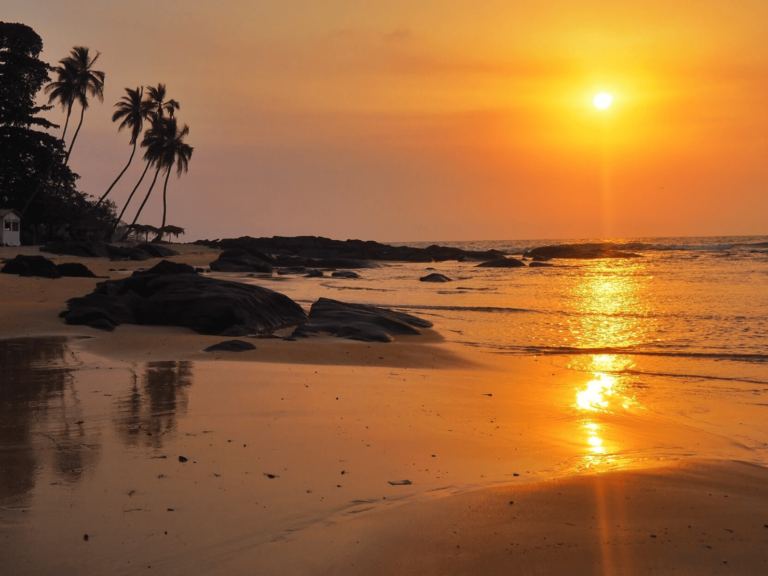
15 Things You Should Know Before Visiting Sierra Leone
Travelling in Sierra Leone (or as the locals call it, ‘Salone’) was an amazing experience. But what I found when…
69 Comments
Interesting. This counting helps your readers. Your boyfriend from s Africa?
Thanks Hassan!
No he’s English!
Very interesting, as it shows that you can really travel Africa on a budget. True, it is not Southeast Asia, but 2.500 USD a month is quite cheap in Africa. I have myself only the experience of shorter trips there, and budgets were often much higher.
The real challenge is that you need your wheels in Africa for almost all kinds of activities, and that is where it adds up quickly. But obviously the overland truck helped you reduce this a lot!
I never tried them… Maybe I should 😉
Thanks for sharing Gilles
Thanks Gilles! Yes, you definitely can do Africa on a budget! I could have done it cheaper overall, but there’s so many great things to do!
I agree, wheels are essential, especially for going to do activities. In there places I didn’t have transportation, I usually had friends who did, so I managed to get to a few places I may not have otherwise!
Yes, try and overland. They’re good fun! 🙂
Thanks for the great post! I’ve always limited myself to Europe travel, but Africa has always been a place I’ve been dying to go. European cultures and lifestyles aren’t much different from America, so it would be nice to experience something totally new. Honestly, I’m not sure if your budget was lower or higher than what I expected, but I like that you gave us a solid number to aim for. It may not be reasonable for a college student like myself right now, but what an amazing post-grad trip, perhaps? 🙂 All of your adventures sound great. The Absolute Africa trip seemed especially awesome. Nice job, Helen!
http://thebecksfactor.com
Hi Rebecka,
Thanks, glad you liked it! 🙂 I was 29 when I first went to Africa and had a pretty good job at the time, so I definitely had an advantage. But I did do lots of touristy stuff and there are definitely ways to experience Africa cheaper. If you look at the month I did in Bagamoyo – that was super cheap. But most of my time was occupied as I was working, so I had less opportunity to spend things on. But yeah, going to Africa would make the perfect post-uni trip! Start saving! 😉
I loved every part of this trip, it’s still my favourite trip of all time. I think a lot had to do with the people I met. And the ones on the Absolute truck were some of my favourites and we are still really great friends now! Hope you get to go soon!!
It’s so great to see people writing about Africa! As an Aussie living in Botswana I LOVE coming across these articles. You’re trip sounds incredible and I can only hope to see as much of Africa as this! Happy travels 🙂
Aw, thanks Grace – glad you liked it! Bet it’s cool living in Botswana! I loved it when I was living in Zambia for a little while! 🙂 Happy travels to you too! x
Thanks for sharing your experiences – awesome!
I am planning a trip to Africa from 30th August – 30th October. I will be starting off in Tanzania for 3 weeks, Zambia for 3 weeks and rounding things off in Cape Town for 2 weeks, which is where my brother lives, so hopefully this will the cheapest leg of my journey 🙂
I would love to get some tips from you, maybe we can exchange some emails so that I can fire you across some questions?
Hey Lizzie,
Zambia and Tanzania are my specialist countries, so feel free to shoot me some questions via the contact page on here and I will point you in the direction of any useful stuff, maybe I have a blog post on it already! If not will try to answer! 🙂
Fantastic write up Helen, it is quite embarrassing I have not ventured to Zambia before considering it is so close to home, I must ask is this one of your highlights as you mention it a lot in your other posts regarding highlights.
Are there any specific locations in Zambia you would recommend for a first timer?
Livingstone is my favourite place in Zambia (maybe in Africa?), however I also love South Luangwa and have had sun staying in Chipata and Ndola, not sure how much there is to do there, but I was camping and it was fun! 🙂
Then there’s Chobe not far across the border in Botswana!
Better start saving.. Do you think it would be possible to do on a smaller budget for 6 months? Also, is East Africa easy to travel on a whim? That’s my favourite way, going with the flow. Or, do you think it’s necessary to have a planned itinerary?
Hey Elliot! You could definitely do it on a smaller budget. As you can see, some of the things I did were expensive, like the volunteering costs for the Book Bus and Kilimanjaro. You can do it cheaper if you do less of the ‘big’ touristy things and live and travel more locally! You can travel on a whim no problem. You need to think about a few things, like having dollars for visas and a Yellow Fever certificate for certain countries, but it is pretty easy to get around most places in East Africa by public transport. There aren’t as many backpacker type places like there are in Asia, so you may have to book some accommodation in advance, but not all.
I think it’s good to have an idea of where you want to go, but you might meet people along the way and want to change direction. I’ve made the mistake of being too planned (on my 5 week trip), but for this 6 month trip, I was happy with the way I did it – it was quite planned, but it worked out well. I would have liked to have stayed longer in some places, but then I would have missed other places. I’ve been back to some of the places that I really loved since and spent more time there. If I went again for 6 months, I wouldn’t plan as much. So if you like going with the flow, just do that. Maybe book your first few nights for somewhere, and then take it from there.
Nice blog btw! 🙂
Happy adventures!
Africa overland tours and adventure experiences with Absolute Africa. Overland truck tours of Africa that have exciting and must see Africa land marks to explore.
Very true! 🙂
Hey Helen, just stumbled across your blog whilst planning my Africa trip. I am going for three months so really useful to know how much you spent. I am doing a similar overland trip to yours but finishing in Livingstone. It looks great and I’ll be reading more of your posts 🙂
Awesome Sara! You will have such an amazing time!! I see from your lovely bog that you’ve been to Africa before so you’ll know how wonderful it is! Southern Africa is quite different from East, so it will be a whole new experience, but there are lots of similarities. Livingstone is my favourite place, so if you get time, have a look at my Livingstone guide as there is so much cool stuff to do! 🙂 https://www.heleninwonderlust.co.uk/2014/05/travel-guide-to-livingstone-zambia/
When are you going and what overland tour are you doing? 🙂
Traveling on a budget can be a hard thing to achieve, but it is definitely possible. Thanks for sharing!
No worries Cassandra! I think there are a few misconceptions about Africa travel, but it can be done on a smallish budget. Even the safaris, whilst not cheap in general, can be done for a lot cheaper than the thousands and thousands that the luxury lodges charge, which are the most well advertised!
Thanks for sharing this budget breakdown, it seems like you have achieved a great deal in 6 months in Africa! I’m optimistic about Asia now from your comparison – I have travelled a lot in Africa, but South East Asia is still on my bucket-list. Sounds like I am going to find it extremely affordable!
No worries, glad it was useful Amy! Enjoy SEA!
Love reading all about your travels through Africa! I’m also doing the Absolute Africa tour you did in a few weeks. Getting me so excited!! Quick question about money…would you recommend taking mostly cash? and in US dollars? Also, do you have any other tips or “must do’s” for this tour? So exciting, been reading through your stuff all day, definitely distracting me too much…haha. x
Hey Keira! Thanks for reading! Great that you are going with Absolute, you’ll have a great time!!! Are you doing the full 2.5 month trip?
I took all mine in cash, and also used ATM’s. If you are coming from USA, bring all US Dollars. If you are coming from elsewhere, I’d bring a mix of dollars and your own currency to exchange for local when you’re there. You’ll need USD for visas etc and some excursions, but there’s no point changing from your own currency, to USD then into local currency.
I have a couple of posts that I would recommend – ’25 Things That Will Happen On Your Overland Trip’ and also ‘Top Africa Travel Tips’ ones but other than that, my best tips are:
– Be as welcoming as possible to new members of the group. Those who join from the start bond, and it’s tough coming in later. Make them feel welcome, you’ll likely make some great new friends. – Make sure you pitch in your chores. It’s actually when you bond the most with your fellow travellers. – If you get chance in Zambia/Zimbabwe, go to the Devil’s Pool, I regret I didn’t do that. – Take a good zoom lens for safari and loads of SD cards. Deleting as you go can be a right pain. – Take some time for yourself every now and again! – Don’t buy too many souvenirs, it always seems like a great idea at the time.
Let me have a think of my ‘must do’ excursions and come back to you!!
Please tell me how your trip goes, would love to hear how you get on!!! Are you going anywhere else before/after?? Is it a career break? Gap year? What’s your story? 🙂
Hello, thank you for your reply! Yep, I’m doing the whole 2.5 months. Getting so close now, so exciting!! I’d read to take the majority of it in cash, but bit nervous about carrying so much around with me! I’m coming from Scotland, so would I be best taking a mix of dollars and Pounds? I’ve read the ’25 Things That Will Happen On Your Overland Trip’ and makes me so excited. Can’t wait to go and meet new people and experience it all myself. Did you do the bungee jump or any other activities like that at the Victoria Falls? I always say I’m going to do it then watch a video and change my mind…act brave on the outside but deep down I’m just a scaredy cat haha. I’m not, no. I’m just doing the tour. I was hoping to get a year off from work, but I was only able to get three months:( I’m just hoping the time off and new experiences will help me figure out what I’m actually wanting to do!! But I know i’ll not want to come home once it’s over.. Keira x
Aw, lovely!! Wish I was doing it again!!
Yes take a mix of dollars and GBP. Dollars for your visas definitely, dated after 2002 (the newer the better) and then you can use some for excursions too. Don’t feel nervous about taking cash. Put it in a few different places in your carry on bag. Once you get to the truck, you can put it all in the safe!
I did white water rafting and canoeing at Victoria Falls but not the jumps. I hate heights. Maybe I’ll do one when I’m 80! 🙂 You’ll have the best time!!! Do as many activities as you can afford, but also take some time to explore local markets and go and see the real Africa away from the tourist stuff!
3 months in Africa will be great, and you can always take another career break later on! I’ve taken 3 of between 5 weeks and a year!
Let me know how it goes! Say hi to the Absolute Africa guys for me!
Hey Helen, This blog is so helpful. Just have a few questions, I hope you don’t mind answering 🙂 In a few of your blogs you’ve mentioned that you can camp along the way, I think I read you saying for around $6 a night. I also read you saying that there are often people that are on overland tours there too. I was just wondering if this would require taking my own tent to Africa when I go? I’m going on a shoestring, but I am also going solo. I don’t think I’ll have trouble meeting people to travel with, however would you recommend doing it as more of a joint tour where everything is planned/organised/provided? that way I would meet fellow travellers? This doesn’t appeal too much to me as I might fall in love with a place and want to spend a few weeks there .. time isn’t too much of an issue for me, and being on a tour you’re restricted to a time. So basically in a nut shell… bring my own tent? or join a tour? (keep in mind I am going solo so might get lonely), is it easy to get from campsite to campsite (I have read your other blogs about transport). Would it be okay to completely wing it with a tent? that’s my plan so far. I obviously have a very good idea of the places I want to go to and the route I wish to take.
Any advice would be great 🙂
No worries at all! That’s what I’m here for! Was about to reply to your email!
There are advantages and disadvantages to a tour. Like you said, if you fall in love with a place, you can’t stay. Well you could, but you’d lose a load of money! 🙂 But it’s a great way to get to the more difficult to get to places, they are economical in some ways, takes away the hassle and built in friends.
I love both types of travel. However, from what you’ve said, I think your heart is telling you solo all the way. So go with that! If you hate it (which I doubt) you can always join on to a tour once you’re there! If you aren’t limited on time, then Africa is your oyster! Wish I was going! You may have lonely days, but you’ll most likely meet nice people where you stay. Some overland groups keep themselves to themselves, but some are very welcoming, and there are often solo or small group travellers about!
On the tent front, if you are backpacking and using public transport, taking your own tent and cooking gear will be a bit of a pain. But lots of the campgrounds can provide tents and have dorms/rooms and bars/restaurants. Some are catered to overland travellers, but lots they can still accommodate backpackers. There will be some camp sites that are difficult to get to without your own transport and cooking facilities. And you may need to take the occasional tour if you want to get to some places, or go on safari or but who knows, maybe you’ll meet up with a fellow traveller who has a car and you can tag along with!
Tell me where you want to go, and I can tell you the situation on camping in that area! 🙂
Thank you so much for taking the time to reply. That information was perfect!
After reading all of the above, I think I should do a few weeks on a tour to get my bearings and confidence of Africa and then fly solo after that.
Great to know about the campgrounds, and that getting there is difficult. I might try and buddy up with someone over there and share a car 🙂 I’m going to be winging it a lot. That’s how I usually prefer to travel. I most likely will have cooking gear on me as I will be coming straight from a trekking trip in Nepal (unless I send it back to Aus with my trekking buddies).
When you say you can join onto a tour once you’re there, how hard would this be and what would be entailed?
“Tell me where you want to go, and I can tell you the situation on camping in that area!” << You're the best! The basic route I wish to take is Fly into Nairobi, Kenya. Visit the Maasar Mara, make my way overland to Tanzania (somehow?), hoping to see the foothills of Kili (perhaps in Moshi), head to Dar es Salaam and then to Zanzibar. From there I want to go down and Lake Malawai (from what your blog said…. Amazing!) Zambia (Livingston.. I also want to Bovu Island after reading that other blog of yours) Zimbabwe, Botswana, Nambia (Spitakoppe, Swakomund, Naukkft desert, Sossusvlei, Fish River Canyon, The Orange River) then down to Cape Town. Alternatively, this can be done in reverse. I'm entirely flexible, whats best?.
Its obvious I only have a vague idea of the places I want to go and things I want to see. I can Imagine getting to/from most of these places will be difficult if I'm hopping in vans/buses. I would love to book a tour, but I just know I'm going to fall in love with small little towns/people and want to stay for weeks as opposed to days.
So now that you know the rough route I wish to follow, what do you believe is best?
Much love! I can't wait to be in Africa and telling everyone how I knew about certain places (Helen In Wonderlust)
You’ll be fine getting to almost all campgrounds, it can just be a bit of a pain to get to some outside the cities and in remote areas like national parks, but you can still get there and back! If you have your cooking gear and don’t mind carrying it, then do that. Just call up and see if places have tents/rooms and you should be fine.
The route you have said is the well trodden backpacker trail so there are loads of places to stay.
Nairobi I liked Milimani Backpackers and Wildebeest Camp. My mates run a backpacker place in Masai Mara – Mara Explorers Camp, give em a shout they’ll sort you out. Really easy to get to Tanzania from Kenya. Bus to Arusha or Moshi, and then another bus to Dar es Salaam. Although that is my least fave bus ride. Try and get a seat in the middle on left side. Mikadi Beach in Dar is meant to be good but out of town, so opt for a later ferry to Zanzibar. In Zanzibar I would head straight to beaches, you’ll meet people there, and then do Stone Town at the end with your new mates. Unless you meet people before that. Stone Town isn’t much of a backpacker place.
To get to Lake Malawi I’m not sure – but you will be able to get a bus I am sure from Dar to Mbeya, then go to Kande Beach maybe, then Lilongwe and then down to Cape Maclear if you can. Then you may need to go back up to Lilongwe to get over to Zambia. Maybe go South Luangwa National Park. But if you didn’t want to do that, head towards Chipata (you go through there on way to South Luangwa from Lilongwe), then down to Lusaka, and then Livingstone. Have a look at my guide to Livingstone, loads on there.
From Livingstone it’s really easy to get to Botswana and Zimbabwe. I’d probs go Zimbabwe, then Botswana, then Namibia. Cross over the border near Vioolsdrif (on the Orange River) and head down to Springbok, Steelenbosch and then down to Cape Town and explore SA from there. It’s not difficult to get from A – Z. There is always a way in Africa. I may need to go through some old stuff to look at the exact camps I’d recommend. And you will undoubtedly be told about some cool places on the road by fellow travellers.
I went North to South so that’s my preference! When you are there, if you just email an overland company they can usually find you a space. Just like booking the trip from home. You may just need to make it to one of the towns they go through. A few people on my trip just called last minute and asked if there was availability. We picked one girl up in a town called Naivasha in Kenya. She’d been volunteering and fancied joining an overland, so emailed Absolute Africa and joined the trip.
I have to head out now (NYE and all that :)), but I will reply again tomorrow!!
Hi Helen, Thanks you mm so much again for replying such depth and information.
I feel so much more confident doing it on my own now that I’ve spoken to you. And like you said, if I get lonely or don’t want to plan anymore I can jump on the end of a tour. This is so good to know, I never even considered that or thought it was a thing.
Your blog is seriously my bible for Africa. The knowledge is so relevant and answers everything. You’re amazing!! Thank you 🙂
I think I’ve read your blog about Livingston, but will definitely be reading them all over again before I head off.
Would love to know more about the camp sites if you get a chance, but like you said.. People are always willing to offer advice on the road.
I can’t wait to get there!!! Xx
Happy new year 🙂
Happy New Year!! 🙂 You’ll have a fab time!!
Aw, thank you!! Knowing what I write is helping people is the main reason I keep doing it, so thank you!
I think I’l write a post on the campsites, as people are always asking me about where to stay!
I think that’s a great idea 🙂
🙂 Working on it!!
I thought I’d spend a minute on the internet while waiting for the kettle to boil – 1 hour later I’m still browsing your blog!! My boyfriend and I are currently planning a trip to Africa and then who knows where!, but worried I won’t be able to afford it due to buying a house etc. We are wanting to volunteer in Uganda to where I went a few summers ago (just for 2 weeks then though). It’s amazing to see what you have done!
Will keep following your posts, I feel inspired!
Thanks so much for your lovely comment! You made my day!
I hope you get to go to Africa this year! Did you volunteer with Soft Power? That’s where I volunteered in Uganda!! 🙂
You only live once…
I really am so pleased I found your blog, I can’t stop reading it!! Wish I was able to come on your Kenya trip!! Think we will end up going to Uganda the year after next, bit more plausible money wise.
No, I went with a family friend who set up a charity called Fingerprints In Uganda, which set up a girls safe house (Emmanuel House) in Jinja, and supports lots of local schools. I saw lots of Soft power projects going on though, they look wonderful!
Thanks for your reply. xx
Hey Jossie!
Aw, would be great to have you on the Kenya trip! 🙂
Jinja is amazing isn’t it? I love it there! The project sounds awesome, I’ll look it up! I’d love to go back to Uganda. I miss it a lot.
Hope you get to go to Africa sooner rather than later! But buying a house is also very exciting!!! Africa will be there when you do get to go, and it will be all the better as you waited a bit longer!
Hi, Your blog is great! I am starting initial planning for a month trip to Kenya and Tanzania. and was wondering if you could point me to your post that may have your itinerary for your 5-week Kenya and Tanzania trip. I’ve spent a bit of time looking but through asking might be easiest. Thanks!
I haven’t written this down yet but it shouldn’t take me long to pull together! I’ll get it done over the weekend for you, with all the places I stayed and companies I used etc! 🙂
Wonderful! Thank you so much.
Hey Marsha, your post is up! 🙂
https://www.heleninwonderlust.co.uk/2016/03/perfect-kenya-tanzania-itinerary/
thank you so much for all the info.. I love your blog!
I am going to Cape Town in a couple of weeks (travveling alone) and I am interested in doing a one day safari, but i am on a budget. Which Safari did you go on that cost £80?
I think we used http://www.aquilasafari.com/ . However there are lots and lots of days trip safaris and you can book most of them there. If you’re staying in a hostel or hotel, they will be able to help you arrange!
Thanks for reading!!
Have a great time in South Africa!
Great post Helen, love the detail. Just wanted to add my 2 cents for anyone reading this and feeling like they can’t ever afford to do a trip like this. I planning on travelling solo from Egypt to Cape Town later this summer and am in the planning process (budget planning especially!!) right now. I have been to East Africa 5 times already and spent a year in Southern Africa This kind of money is INSANE in my eyes. Hostels throughout East and Southern Africa should only set you back $10 a night. I have never paid to volunteer and probably never will. You can find local projects that need your skills and will provide you with a place to stay while you volunteer there. Local transport never costs more than a few dollars, bar maybe the Tazara train which I think i paid $50 for. Even South Africa, the most expensive country in Africa (bar maybe Angola!!) is pretty cheap. Meals are only about 5 or 6 dollars and even adventure activities are cheaper than anywhere else. I did Paragliding for just 40 euro, a bungee jump for 50 and surfing lessons for just 3 euro! Anyway, thanks for the honest post and breaking it all down, but I would say a trip the same time and same route could be done independently on a budget of about $6000.
Hi Janet, thanks for reading!
I agree, you can definitely travel Africa cheaper and on a budget if you travel independently, staying in dorms, using local transport, only eating locally etc (which I say at the beginning) and I’ve done subsequent trips cheaper than this one, but wanted lay out my costs as they were. This was my first trip to Africa in 2009 and there are definitely a few things I’d do differently now, but some I’d keep the same.
The biggest single cost for me was the volunteering project, which did cost a lot. I’m not sure I would pay to volunteer again, however it was an amazing experience and led to me meeting some of my best friends and later a paid job with the company in Zambia and Malawi – so it kind of worked out well! 🙂 But I also volunteered for free the following month in Tanzania and also for free in Uganda in 2011 and both were also amazing experiences. Then there was Kilimanjaro, which is never cheap. It could be done a bit cheaper than I did it, but it’s still expensive. And you have to be careful on the companies you choose and how they treat their staff if they’re undercutting everyone else.
Overlanding wasn’t cheap, but I guess there you are paying for the convenience. Sometimes it’s nice not to have to worry about where you have stay or being stuffed into the corner of a crazy bus for 12 hours or getting a dala dala from South Luangwa, to get to the nearest border town, to then get a share taxi to the actual border, then take another share taxi to the bus stand on the other side and then another dala dala back to Lilongwe. You get my drift! And it was always great having a group of mates around! Another experience I wouldn’t change for the world.
The overlanding costs also included a gorilla trek (permits alone are $750 in Rwanda, although in Uganda they are $450 – $600 – depending on the season), white water rafting twice, 11 multi-day safaris and tons of other activities. Then at the end I did a two week Garden Route trip with my (now) husband who came out to join me, so we weren’t staying in mega cheap places.
But yes, I definitely agree though that Africa is not as expensive as everyone thinks and you could definitely do a 6-month trip to Africa for $6000 so it’s not an exclusive destination by any means. Not sure I’d go as far as to say the costs I paid were ‘insane’ – I guess it’s all relative to your budget and your expectations. Some safaris charge £4,000 for a few days! 🙂 Now that’s crazy money! Doing it on a shoestring, the experience would probably be different than the one I had, but that’s not a bad thing and everyone’s experiences will be different anyway! I’ve travelled there super cheap and mid-range/luxury, both are great, and have their advantages and disadvantages.
I hope you can prove me wrong on the costs! 🙂 You’ll have to let me know how you get go on your trip and how much you spent for the Nairobi to Cape Town section and if you did the same activities! Have a fab trip!!
Hey! I have just been reading about your Africa trips and WOW! I am actually heading to East Africa in January & February just as a mini trip to check out a few places. Planning on Kenya and Tanzania to begin. My long term goal is to return after my current work contract ends and do up to a year. I have some serious saving up to do haha. After reading about your 6-month trip I am 100 times more excited to go. Thank you for your information and guidance.
For the price you paid to travel around Africa for six months versus what your friend paid for travelling around Southeast Asia, I would have to agree with you that you managed to accomplish a lot with a very reasonable budget. Thanks for the tip about Overland Tours Africa! I find that local tour companies usually give you a better price and have much better tour options than Western-owned backpacking companies.
Hi Helen, thanks for putting this together. It has been really helpful for my Husband and me. We have decided to do a similar route from Cape Town to Nairobi, but we will do it independently. We are reluctant to carry too much cash on us which will mean that we need access ATMs along the way. The question is how much would be sufficient in cash or should we split our Budget on a 50/50 between currency and atm?
It is really very cheap to travel Africa especially southern Africa.
What an awesome trip!
I spent 3 months travelling around Africa, mainly South Africa and then touched on some of Mozambique, Zambia and Zimbabwe. Fell in love with it and dreamt of going back ever since. I was wondering if you thought the Absolute Africa (the price has gone up again by the looks of it £2025 + Local Payment US$1260) tour was rushed or if you felt you had a decent amount of time to really appreciate all the countries you visited along the way, as I had a similar route planned but in reverse but this tour would take a lot of hassle out of planning, but having done tours in the past and then solo travel I found tours can be quite rushed and I felt like I missed a lot out, especially in Asia. I also like the freedom of solo travel but I doubt I would be able to do this kind of trip for less than the tour price once you start adding it all up?
I was reading through for ideas because I’ve been to Tanzania before and spent a couple of days in Mombasa but I’m looking to go back for a proper trip.
Safari isn’t really something that I’m too interested in anymore, but for those that are I know you can get a guide in Arusha for the northern circuit. Obviously it depends on how much you trust people, but it’s much cheaper and less of the money ends up back in London, New York or Joburg.
I hope all of you who have been or intend to go find Africa as beautiful and compelling as I did.
Helen, I’m sure you know this but your blog is fantastic, whether you’re preparing for your first adventure, browsing for inspiration or
Hi Helen Have you tried visiting the famed happy valley in Kenya,it had a great colonial past ,so much history. Let me if interested
Thank you so much for this, it has helped me plan my east coast trip!
That’s awesome! Have an amazing time!!! 🙂
Do you have any tips for choosing responsible volunteering programs in Africa? The ones you did sound great, but I know that some can be more exploitative than beneficial, particularly those where children are involved.
I’m thinking about volunteering as part of a longer trip to Africa so would love to hear any advice you have.
Great work on the blog- it’s really useful!
Many thanks
Hello Helen! Thank you so much for this in depth description of your journeys! I and a friend are hoping to fly into Nairobi Kenya over summer (mid may-mid june) visit Masai Mara, Mamosa and make our way to see the victoria falls in zimbabwe. Do you have any recemndations for the means of travel within africa from kenya to zimbabwe (trains. busses. flights ect) to enhance the experience/decrease travel cost and any reccomendations of other countries to stop by along the way? As of now the round trip flights from ATL to Nairobi are well priced in mid may around $900 round trip! Ideally a 12-20 day trip Thanks! Taylor
You can take buses all the way and there are also some trains. You can go from Kenya to Tanzania, Malawi, Zambia, Zimbabwe.
I also offer awesome group tours! https://www.rockmyadventure.com/
What a great round up of expenses and experiences on traveling in Africa. So much I hadn’t even thought about. A great heads up. Thank you. Cheers Nathan…
My friends and I are planning to go to Africa later this year and I was struggling for ideas when I found your lovely blog! Your pictures are so inviting! We want to visit so many different places, but our budget is limited, so your tips definitely help to plan our journey. Thank you so much!
Cost is a significant factor when considering to visit Africa. I would say Safari’s is the most interesting part of visiting Africa other than the local culture.
Been to Africa twice, and I’d say Africa is pretty cheap compared to western countries.
Love the blog, hope to be back 🙂
Hi, I’m planning to stay in South Africa for lore or less 90 days and then move to Namibia for other 20 days and probably then Botswana. I’m booking only a one way flight to Johannesburg and then move to Windhoek by bus: di you think that I could have problem entering In SA without a return flight? I’ll have some month to spend in South and east Africa and I don’t want to plan everything in advance, things can change and maybe I can find other people that want to join me. But I’m a bit worryed about visas and immigration department, do you have any suggestion about it?
Hi Helen thanks a lot for the insight. Am planning a trip across the entire African continent, hoping to start from Nigeria, West Africa then go North, East and South. Reading your article really helps. Quite a lot to put together lol but your article sure helps. I hope it wouldn’t be much of a hassle for you if I need answers to a couple of questions as I plan my trip? Thanks for sharing your travel experience.
Aw, thanks Grace – glad you liked it! Bet it’s cool living in Botswana! I loved it when I was living in Zambia for a little while! Happy travels to you too! x
Better start saving.. Do you think it would be possible to do on a smaller budget for 6 months? Also, is East Africa easy to travel on a whim? That’s my favourite way, going with the flow. Or, do you think it’s necessary to have a planned itinerary?
Yes definitely you can – as I mention, I’m not a strict budget traveller and there are tips in here for saving money. You can do a mix of planned and unplanned, no problem! 🙂
Probably one of the most useful and informative blog posts Ive come across in a while!
I’m planning a 6month backpacking trip very similar to yours starting in October. My biggest question is aside from Kilimanjaro what needs to be booked in advance and what can I book while in country?
Leave a Reply Cancel reply
Your email address will not be published. Required fields are marked *
Privacy Overview

Statement branded as KQ response to Ruto on US travel FAKE
- The viral statement appeared to contradict President William Ruto's assertion that travelling to US in private jet was way cheaper compared to hiring a Kenya Airways plane.
A statement going viral on social media and attributed to Kenya Airways CEO Allan Kilavuka regarding the airline's cost of travel to the US is FAKE.
The viral statement appeared to contradict President William Ruto's assertion that travelling to the US in a private jet was way cheaper compared to hiring a Kenya Airways plane.
The airline has however denied making such a statement and flagged it as fake on its social media handles.
Ruto on Sunday clarified that the cost incurred for his travel to the US was way less than what would have been spent if he had used a Kenya Airways plane.
The President travelled to the US aboard an A6-RJU royal jet. He used the same jet on his way back.
In a statement on X, formerly Twitter, the President said he has received concerns from Kenyans who questioned why he did not use the presidential jet or the Kenya Airways plane in his State Visit to the US.
But in a rejoinder, Ruto said the choice of his plane to the US was influenced by his decision to ensure the prudent use of State resources.
"Fellow Kenyans, I have noted concerns about my mode of transport to the USA. As a responsible steward of public resources and in keeping with my determination for us to live within our means and that I should lead from the front in so doing, the cost was less than travelling on KQ," Ruto said.
Ruto, however, did not state the amount he used for the hired jet and the amount he would have spent if he had to use a Kenya Airways plane.
A State House official had earlier told the Star the President could not use his presidential jet as it has never been to the US since it was bought in the 90s.
The official said the design of the jet makes it effective to operate in Europe, Africa and the Middle East.
State House Press Secretary Emmanuel Talam was quoted by local media saying the plane could not be used as "it will have to stop five times to refuel".
Multiple reports estimate that the cost of hiring a Boeing business jet like the one Ruto used in his visit to the US oscillates around $18,000 per hour, roughly Sh2,358,0000.
A journey to Atlanta, US, where Ruto first made a stop, is approximately 19 hours from Kenya, meaning it would cost Sh71,404,500 with that rate.
Earlier, the US embassy denied footing President Ruto's travelling cost to the US.
"Just to be clear: The United States of America DID NOT pay for President Ruto’s jet to the U.S," U.S. Embassy-Nairobi spokespersoN Andrew Veveiros told a local m
Global Carbon Pricing Revenues Top a Record $100 Billion
Emissions trading schemes generate majority of this revenue, over half of which funds climate and nature programs
WASHINGTON, May 21, 2024 — In 2023, carbon pricing revenues reached a record $104 billion, according to the World Bank’s annual “State and Trends of Carbon Pricing 2024” report released today. There are now 75 carbon pricing instruments in operation worldwide. Over half of the collected revenue was used to fund climate and nature-related programs.
“Carbon pricing can be one of the most powerful tools to help countries reduce emissions. That’s why it is good to see these instruments expand to new sectors, become more adaptable and complement other measures,” said Axel van Trotsenburg, World Bank Senior Managing Director . “This report can help expand the knowledge base for policymakers to understand what is working and why both coverage and pricing need to go up for emissions to go down.”
The World Bank has been tracking carbon markets for around two decades and this is it’s eleventh annual carbon pricing report. When the first report was released, carbon taxes and Emission Trading Systems (ETS) covered only 7% of the world’s emissions. According to the 2024 report, 24% of global emissions are now covered.
Report findings show large middle-income countries including Brazil, India, Chile, Colombia, and Türkiye are making strides in carbon pricing implementation. While traditional sectors like power and industry continue to dominate, carbon pricing is increasingly being considered in new sectors such as aviation, shipping and waste. The EU’s Carbon Border Adjustment Mechanism, currently in a transitional phase, is also encouraging governments to consider carbon pricing for sectors such iron and steel, aluminum, cement, fertilizers, and electricity.
Governments are also increasingly using carbon crediting frameworks to attract more finance through voluntary carbon markets and facilitate participation in international compliance markets.
Despite record revenues and growth, global carbon price coverage and levels remain too low to meet the Paris Agreement goals. Currently, less than 1% of global greenhouse emissions are covered by a direct carbon price at or above the range recommended by the High-level Commission on Carbon Prices to limit temperature rise to well below 2ºC. The report notes that closing the implementation gap between countries’ climate commitments and policies will require much greater political commitment.
To read the report, click here .
To access the report series, click here .
Visit the Carbon Pricing Dashboard website for up-to-date information on existing and emerging carbon pricing initiatives around the world: https://carbonpricingdashboard.worldbank.org/
Report: State and Trends of Carbon Pricing 2024
Blog: State and Trends of Carbon Pricing 2024: Positive progress on carbon pricing, but more is needed
Event: Launch of the 2024 State and Trends of Carbon Pricing Report
Website: Carbon Pricing Dashboard
Website: World Bank - Climate Change
This site uses cookies to optimize functionality and give you the best possible experience. If you continue to navigate this website beyond this page, cookies will be placed on your browser. To learn more about cookies, click here .
- Election 2024
- Entertainment
- Newsletters
- Photography
- Personal Finance
- AP Investigations
- AP Buyline Personal Finance
- AP Buyline Shopping
- Press Releases
- Israel-Hamas War
- Russia-Ukraine War
- Global elections
- Asia Pacific
- Latin America
- Middle East
- Election Results
- Delegate Tracker
- AP & Elections
- Auto Racing
- 2024 Paris Olympic Games
- Movie reviews
- Book reviews
- Personal finance
- Financial Markets
- Business Highlights
- Financial wellness
- Artificial Intelligence
- Social Media
Norfolk Southern will pay $15 million fine as part of federal settlement over Ohio derailment
FILE - Debris from a Norfolk Southern freight train lies scattered and burning along the tracks on Feb. 4, 2023, the day after it derailed in East Palestine, Ohio. A federal judge has signed off Tuesday, May 21, 2024, on the $600 million class action settlement over last year’s disastrous Norfolk Southern derailment in eastern Ohio, but many people who live near East Palestine are still wondering how much they will end up with out of the deal. (AP Photo/Gene J. Puskar, File)

- Copy Link copied
The federal government agreed to a $15 million fine for Norfolk Southern over last year’s disastrous derailment in East Palestine, Ohio, and the railroad promised to pay more than $500 million to complete the efforts to improve safety that it announced after the crash and address community health concerns.
Residents who had to evacuate their homes after the derailment were generally underwhelmed by the deal the Environmental Protection Agency and Justice Department announced Thursday that doesn’t include any criminal charges. This federal settlement comes two days after a federal judge signed off on the railroad’s $600 million class action settlement with residents whose lives were disrupted.
In addition to the civil penalty, Norfolk Southern agreed to pay $235 million in past and future cleanup costs — on top of what they’ve already paid for cleanup — and set up a $25 million health care fund to pay for 20 years of medical exams in the community. The railroad will also pay about $30 million for long-term monitoring of drinking water, groundwater and surface water in the area. The agreement also says the railroad will pay $244 million for previously promised railroad improvements through 2025.
Many East Palestine residents feel this settlement doesn’t do nearly enough to a company that just reported a $527 million profit in the fourth quarter of last year and $53 million in the first quarter after the derailment costs. The railroad’s CEO received $13.4 million in total compensation last year.
“Honestly, no amount can ever make this right, but it should be at least enough to hurt them a little bit. I’m sure that’s not going to hurt their bottom line at all,” Jami Wallace said.
EPA Administrator Michael Regan said the fine is the largest allowed under the Clean Water Act, and the railroad agreed to continue paying all of the cleanup costs. Plus he said Norfolk Southern committed to meaningful safety improvements
“This settlement is historic in many ways and will begin to make up for some of the damage caused to the residents of East Palestine. And it would absolutely push the industry in the direction that we would like for the industry to go,” Regan said. “Again, if some of these provisions that we’ve secured and locked in had been in place, we may not even be where we are today. ”
But the railroad won’t face criminal charges, and this latest settlement won’t add anything to Norfolk Southern’s roughly $1.7 billion in total costs related to the derailment because the Atlanta-based company was already anticipating those costs.
Neither this federal settlement nor the class action settlement seem like enough to Krissy Ferguson.
“Slaps on the wrist. A $15 million fine? And I can never go back to my home again?” Ferguson said.
But resident Misti Allison said it is encouraging to see the investigations and lawsuits against the railroad start to wrap up, and the cleanup is expected to be done sometime later this year.
“I think this is a great step, but let’s continue to make sure the community is made whole,” Allison said.
Many in the small town near the Ohio-Pennsylvania border are eager to put the derailment behind them, but fears about the possibility of developing cancer down the road hang over residents. Allison said she wants to make sure health needs are addressed. But this federal settlement primarily includes only money for exams while the class action settlement includes money for health problems that developed over the past year. Neither deal addresses potential long-term health problems that might develop.
The safety improvements Norfolk Southern promised include adding about 200 more trackside detectors to spot overheating bearings. It has also promised to invest in more than a dozen advanced inspection portals that use an array of cameras to take hundreds of pictures of every passing railcar.
A bill in Congress that would require Norfolk Southern and the rest of the major freight railroads to make more significant changes has stalled , although the industry has promised to make improvements on its own.
Norfolk Southern officials said they believe the relatively small size of this settlement reflects how much the railroad has already done, including paying $780 million in cleanup costs and providing $107 million in aid to residents and the communities affected.
“We are pleased we were able to reach a timely resolution of these investigations that recognizes our comprehensive response to the community’s needs and our mission to be the gold standard of safety in the rail industry,” CEO Alan Shaw said. “We will continue keeping our promises and are invested in the community’s future for the long haul.”
After Thursday’s announcement, the only remaining federal investigation is the National Transportation Safety Board’s probe into the cause of the Feb. 3, 2023, derailment. That agency plans to announce its conclusions at a hearing in East Palestine on June 25 . Republicans in Congress have said they might be willing to look at rail safety reforms after that report.
Ferguson said it feels like Norfolk Southern is rushing to resolve things before the NTSB report comes out. U.S. Sen. JD Vance and Ohio Attorney General Dave Yost said in a joint statement that they think the government should have waited to settle.
“The residents of East Palestine deserve full compensation to account for the hardships they have faced in the months since the derailment, but they also deserve the full truth about why the derailment and vent and burn occurred,” the statement said. “With its decision to reach a settlement now, the DOJ may have sacrificed its opportunity to use the NTSB’s findings to impose maximum leverage on those responsible for any potential wrongdoing.”
The NTSB has said previously that the derailment was likely caused by an overheating bearing that wasn’t caught in time by the trackside detectors the railroad relies on to spot mechanical problems. The head of the NTSB also said that the five tank cars filled with vinyl chloride didn’t need to be blown open to prevent an explosion because they were actually starting to cool off even though the fire continued to burn around them.
The railroad is still working to resolve a lawsuit Ohio filed against it after the derailment.

10 ways to experience Indonesia on a budget

Dec 2, 2023 • 7 min read
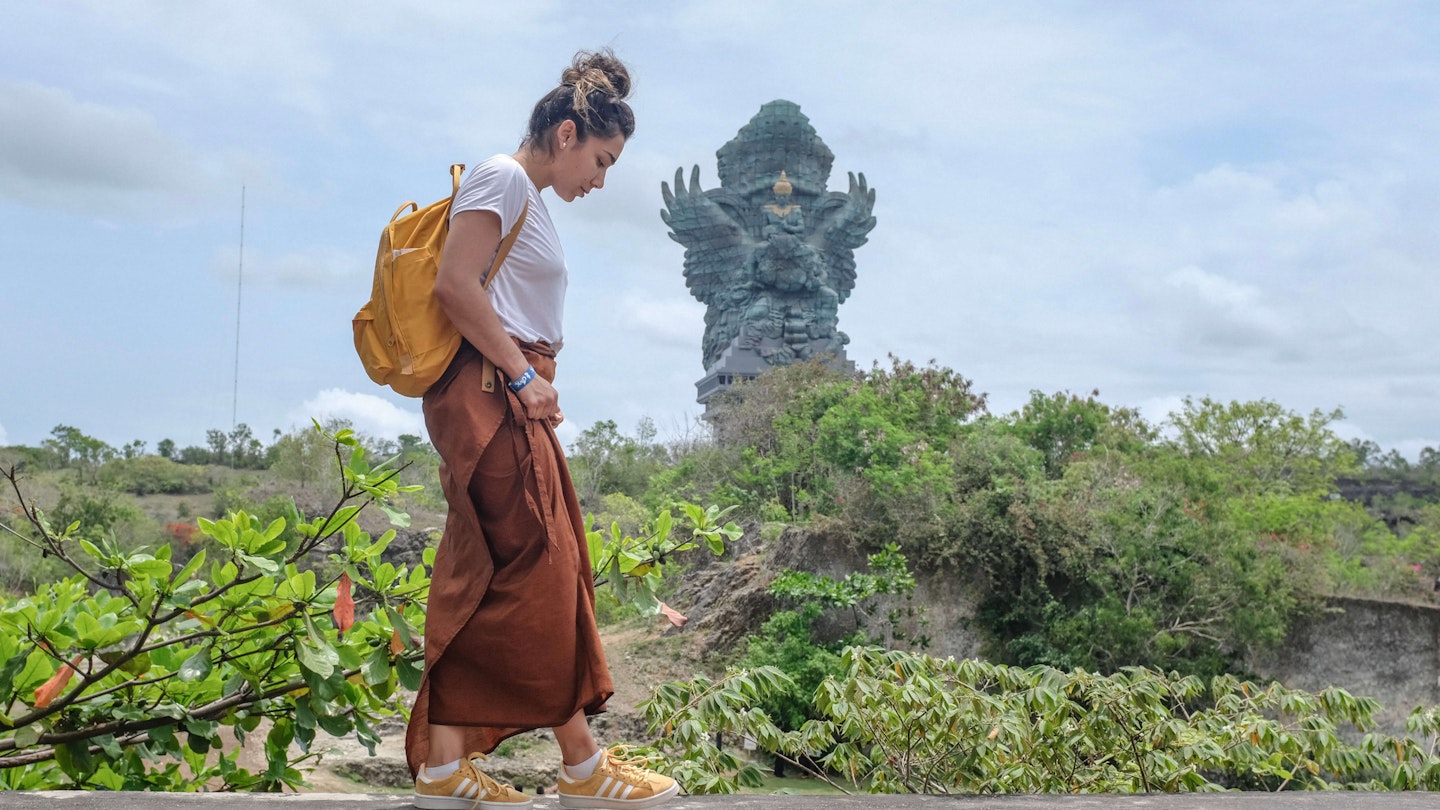
Budget for your trip to Indonesia with these top tips along with a guide to daily costs © fernanda photos / Shutterstock
With a million rupiah currently equal to around US$65, you’ll be transformed into a millionaire the moment you touch down in Indonesia .
If you choose the simple beach-bumming lifestyle, you should budget to spend around a million rupiah a week. Alternatively, live the high life with some of the most luxurious five-star hotels on the planet at low-season prices that are a fraction of the cost elsewhere.
This guide to daily costs, along with tips on saving money, can help you budget for your visit to Indonesia.
Daily costs
- Local coffee in a streetside warung (stall): $1
- Cappuccino in a fancy cafe: $2.50
- A hearty plate of fried rice/noodles: $1
- The same meal in a tourist venue: $4
- Cocktail at a happy-hour beach bar: $5
- Beer in a hotel bar: $3
- Glass of house wine at a resort: $6 (sometimes up to $25!)
- 1.5L (50oz) bottle of water: $0.25
- Surfboard rental: $3.50 per session
- 90-minute yoga class: $10 (less if you get a package price )
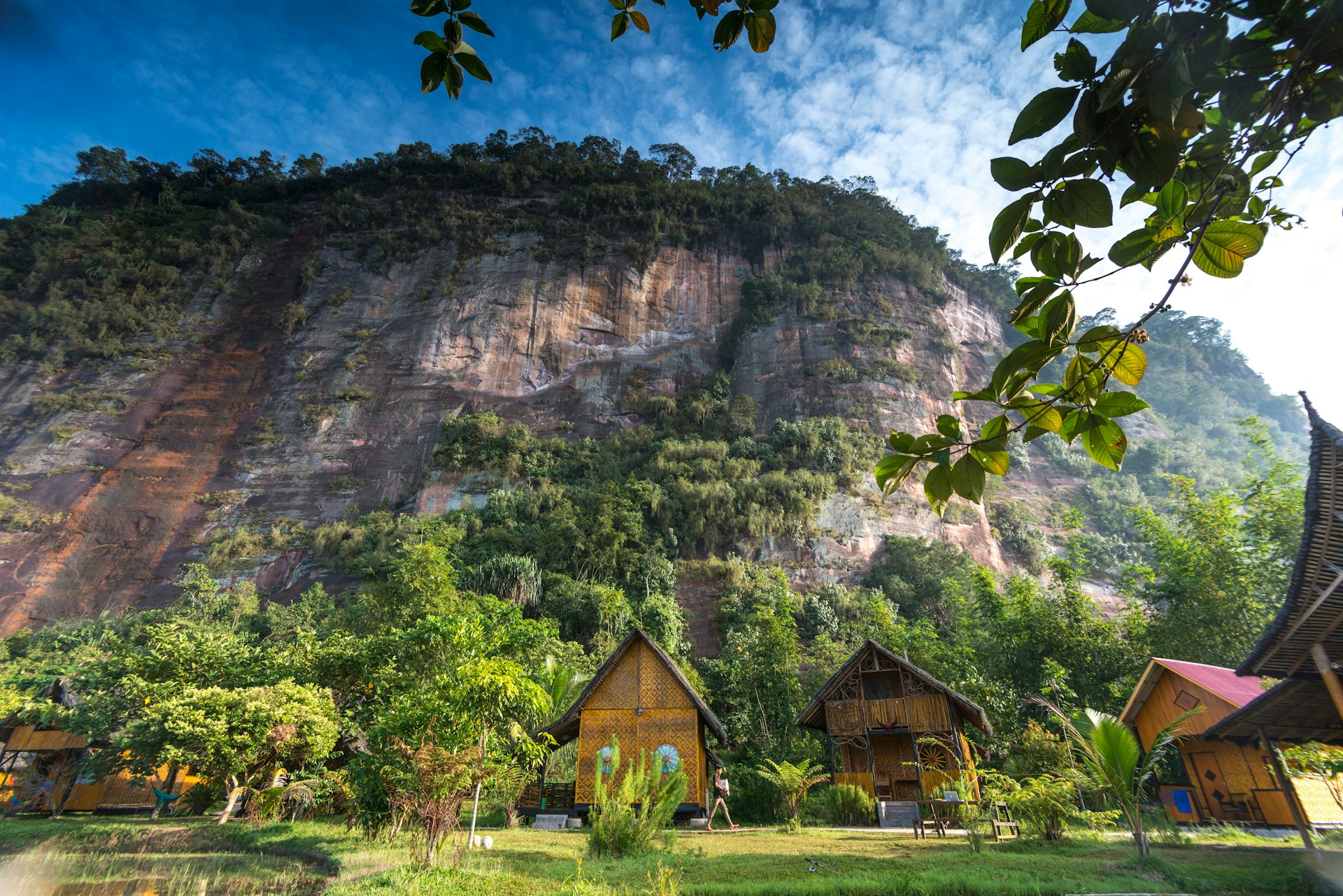
1. Take your pick from thousands of islands
Bali is substantially more expensive than neighboring Java , which is in turn slightly more expensive than Sumatra , but the sheer amount of competition vying for the tourist dollars means you can stay very cheaply. In Bali, two people could spend around $20 a day, including a private room, meals and scooter rental.
In general, as you go further to less touristed islands, the cost of living diminishes. Bear in mind, though, that at the extremes of the world’s greatest island nation – in the Alor archipelago, for example, or in the distant Maluku islands – prices are higher due to the transportation costs of getting goods (and vehicles and fuel) to remote regions.
2. Choose the cheapest time to go
October to April is rainy season in Bali and central Indonesia, and the cheapest season to travel here. Unless you are going far off the beaten track – jungle trekking or volcano climbing, for example – this is often a lovely time to be in Indonesia. The rains are usually short and sharp, and interspersed with blissful sunny days (avoid Christmas school holidays and New Year, though.)
3. Find an inexpensive flight
Sign up to Jack’s Flight Club for prompt updates about cheap flights to Jakarta or Bali. Within Indonesia, national carrier Garuda Indonesia , Air Asia or Lion Air link all the other main islands. For a rough idea of flight prices, you can travel one way between Jakarta and Bali from around $40, or from Bali to Labuan Bajo (for access to Komodo) from around $36.
4. Book the best-value accommodations
You can book in advance, of course, but if every dollar counts, consider booking just the first night or two, because the best deals – in hostel-packed Kuta , for example – are often found by asking around. With private rooms available from as low as $2 in some parts of Indonesia, dorms are rare.
It can often be more cost-effective to rent a long-term bungalow or villa through an apartment rental site than to pay for a nightly hotel room. A good air-conditioned double room in Bali will cost $8 a night (breakfast included), but a self-catering bungalow in the central Ubud area with its own garden and kitchen might cost around $6 a night if you book a full month.
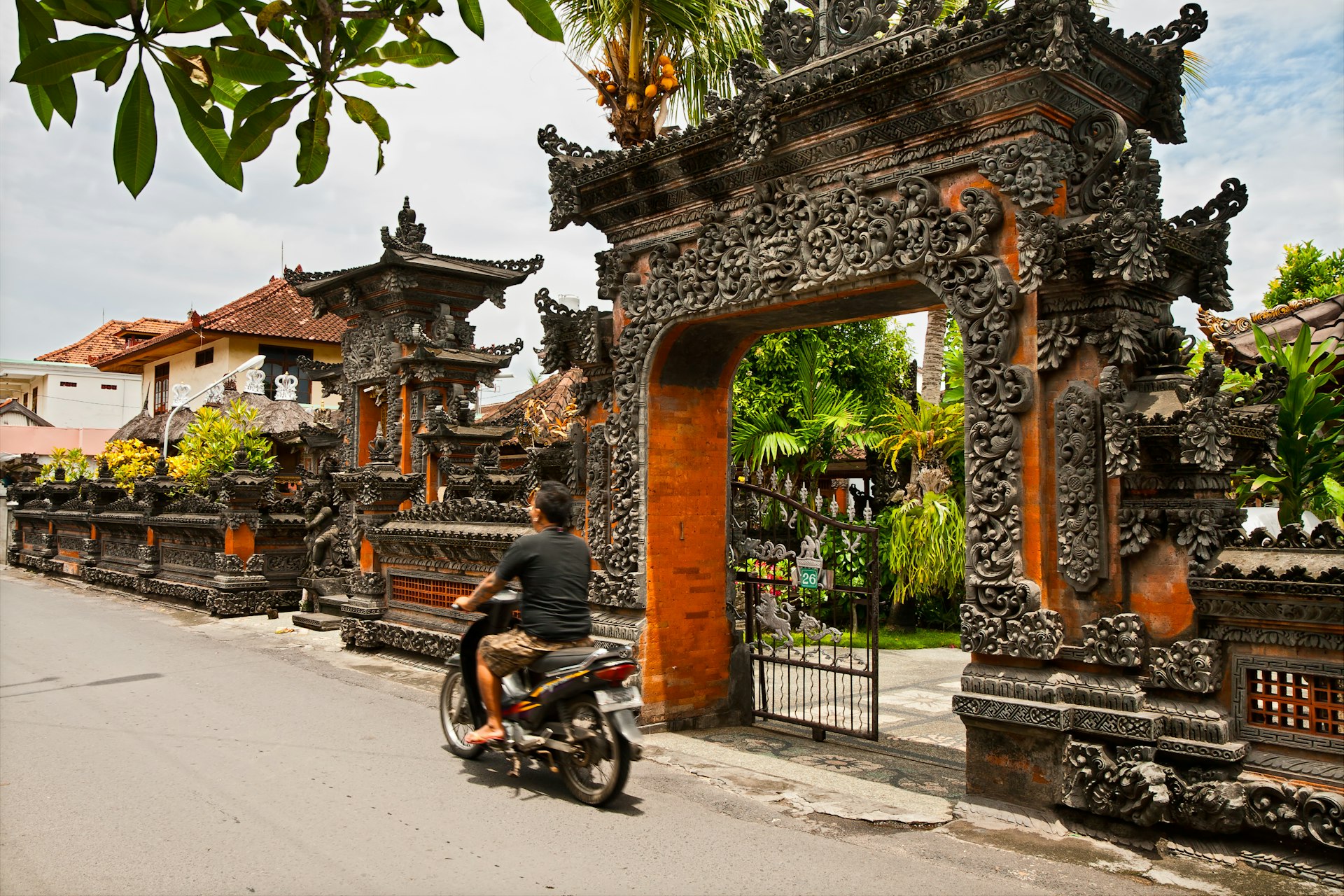
5. Car and scooter hire is inexpensive
Public transportation in Indonesia is cheap but erratic, so most travelers opt to rent a vehicle. To keep costs at a minimum, consider renting long-term. Scooters are cheap (often around $2–3 a day if you rent for a week or more), but for the sake of safety and security, consider upgrading to a car, which will set you back around $15 per day – which is especially affordable if you're traveling with friends. With petrol costing less than $0.65 per liter ($0.17 per gallon), self-driving in Indonesia is inexpensive.
Driving in Indonesia – especially in Bali with its swarms of motorbikes – is not for the fainthearted, so if you prefer not to drive yourself, you can hire a car and driver for around $30 per day.
6. Use taxicab apps for local rates
Bluebird Taxis has 23,000 vehicles throughout Indonesia, and while convenient, they can be about twice the price of Grab , the Singapore-based company that acquired Uber in Asia.
Before leaving home, download the apps for Grab and Gojek , which claims to have two million motorbike taxis across Southeast Asia. These options mean you'll only pay local rates for transport, so no haggling every time you need to take a car or motorbike taxi, and no need for complex multilingual conversations trying to confirm destinations or give directions.
7. Ferries, buses and trains are cheap but take a long time
Ferries connect some of the islands, and they're inexpensive, though erratic and time-consuming. Take the trip from Labuan Bajo to Bali, for example: the weekly ferry costs less than $20, but it's a 33-hour ride compared with an hour-long flight.
On larger islands, long-distance buses connect all the main cities, but only on Java and parts of Sumatra can you count on getting around by rail. As a general rule, you can figure that a seat on a train will cost you about $1.50 for each hour of travel, and you can book through Kareta Api Indonesia . A bus ticket is usually slightly cheaper and almost always faster than Indonesian trains.
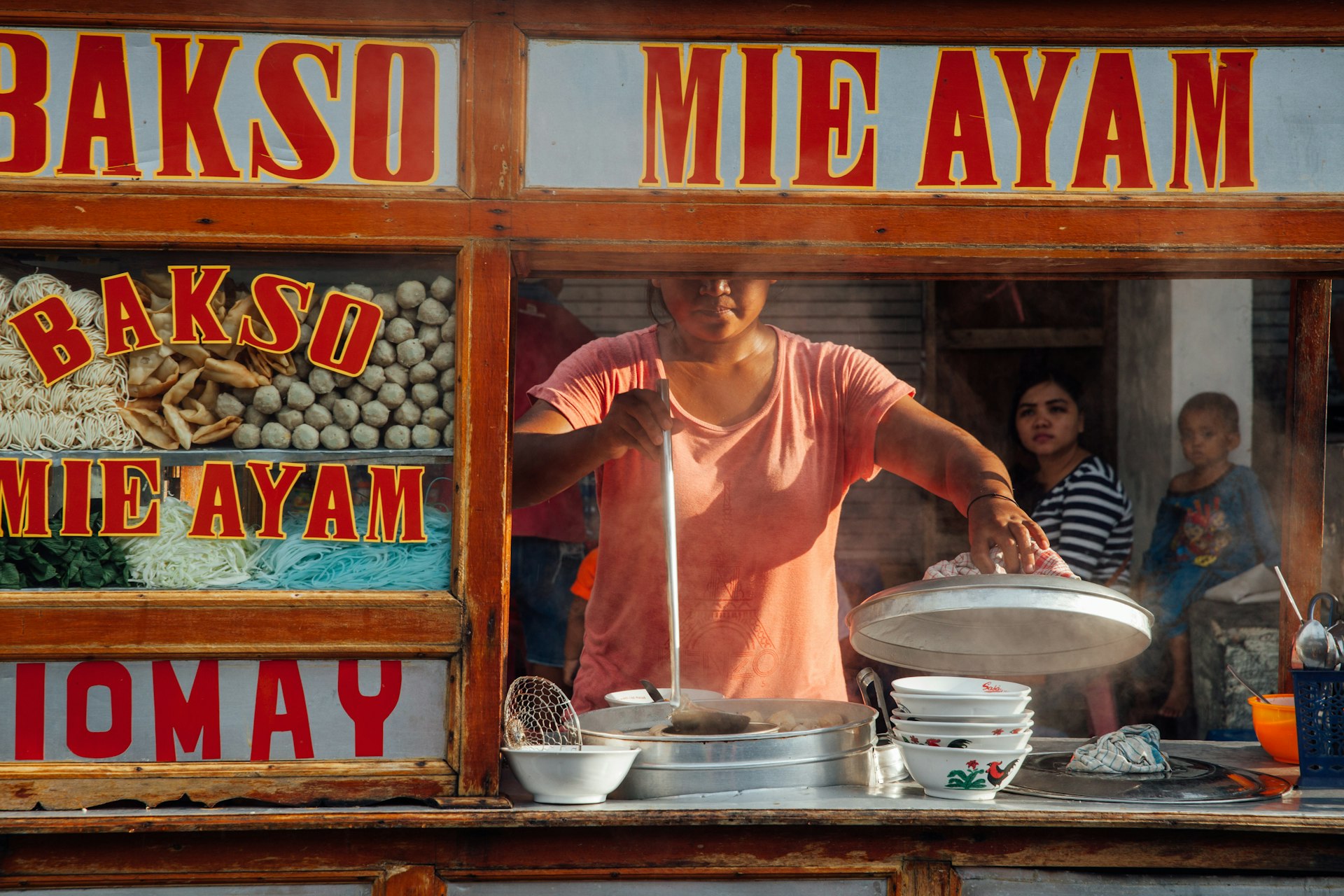
8. Eat local to eat cheap
While Indonesia lacks the culinary variety of much smaller Malaysia, Thailand, and Singapore, you can count on finding hearty local food at affordable prices. Unless you are in a tourist center, you can usually find a single-plate meal – normally nasi goreng (fried rice) or mie goreng (fried noodles) – for less than $1. Because they are cooked on the spot, ingredients are usually fresh and frequently delicious.
The West Sumatran city of Padang has exported its fine gastronomic traditions, and you will find Masakan Padang (literally Padang-style cooking) eateries – typically a buffet where you're given a plate of rice and simply point to whatever extras you fancy – in virtually every town throughout the country. You can often grab a veritable feast for around $2; try to pick establishments that seem to have a constant turnaround of diners.
9. Stay off the booze
The best way to keep costs low in Indonesia is simply to avoid alcohol. A bottle of Bintang, the standard local beer, is about $2, a bottle of "cheap" wine starts at around $10, and a bottle of imported gin or whisky will likely set you back $30 or more. Those are supermarket prices – the figures will likely triple in a trendy bar. If you want to party without breaking the bank, look out for the ubiquitous two-for-one sundowner happy-hour deals.
10. Haggling is part of the culture
Haggling is a way of life in Indonesia, and outside of big, fixed-price malls and supermarkets, you will be expected to haggle for most things. Although many travelers are uncomfortable about bargaining for purchases, you’ll soon find that a smile, a joke and a couple of reliable stock phrases can transform a boring shopping trip into an opportunity to bond with local people. At its best, haggling turns a mere business transaction into something far more human.
"Bukan harga bule" (not foreigner price) is good for a smile.
"Saya sudah bankrupt" (I’m already bankrupt) guarantees outright belly laughs.
Remember, though, that your haggling should only be driven toward establishing a fair price that is good for both parties. Some travelers pride themselves on their tough haggling skills, believing that a street vendor will always be making a profit regardless. This is not always true: most store-holders will prefer to sell at a loss if it is the only way that they can feed their family that night.
This article was first published Mar 30, 2022 and updated Dec 2, 2023.
Explore related stories
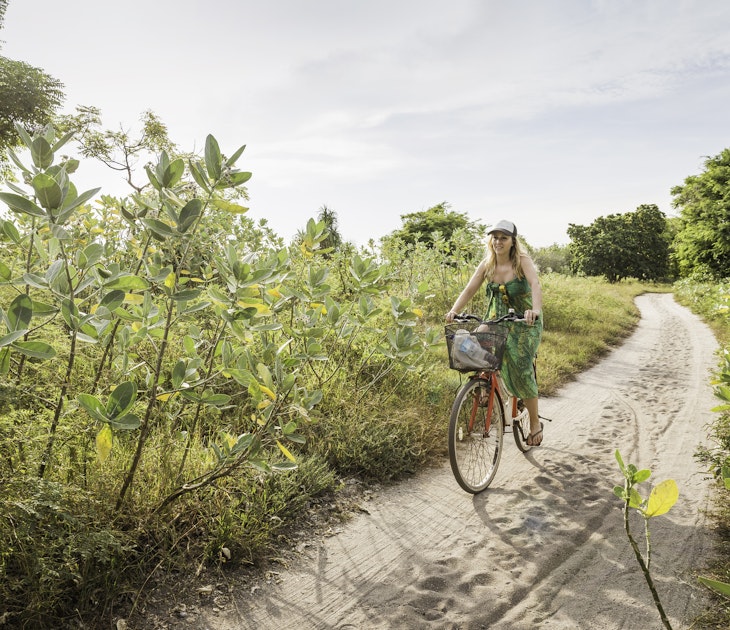
Budget Travel
Apr 21, 2024 • 6 min read
You can get a lot of bang for your buck on these three tiny islands off the west coast of Lombok – if you know where to look.

Jan 17, 2024 • 6 min read

Oct 20, 2023 • 13 min read

Jan 29, 2020 • 9 min read

Oct 28, 2019 • 19 min read

Apr 29, 2024 • 6 min read

Apr 22, 2024 • 6 min read

Apr 20, 2024 • 5 min read

Apr 18, 2024 • 5 min read

IMAGES
VIDEO
COMMENTS
That is why our researchers carefully go over every category to see what different trip aspects will cost. A week in Africa costs around $2,500 for two people: Average Accommodation Cost: $100 per night. Average Flight Cost: $100 per person. Food, Drink & Activities: $100 per person, per day. Transportation: $150 per week.
The most expensive countries for travel in Africa are currently Zambia ($945.11), Seychelles ($201.80), Senegal ($153.15), Cape Verde ($140.71), and Swaziland ($131.32). Africa is a vast and highly diverse continent full of fascinating cultures, dramatic scenery and extraordinary animals. It offers some of the most amazing travel experiences in ...
Mid-range options are more limited in selection, high in price, and often lower in comfort and style. Budget options may be cheap, but are often very low in quality. In some places they are also almost nonexistent. Again, the budget will vary dramatically from country to country, as does the travel infrastructure.
The average cost of a 2-week trip to Africa per person is between $5000-$7500, including your round trip airfares. $560-$2035 will cover accommodation, $350-$1000 for both local and intercity transportation, and $560 for food. It also includes $2407 for Safaris and tours, $60-$100 for visa fees, $500 for vaccinations, and $590 for excursions ...
Before diving into specific cost breakdowns, it is important to understand the factors that can influence your overall expenses while traveling around Africa. 1. Duration of Travel. The length of your trip plays a significant role in determining your expenses. Keep in mind that the longer you stay, the more you are likely to spend on ...
Car rentals from South Africa can be found for as cheap as $35-55 USD per day, especially if you book online. For the best deals on rental cars, use Discover Cars. If you are planning on long-term travel in Africa, you may even consider buying your own 4WD to tour the continent in. South Africa would be the best place to find a vehicle to purchase.
Unveiling the African Adventure: A Comprehensive Guide to Travel Costs 21/07/2023 Hikaru Travel Africa, the cradle of civilization and a wildlife wonderland, beckons the intrepid traveler with its diverse landscapes, rich cultures, and unrivaled adventures.
How to travel in Africa. Most transportation in Africa is road-based. Travel within African cities gives you the choice of motorbike taxis, private taxis, shared taxis, trams, buses, minibuses, light rail and hop-on hop-off sightseeing buses. The more organised forms with set routes, such as trams, are easiest to use.
Travel costs also vary from country to country, and you can spend as little or as much as you desire on an African safari. The cheapest safaris will generally cost around USD 150 per day, including your transport, basic accommodation and meals, while luxurious safaris can cost upwards of thousands of USD per day, for glamorous lodges and VIP ...
Visas for Africa. Most countries in Africa require visitors to obtain a visa before entering - and an expensive one at that. The visa fee for Mozambique and Tanzania is $50 ($100 for Americans), $75 for a Malawian visa, and for Zambia, it is a whopping $80 fee for a double entry for Americans. If you are going to just one country, a one-time ...
Vaccinations & Visas:$520 USD. The cost of this probably differs based off your health insurance, and which country you live in. However, this is how much it cost me to get all the vaccinations ($343) I needed to travel to East Africa, my visitor visa ($150), and medication like malaria meds and emergency antibiotics ($25).
Think about preserving your memories, whether that means investing in a quality camera or buying a scrapbook and a spare set of pens. One essential purchase is a first aid kit, complete with any personal medications as well as all items you'll need to treat minor injuries. Continue to 9 of 10 below. 09 of 10.
Find out what to expect on your first visit to Africa, from popular tourist scams to health and safety concerns. ... and agent raised in Malawi and Kenya with more than 15 years of experience working in the African travel industry. TripSavvy's editorial guidelines. Updated on 06/26/19 ... and often much wealthier than most people you see around ...
Prices range from $10 - $20 for a dorm bed in cheaper East African destinations, such as Zambia, Zimbabwe, and Zanzibar in Tanzania. You can expect to pay around $20- $80 for a private room ...
Take Advantage of the East Africa Visa- This visa allows you to travel between Kenya, Uganda, and Rwanda for up to 90 days. The cost is $100. This saves you a minimum of 30 dollars and a bit of hassle. If you buy each visa separately, you'll spend $50 for Kenya, $50 for Uganda, and $30 for Rwanda.
A 3-day/2-night safari usually costs around R6200.00 ($400) and includes accommodation, safari drives, guides, entrance fees and food. Read More: How to Travel Kenya on a Budget. How Much Does a Trip to Kenya Cost? Dorm bed: From R250.00 ($16) per person per night; Budget double room or apartment: From R350.00 ($22) Three cheap meals: R260.00 ...
Download Article. Hop on a tuk-tuk or a bus for the cheapest way to see a city. In addition to walking or biking, you could hire a 3-wheeled motorized taxi called a tuk-tuk. Larger cities like Nairobi, Johannesburg, and Durban all have an inexpensive bus system, too. [3] If you're traveling in Kenya, look for matutus.
Step 12. Check Your Passport and Apply for Visas. Passports. To travel to most Africa countries, you will need your passport to be valid for 6 months from the date you enter the country (I usually make sure it's longer to be on the safe side) and in some countries, like Togo, you need a year left.
Budget around $100USD per day per person for transport, accommodation and food. Safaris and adventure activities bump up the cost substantially, so you'll need to allocate more for those. There are 54 currencies in Africa, so things can get tricky if you're travelling to multiple countries. Here are a few tips to handle it all:
The most popular Baz Bus option is the unlimited one-way hop-on/hop-off pass. It costs 3,700 ZAR and covers the 750 kilometer distance between Port Elizabeth and Cape Town. You have no time limit and have unlimited travel in one direction, allowing you to have as many stops as you want. A return pass costs 4,800 ZAR.
Kenya: $50 (however you can get the East Africa visa for $100 which allows you to travel freely between Kenya, Uganda & Rwanda for 3 months - as long as you don't leave those countries). Uganda: $50 (as above). Rwanda: $30 (as above). Tanzania: $50 (for most people) & $100 for US citizens. Malawi: $75.
Why Traveling Around Africa Is Difficult for Africans. 3mo. ... (there is a luxury train network between Tanzania and South Africa that costs $19,000), while in most other regions of the continent ...
Multiple reports estimate that the cost of hiring a Boeing business jet like the one Ruto used in his visit to the US oscillates around $18,000 per hour, roughly Sh2,358,0000.
WASHINGTON, May 21, 2024 — In 2023, carbon pricing revenues reached a record $104 billion, according to the World Bank's annual "State and Trends of Carbon Pricing 2024" report released today. There are now 75 carbon pricing instruments in operation worldwide. Over half of the collected revenue was used to fund climate and nature ...
Norfolk Southern will pay $15 million fine as part of federal settlement over Ohio derailment. FILE - Debris from a Norfolk Southern freight train lies scattered and burning along the tracks on Feb. 4, 2023, the day after it derailed in East Palestine, Ohio. A federal judge has signed off Tuesday, May 21, 2024, on the $600 million class action ...
Daily costs. Local coffee in a streetside warung (stall): $1. Cappuccino in a fancy cafe: $2.50. A hearty plate of fried rice/noodles: $1. The same meal in a tourist venue: $4. Cocktail at a happy-hour beach bar: $5. Beer in a hotel bar: $3. Glass of house wine at a resort: $6 (sometimes up to $25!)
China's military drills around Taiwan are designed to test its ability to "seize power" over the island, the People's Liberation Army said Friday as its forces kicked off a second day of ...